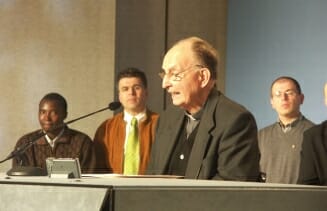
Aug 29, 2015 | Non categorizzato
 Pasquale Foresi commented many times on the theology of the charism of Chiara Lubich, underscoring its novelty for both living and thinking. Between 1990 and 1998 he was often called upon to answer questions that were posed by members of the Movement from a variety of vocational, cultural and geographical backgrounds. On one of these occasions he was asked for advice on how to live humility[1]. “Being humble simply means accepting to be who you are,” he said. “And all of us are sinners. If anyone says ‘I’m not a sinner,’ he lies; so all of us can have humility all the time. Saint Benedict’s outline seems quite wise to me and has always helped me to live. It could be summarised as follows: The first step for being humble is to accept humiliations, mortifications. . . One day, someone speaks badly of you at the office, in your workplace; there might be a misunderstanding between you and someone else, or even a calumny. . . You need to be able accept these tribulations and difficulties. The second step is to love humiliations, which is more than accepting them. This is the case, for example, when we have given our life for others and judgement and accusation begin to arise amongst the people for whom we have done much. These criticisms can have a basis in reality but are exaggerated. It is difficult to love such humiliations, but they’re beneficial for growing in the life of God. The third step is to prefer humiliations not only loving them, but being happy over them. As when someone speaks badly of you and you say: ‘This is a grace from God that I am receiving. . .” This is the highest grade which all of us should tend towards, because it returns us to that humility which draws us together. Obviously, the calumnies should always be clarified but with detachment, living the Gospel that says “Blessed are you when, lying, they will utter every sort of evil against you because of me. Rejoice and be glad because your reward is great in Heaven.” [1] Foresi, Pasquale. COLLOQUI, domande e risposte sulla spiritualità dell’unità, (Rome: Città Nuova Publishing House, 2009) p. 64.
Pasquale Foresi commented many times on the theology of the charism of Chiara Lubich, underscoring its novelty for both living and thinking. Between 1990 and 1998 he was often called upon to answer questions that were posed by members of the Movement from a variety of vocational, cultural and geographical backgrounds. On one of these occasions he was asked for advice on how to live humility[1]. “Being humble simply means accepting to be who you are,” he said. “And all of us are sinners. If anyone says ‘I’m not a sinner,’ he lies; so all of us can have humility all the time. Saint Benedict’s outline seems quite wise to me and has always helped me to live. It could be summarised as follows: The first step for being humble is to accept humiliations, mortifications. . . One day, someone speaks badly of you at the office, in your workplace; there might be a misunderstanding between you and someone else, or even a calumny. . . You need to be able accept these tribulations and difficulties. The second step is to love humiliations, which is more than accepting them. This is the case, for example, when we have given our life for others and judgement and accusation begin to arise amongst the people for whom we have done much. These criticisms can have a basis in reality but are exaggerated. It is difficult to love such humiliations, but they’re beneficial for growing in the life of God. The third step is to prefer humiliations not only loving them, but being happy over them. As when someone speaks badly of you and you say: ‘This is a grace from God that I am receiving. . .” This is the highest grade which all of us should tend towards, because it returns us to that humility which draws us together. Obviously, the calumnies should always be clarified but with detachment, living the Gospel that says “Blessed are you when, lying, they will utter every sort of evil against you because of me. Rejoice and be glad because your reward is great in Heaven.” [1] Foresi, Pasquale. COLLOQUI, domande e risposte sulla spiritualità dell’unità, (Rome: Città Nuova Publishing House, 2009) p. 64.
Aug 28, 2015 | Non categorizzato
This year, the annual general meeting will be held over a period of 2 weeks. The zone delegates, who will be representing 36 geographic areas and 6 Focolare little towns, will be taking stock of the life of the Movement in the different parts of the world and will be establishing guidelines to meet the challenges of the coming year.
Aug 28, 2015 | Non categorizzato, Word of
Listen to the Word of Life
If we all truly loved our neighbour as ourselves, wars would cease, corruption would disappear, universal brotherhood wouldn’t be a utopia, and the civilization of love would soon become a reality. Here is one of those words of the Gospel that demand to be put into action immediately, this very instant. It is so utterly clear, and demanding, that it does not need a huge amount of comment. To see the power it contains, it may be useful, all the same, to look at it in its context. Jesus is replying to the question of one of the scribes (one of the students of the Bible) who had asked him which was the greatest commandment. It was an open question, especially as 613 precepts to be followed had been identified. One of the great teachers who had lived a few years before, Rabbi Shammai, had refused to say what he thought was the chief commandment. Others instead, as Jesus also did, focused on the central place of love. Rabbi Hillel, for example, affirmed: ‘Do not do to your neighbour anything that is hateful to yourself: this is the whole of the Law. The rest is commentary.’[1] Jesus is not the only one to take up the teaching about the central place of love, but he put together, as a single commandment, the love of God (see Dt 6:4) and the love of neighbour (see Lev 19:18). The reply he gives to the scribe who is questioning him is in fact: ‘The first [commandment] is, “Hear, O Israel: the Lord our God, the Lord is one; you shall love the Lord your God with all your heart, and with all your soul, and with all your mind, and with all your strength.” The second is this, “You shall love your neighbour as yourself.” There is no other commandment greater than these.’ ‘You shall love your neighbour as yourself’ The second part of the single commandment is the expression of the first, love for God. Every one of God’s creatures is so close to his heart that to give him glory, to show him in action the love we have for him, there is no other way than to be the expression of his love for all. As parents are happy when they see their children getting on with each other, helping each other, staying united, so also God – who for us is like a father and a mother – is happy when he sees we love our neighbour as ourselves, and so contribute to bringing about the unity of the human family. For centuries Prophets had already been explaining to the People of Israel that God wants love and not sacrifices and holocausts (see Hosea 6:6). Jesus himself recalled their teaching when he said: ‘Go and learn what this means, “I desire mercy, not sacrifice.” For I have come to call not the righteous but sinners’ (Mt 9:13). How indeed can we love God who we cannot see, if we don’t love our brother or sister (see 1 Jn 4:20)? We love them, we serve them, we honour them to the measure that we love, serve, honour every person, both the friend and the unknown, from our own or from another people, above all the ‘small’, those most in need. This is the invitation to the Christian in today’s world: to translate worship into life, to go forth from the churches, where we adore, love, praise God, so that we go to meet others, in such a way as to practise what we have just learnt in prayer and communion with God. ‘You shall love your neighbour as yourself’ How then can we live this command of the Lord’s? Let’s remind ourselves that it is part of an inseparable pair that includes love for God. We have to give ourselves time to get to know what love is and how we can love, and so we need to give space to moments of prayer, of ‘contemplation’, of dialogue with him. We learn love from God, who is Love. We don’t steal any time from our neighbour when we stay with God, indeed we prepare ourselves to love in a way that is increasingly generous and appropriate. At the same time, when we come back to God having loved other people, our prayer is more genuine, more true, and is filled with all the persons we have met, who we bring back to him. To love our neighbours as ourselves we need, then, to get to know them as they know themselves. We ought to reach the point of loving as the other wants to be loved and not as we would like to love. Now that our societies are becoming always more multicultural, with the presence of people from a huge variety of backgrounds, the challenge is even greater. Someone who goes to a new country has to learn its traditions and values; only in this way can they understand and love the people who live there. The same thing is true for those who receive new immigrants, who are often bewildered, struggling with a new language, and finding it difficult to fit in. Differences are present within the same family, in the workplace or in the locality, even when they are made up of persons who belong to the same culture. Would we like to find someone who’s ready to set aside time to listen to us, to help us revise for an exam, to find a job, to tidy our house? Perhaps the other person has similar needs. We have to know how to intuit them, being attentive to the other, adopting a sincere attitude of listening, putting ourselves in the other’s shoes. The quality of our love also matters. The apostle Paul, in his celebrated hymn to charity, lists some of its characteristics, which it could be useful to remember: it is patient, kind, not envious, not boastful or arrogant, does not insist on its own way, is not irritable, keeps no score of wrongs, but bears all things, believes all things, hopes all things, endures all things (see 1 Cor 13:4-7). How many chances and how many nuances there are to living: ‘You shall love your neighbour as yourself’! In conclusion we can recall that this principal for human existence is at the basis of the well-known ‘golden rule’ that we find in all religions and in all the great teachers of ‘secular’ culture. We could try to find, at the origins of our own cultural tradition or religious belief, similar invitations to love our neighbour and then help one another to live them together: Hindus and Muslims, Buddhists and followers of traditional religions, Christians and men and women of good will. We have to work together to create a new mentality that gives value to the other, that instils and encourages respect for the person, that cares and protects minorities, that is attentive to the weakest, that sets aside one’s own interests to put those of the other into the first place. If we were all truly aware of having to love our neighbour as ourselves, to the point of not doing to the other what we do not wish to be done to us and that we should do to the other what we wish the other would do for us, wars would cease, corruption would disappear, universal fraternity would be no utopia and the civilization of love would soon become a reality. Fabio Ciardi [1] Babylonian Talmud, Shabbath Folio 31a.
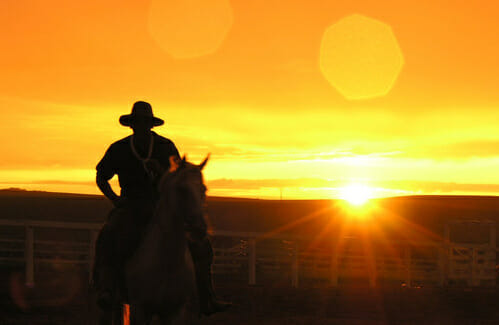
Aug 28, 2015 | Focolare Worldwide
 Every day around the world thousands of people stand up for an integral economy. Aldo Calliera is the owner of El Alba, a company inserted within the Economy of Communion, involved in the raising of livestock in Santiago, North Argentina. Work begins early for this country folk, even before the break of dawn. Before the day begins mate is prepared, a typical South American beverage that is meant to be sipped through a silver straw by a group of friends. With each new round, stories are shared and bodies warmed. The owner did not wish to lose this age old tradition of his guachos, and he began to attend the early morning materas, but he was surprised that with his arrival the conversation languished and silence fell on the assembly. It was the same every day. Guachos are reared in a culture where everyone falls silent when the boss arrives, not because of disappointment but because from the times of the Conquest the worker has been considered inferior to the master. Thus, Calliera went away each day feeling that he had been given a punch in the stomach, and his heart shrank at the thought at not having been able to penetrate the wall. Gradually his insistence enabled hearts to open and names be shared, all but one: Ernesto’s. One day, Calliera was programming “the service,” which is the time and location coupling for the production of calves. After the planning session the engineer who was with him, was about to issue orders to the workers, but Calliera stepped in saying: “Leave it to me, to talk to my men.” Then he explained to the workers what had to be done and, instead of simply giving them orders, he asked them for their opinion. Ernesto, whose voice the owner barely knew, spoke up for the first time: “I think that we won’t have any calves next year.” Calliera was doubly surprised and asked why. The answer was simple: there was not enough water for all the animals at the place where he had planned to take them for mating. It might seem that anyone could have said it, but in this culture it is customary to respond “Yes, sir” to one’s boss, even when you disagree. Callieri relects: “Then I realised that it is only by having an optimistic vision of others that you can draw out the best in them. Only in this way is it possible to find treasures in others that otherwise remain hidden, and to discover the best way to draw them out. Each person’s talents are like virtues that you discover when there is mutual trust.” Needless to say, the Callieri heard Ernesto’s advice and changed the “service” and things went better. . . The matera had produced a small cultural change that helped everyone to build relationships based on reciprocity that neither workers, nor forefathers would ever have immagined. Source: EoC online
Every day around the world thousands of people stand up for an integral economy. Aldo Calliera is the owner of El Alba, a company inserted within the Economy of Communion, involved in the raising of livestock in Santiago, North Argentina. Work begins early for this country folk, even before the break of dawn. Before the day begins mate is prepared, a typical South American beverage that is meant to be sipped through a silver straw by a group of friends. With each new round, stories are shared and bodies warmed. The owner did not wish to lose this age old tradition of his guachos, and he began to attend the early morning materas, but he was surprised that with his arrival the conversation languished and silence fell on the assembly. It was the same every day. Guachos are reared in a culture where everyone falls silent when the boss arrives, not because of disappointment but because from the times of the Conquest the worker has been considered inferior to the master. Thus, Calliera went away each day feeling that he had been given a punch in the stomach, and his heart shrank at the thought at not having been able to penetrate the wall. Gradually his insistence enabled hearts to open and names be shared, all but one: Ernesto’s. One day, Calliera was programming “the service,” which is the time and location coupling for the production of calves. After the planning session the engineer who was with him, was about to issue orders to the workers, but Calliera stepped in saying: “Leave it to me, to talk to my men.” Then he explained to the workers what had to be done and, instead of simply giving them orders, he asked them for their opinion. Ernesto, whose voice the owner barely knew, spoke up for the first time: “I think that we won’t have any calves next year.” Calliera was doubly surprised and asked why. The answer was simple: there was not enough water for all the animals at the place where he had planned to take them for mating. It might seem that anyone could have said it, but in this culture it is customary to respond “Yes, sir” to one’s boss, even when you disagree. Callieri relects: “Then I realised that it is only by having an optimistic vision of others that you can draw out the best in them. Only in this way is it possible to find treasures in others that otherwise remain hidden, and to discover the best way to draw them out. Each person’s talents are like virtues that you discover when there is mutual trust.” Needless to say, the Callieri heard Ernesto’s advice and changed the “service” and things went better. . . The matera had produced a small cultural change that helped everyone to build relationships based on reciprocity that neither workers, nor forefathers would ever have immagined. Source: EoC online
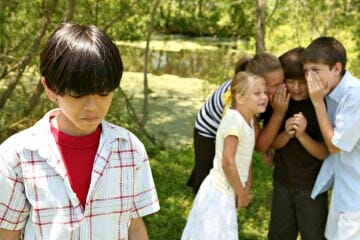
Aug 27, 2015 | Focolare Worldwide, Senza categoria
An illness  My husband has been ill for two years now because of a brain tumour. At times he complains because objects fall from his hands. I made an agreement with my daughters to never make him feel that something strange has happened. Many times, upon discreetly observing how they treat their father with care, and aware of the sacrifices and many renunciations they undertake to help the family, I see that they are more mature for their age. We are undergoing as a family, a period we have never experienced before. Despite the inexpressible suffering weighing on us, we feel a great serenity. (B.S. – Poland) The old man There was no more food in the house. I took a bag of cornmeal and 1,000 francs: half for transportation and the other half for the mill. I hailed the first taxi that came by. Beside the taxi driver, an old man was profoundly asleep. I noticed that the taxi driver was trying to slip the man’s wallet from his bag, so when I arrived at my destination I said: «This is my father, and he has to get off with me.» The driver continued to say that this was not where the man wanted to go, but due to my insistence, said he would let the man get off for 1,000 francs. I gave it to him immediately, and taking the bag, I helped the old man, still asleep, get off. Over here it occurs often that taxi drivers drug people in order to rob them. The old man awoke when I poured water over his head. He looked for his bag and checked if all his money was there. He said to me: “You saved my life”, and gave me 5,000 francs. I looked for a taxi driver I trusted who accompanied him safe and sound to his village. (M.A. – Cameroon)
My husband has been ill for two years now because of a brain tumour. At times he complains because objects fall from his hands. I made an agreement with my daughters to never make him feel that something strange has happened. Many times, upon discreetly observing how they treat their father with care, and aware of the sacrifices and many renunciations they undertake to help the family, I see that they are more mature for their age. We are undergoing as a family, a period we have never experienced before. Despite the inexpressible suffering weighing on us, we feel a great serenity. (B.S. – Poland) The old man There was no more food in the house. I took a bag of cornmeal and 1,000 francs: half for transportation and the other half for the mill. I hailed the first taxi that came by. Beside the taxi driver, an old man was profoundly asleep. I noticed that the taxi driver was trying to slip the man’s wallet from his bag, so when I arrived at my destination I said: «This is my father, and he has to get off with me.» The driver continued to say that this was not where the man wanted to go, but due to my insistence, said he would let the man get off for 1,000 francs. I gave it to him immediately, and taking the bag, I helped the old man, still asleep, get off. Over here it occurs often that taxi drivers drug people in order to rob them. The old man awoke when I poured water over his head. He looked for his bag and checked if all his money was there. He said to me: “You saved my life”, and gave me 5,000 francs. I looked for a taxi driver I trusted who accompanied him safe and sound to his village. (M.A. – Cameroon)  Trendy pants My classmates made fun of me because I didn’t have trendy clothes. I have a big family and we live in the countryside. One day I helped a classmate who was having a hard time with math and we became friends. Another day the others started to joke about my pants and he defended me. From that time on, all this stopped. We need to be at least two to be able to fight wrong ideas. In a short time we all became friends, and when they had to choose the class leader, they chose me. (E.C. – Italy) The beggar In my community we pray daily to God to bless our food, and help us to share it with those in need. At lunch time the usual beggar knocked on the door and we had nothing but cornmeal porridge for lunch and dinner. We did not have any money either, so I told the beggar that we did not have anything. When I sat down for lunch, I had no appetite. After a while, a phrase came to my mind, “Give and you will be given.” So I gathered what we had and gave it to the beggar who was still waiting. Not long after that, someone knocked on the door. A girl was there holding a big plate of cornmeal porridge saying: «This is from mama». It’s incredible how God is so punctual. (Sister Madeleine – Burkina Faso)
Trendy pants My classmates made fun of me because I didn’t have trendy clothes. I have a big family and we live in the countryside. One day I helped a classmate who was having a hard time with math and we became friends. Another day the others started to joke about my pants and he defended me. From that time on, all this stopped. We need to be at least two to be able to fight wrong ideas. In a short time we all became friends, and when they had to choose the class leader, they chose me. (E.C. – Italy) The beggar In my community we pray daily to God to bless our food, and help us to share it with those in need. At lunch time the usual beggar knocked on the door and we had nothing but cornmeal porridge for lunch and dinner. We did not have any money either, so I told the beggar that we did not have anything. When I sat down for lunch, I had no appetite. After a while, a phrase came to my mind, “Give and you will be given.” So I gathered what we had and gave it to the beggar who was still waiting. Not long after that, someone knocked on the door. A girl was there holding a big plate of cornmeal porridge saying: «This is from mama». It’s incredible how God is so punctual. (Sister Madeleine – Burkina Faso)
![Religions for Peace – Europe]()
Aug 26, 2015 | Non categorizzato
 Interfaith encounter as a Peace Building Process European Assembly – Castel Gandolfo 28 Oct. – 1st Nov.. 2015 Organized in conjunction with the Focolare Movement Program
Interfaith encounter as a Peace Building Process European Assembly – Castel Gandolfo 28 Oct. – 1st Nov.. 2015 Organized in conjunction with the Focolare Movement Program
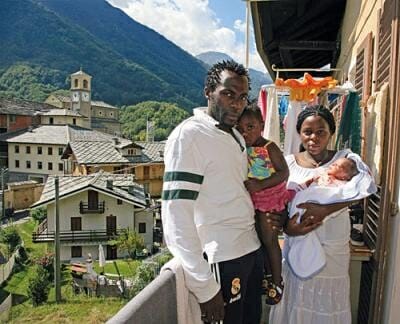
Aug 26, 2015 | Focolare Worldwide
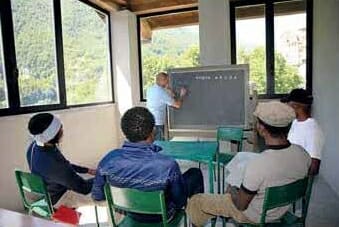 Five years ago, the town was classified as having one of the lowest socio-economic communities in the Piemonte region. But the entire community learned about hospitality towards others and today, 30 refugees, almost all Africans, besides a family from Kosovo with three children, have been living for eight months now, in a housing unit owned by the Cottolengo Institute. “We have adopted them,” confided two eighty year olds sitting in the town square. They had done so during the war, specified the President of the “Pro Loco” organisation, with the Jews and the members of the Italian resistance movement. History repeats itself. The mayor, Lisa Giacomo did not have to convince himself and the 180 residents of the village. Out of these, only 90 live in Lemie all year round. It had already happened in 2011, when the problem of hosting the migrants and refugees arriving on the Italian coasts with rusty boats still was not such a burning issue. Already then, for Lemie, that arrival of ‘friends’ had symbolized the rebirth of the community The 12 children taken care of by educators and the parish priest were baptised in the parish Church during a ceremony which went down in the history of the town. It was a feast. All the families with the children were welcomed by families and other children of those alpine valleys.
Five years ago, the town was classified as having one of the lowest socio-economic communities in the Piemonte region. But the entire community learned about hospitality towards others and today, 30 refugees, almost all Africans, besides a family from Kosovo with three children, have been living for eight months now, in a housing unit owned by the Cottolengo Institute. “We have adopted them,” confided two eighty year olds sitting in the town square. They had done so during the war, specified the President of the “Pro Loco” organisation, with the Jews and the members of the Italian resistance movement. History repeats itself. The mayor, Lisa Giacomo did not have to convince himself and the 180 residents of the village. Out of these, only 90 live in Lemie all year round. It had already happened in 2011, when the problem of hosting the migrants and refugees arriving on the Italian coasts with rusty boats still was not such a burning issue. Already then, for Lemie, that arrival of ‘friends’ had symbolized the rebirth of the community The 12 children taken care of by educators and the parish priest were baptised in the parish Church during a ceremony which went down in the history of the town. It was a feast. All the families with the children were welcomed by families and other children of those alpine valleys.  “Of course, at the start we were a bit surprised,” Lisa explained, “the population here has a a very high age bracket average, and it’s not easy to open oneself to others. Or at least, this was not the case. I didn’t have to give a lot of explanations since no one asked any questions. Giving hospitality seemed but a natural thing .” And the situation today is still the same as in 2011. And as in the past, the men and woman that arrived from Libya and other sub-Saharian countries will have to work, and make themselves useful. “With the Province of Turin in 2011 we had also implemented some job offers. Now some are applying for ‘restitution volunteer work’ which is useful to them and also to us.” the mayor remarked. And not only do these ‘refugee friends’ wish to stay in Italy, but the community itself is asking them to stay. “The citizens immediately accepted them, but what’s more, welcomed them,” confirmed Lisa, “and a couple of residents found jobs as educators with an association related to a cooperative. Problems? “Only bureaucratic ones. They applied for protection as refugees, but the time frames are very long.” Then the transportation issues: “I will ask the agencies managing the coaches for Turin to help them, since I think it would useless to make them pay the bus tickets for Turin.” On asking the mayor if the village has been reborn due to the migrants, he smiles and opens his arms . “Look at this valley. It is full of second homes, that open only in summer. Many young people continue to leave, even if their bond with valley is still strong. The new people who have come have brought some liveliness. Just go to the playground on a sunny afternoon and finally you will see children playing, shouting, enjoying themselves. They have even saved the school.” Excuse me? “Certainly. Five children more in school allowed the school to keep more teachers and a better quality in education. What else can we ask of these friends we have welcomed among us? The family has been extended and Lemie is no longer small and marginal. We want to be a different village, new and open to all.” Original article in Italian: Città Nuova online
“Of course, at the start we were a bit surprised,” Lisa explained, “the population here has a a very high age bracket average, and it’s not easy to open oneself to others. Or at least, this was not the case. I didn’t have to give a lot of explanations since no one asked any questions. Giving hospitality seemed but a natural thing .” And the situation today is still the same as in 2011. And as in the past, the men and woman that arrived from Libya and other sub-Saharian countries will have to work, and make themselves useful. “With the Province of Turin in 2011 we had also implemented some job offers. Now some are applying for ‘restitution volunteer work’ which is useful to them and also to us.” the mayor remarked. And not only do these ‘refugee friends’ wish to stay in Italy, but the community itself is asking them to stay. “The citizens immediately accepted them, but what’s more, welcomed them,” confirmed Lisa, “and a couple of residents found jobs as educators with an association related to a cooperative. Problems? “Only bureaucratic ones. They applied for protection as refugees, but the time frames are very long.” Then the transportation issues: “I will ask the agencies managing the coaches for Turin to help them, since I think it would useless to make them pay the bus tickets for Turin.” On asking the mayor if the village has been reborn due to the migrants, he smiles and opens his arms . “Look at this valley. It is full of second homes, that open only in summer. Many young people continue to leave, even if their bond with valley is still strong. The new people who have come have brought some liveliness. Just go to the playground on a sunny afternoon and finally you will see children playing, shouting, enjoying themselves. They have even saved the school.” Excuse me? “Certainly. Five children more in school allowed the school to keep more teachers and a better quality in education. What else can we ask of these friends we have welcomed among us? The family has been extended and Lemie is no longer small and marginal. We want to be a different village, new and open to all.” Original article in Italian: Città Nuova online
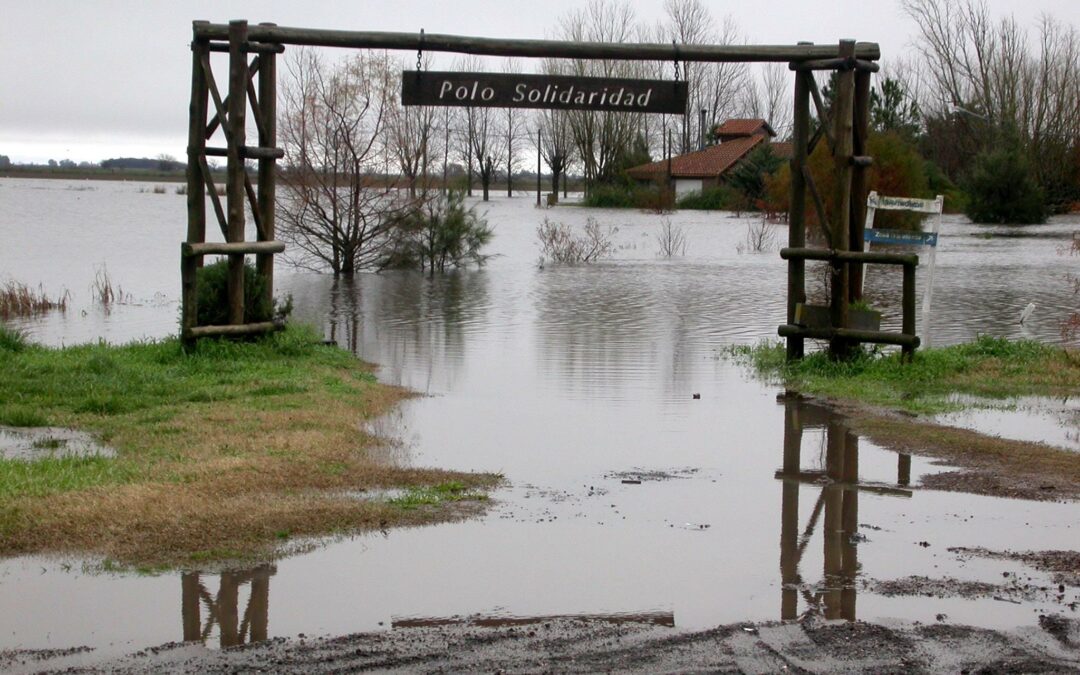
Aug 25, 2015 | Focolare Worldwide
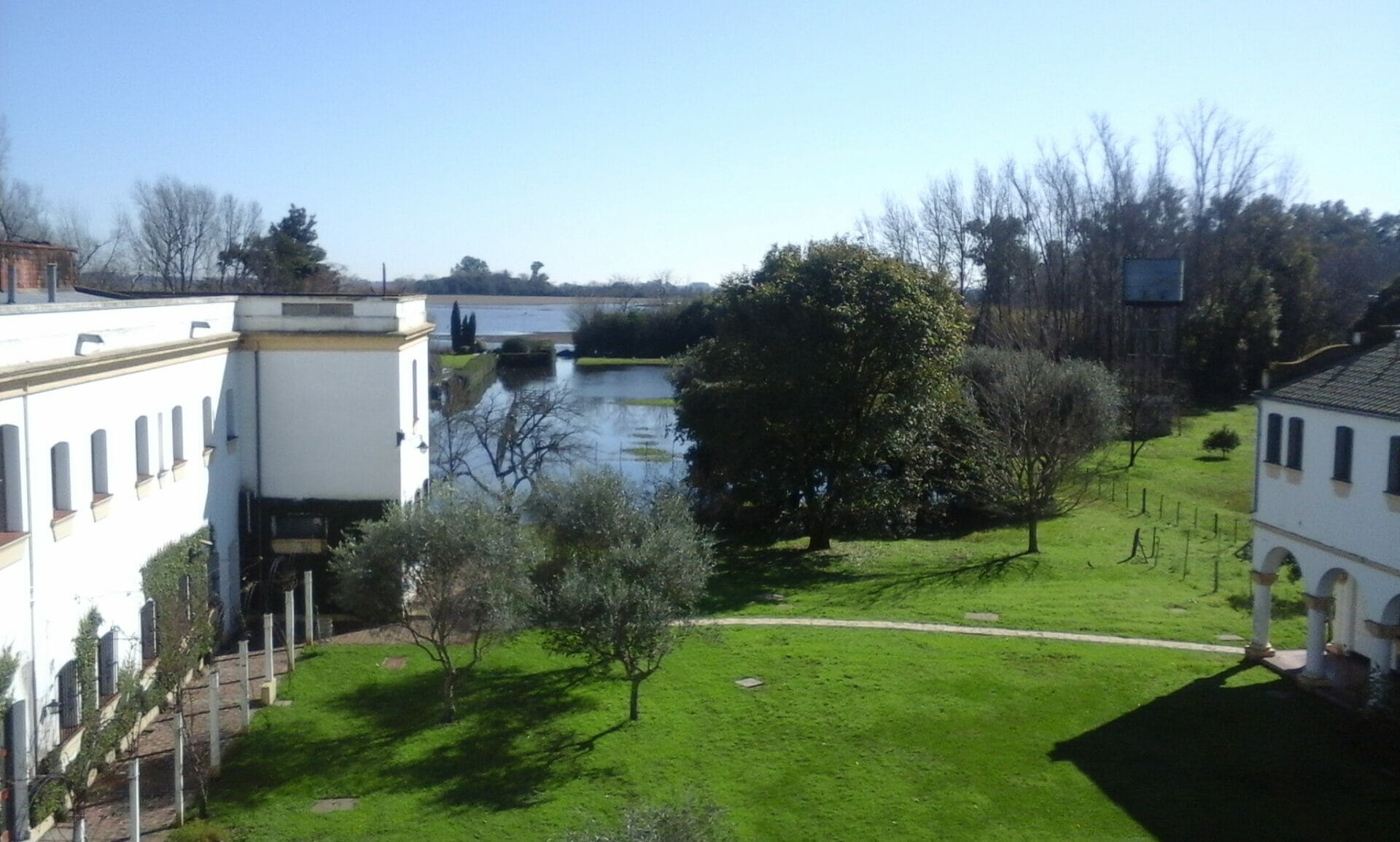 The Argentine provinces of Buenos Aires and Santa Fe were recently hit with severe rainfall. The local news media says that 20,000 people were affected and more than 4, 000 evacuees. Some roads are closed and others have limited access. The rains are unrelenting and a weather emergency is in force. However, in some regions the rain has begun to lessen. Mariapolis Lia, nestled in the Argentine pampas region, is literally submerged in water along with the Solidaridad Industrial Park where several Economy of Communion Businesses are located. “The water has flooded two buildings in the Park and also the garage of a third building,” Jorge Perrin writes from Solidad Industrial Park. Another two buildings are at risk: the water level has risen to a few centimetres. In the other buildings water has flooded the basements, but the living quarters are secure for the moment. The Primicias greenhouses along the road have also been flooded and the production completely lost, exept for a section of tomatoes. Pasticcino (coffee biscuits) is moving its production with the help of tractor from Primicias. For the moment the water has not flooded any of the dwellings in the Mariapolis itself.”
The Argentine provinces of Buenos Aires and Santa Fe were recently hit with severe rainfall. The local news media says that 20,000 people were affected and more than 4, 000 evacuees. Some roads are closed and others have limited access. The rains are unrelenting and a weather emergency is in force. However, in some regions the rain has begun to lessen. Mariapolis Lia, nestled in the Argentine pampas region, is literally submerged in water along with the Solidaridad Industrial Park where several Economy of Communion Businesses are located. “The water has flooded two buildings in the Park and also the garage of a third building,” Jorge Perrin writes from Solidad Industrial Park. Another two buildings are at risk: the water level has risen to a few centimetres. In the other buildings water has flooded the basements, but the living quarters are secure for the moment. The Primicias greenhouses along the road have also been flooded and the production completely lost, exept for a section of tomatoes. Pasticcino (coffee biscuits) is moving its production with the help of tractor from Primicias. For the moment the water has not flooded any of the dwellings in the Mariapolis itself.” 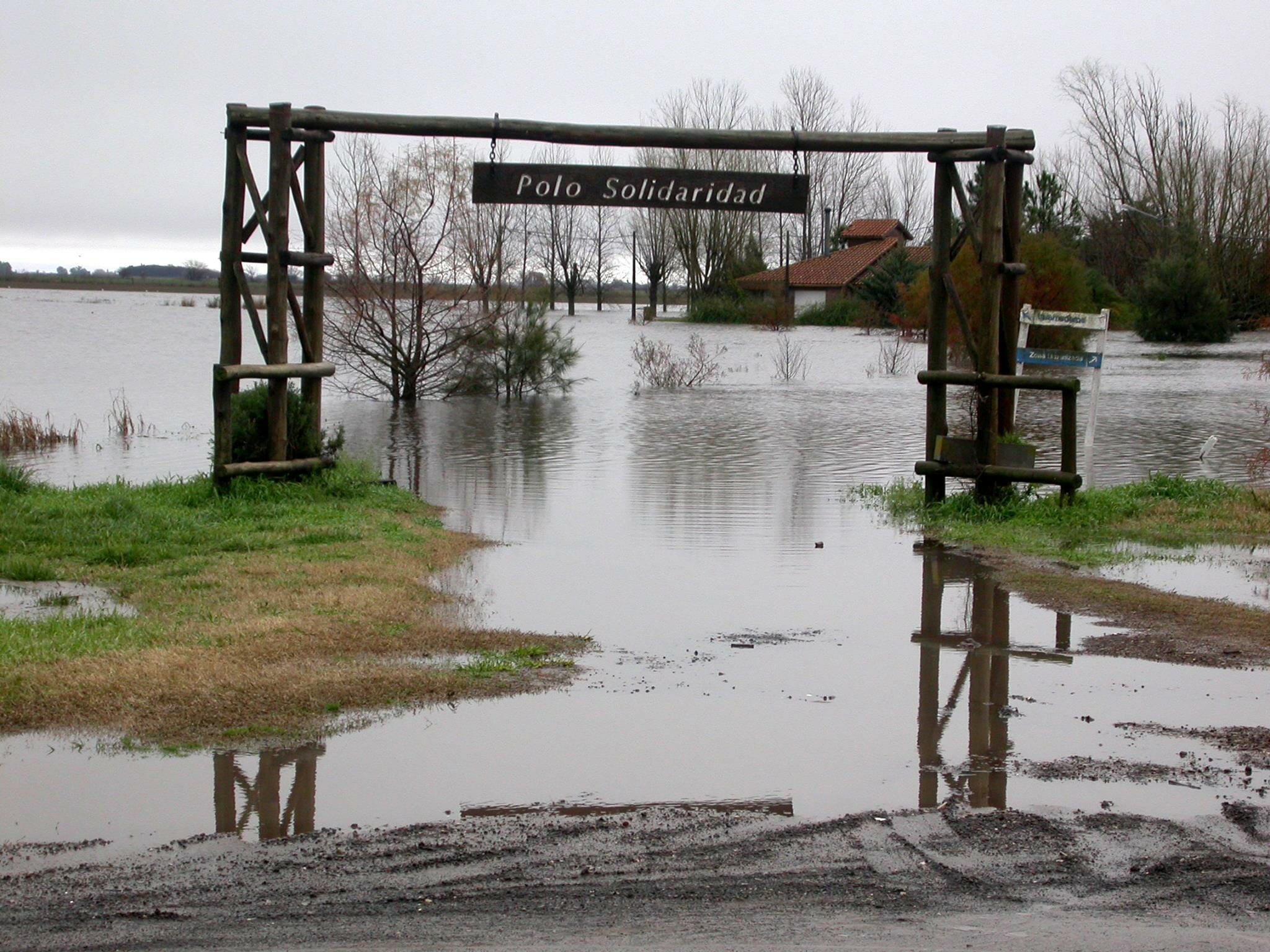 In many of the provinces of Buenos Aires the lagoons are connected with one another; the drainage channels are insufficient and the stretches of water become like oceans. “The channel of the Mariapolis and the Industrial Park had been cleaned recently and function well. But the problem of the road than links the Mariapolis to the nearby village is another story. It drains from another part. Access between the Mariapolis and the local village is completely flooded and it only possible to go from place to place in specialised vehicles.” “The solidarity amongst us is extraordinary,” he adds. The only automobiles capable of driving through the mud are the tractor and the Mariapolis van. So they’re always on the move transporting people to work, to school, to make purchases for others, or to take supplies to people, and so on. Throughout these days, in the countless telephone calls, in the communion amongst us, in the peaceful spirit with which we face every situation, I understand once again what a great family we are!” For enquiries on how to help.:polosolidaridad@gmail.com
In many of the provinces of Buenos Aires the lagoons are connected with one another; the drainage channels are insufficient and the stretches of water become like oceans. “The channel of the Mariapolis and the Industrial Park had been cleaned recently and function well. But the problem of the road than links the Mariapolis to the nearby village is another story. It drains from another part. Access between the Mariapolis and the local village is completely flooded and it only possible to go from place to place in specialised vehicles.” “The solidarity amongst us is extraordinary,” he adds. The only automobiles capable of driving through the mud are the tractor and the Mariapolis van. So they’re always on the move transporting people to work, to school, to make purchases for others, or to take supplies to people, and so on. Throughout these days, in the countless telephone calls, in the communion amongst us, in the peaceful spirit with which we face every situation, I understand once again what a great family we are!” For enquiries on how to help.:polosolidaridad@gmail.com
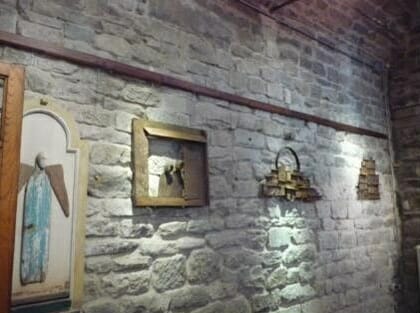
Aug 24, 2015 | Non categorizzato
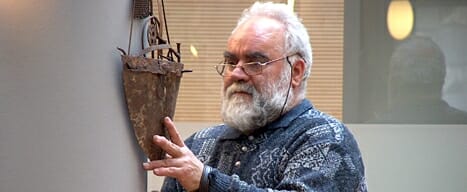 Thousands come together around the work of this Italian artist that is so in tune with Pope Francis’s Laudato sì. For years Ciro has been recycling scrap material for his creations.
Thousands come together around the work of this Italian artist that is so in tune with Pope Francis’s Laudato sì. For years Ciro has been recycling scrap material for his creations. 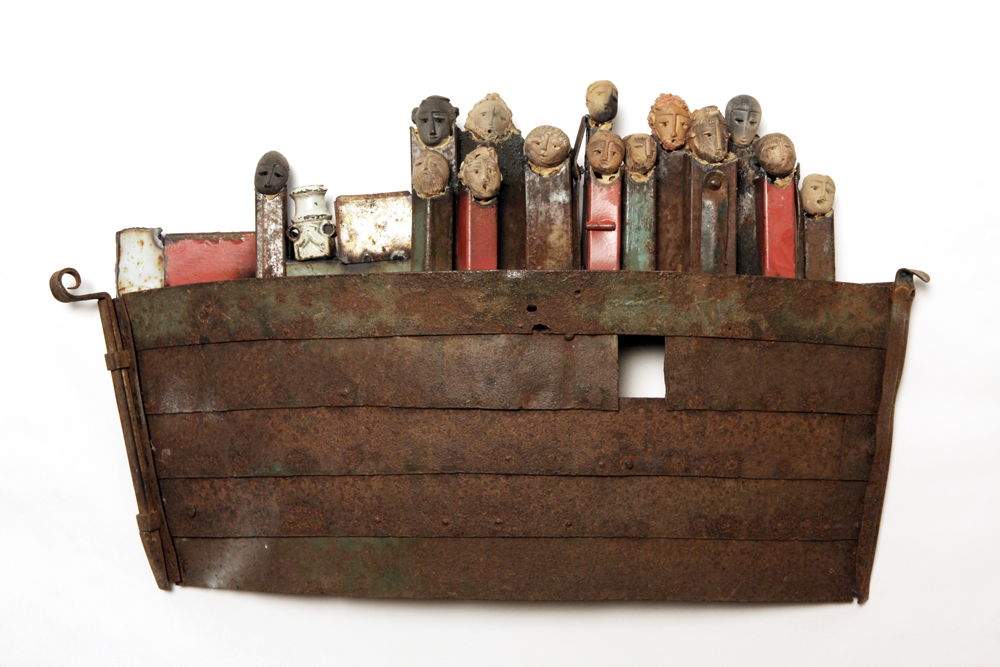 Known as Ciro, Roberto Cipollone not only welcomes visitors, but runs workshops for young and old that bring them into direct contact with the materials that will be transformed and modeled together: “a pure way of seeing, simple, direct contact with the beautiful without any tinsel,” says the artist. Besides the studio in Loppiano, which is the true creative workshop, a permanent workshop has been set up by Sergio Pandolfi.
Known as Ciro, Roberto Cipollone not only welcomes visitors, but runs workshops for young and old that bring them into direct contact with the materials that will be transformed and modeled together: “a pure way of seeing, simple, direct contact with the beautiful without any tinsel,” says the artist. Besides the studio in Loppiano, which is the true creative workshop, a permanent workshop has been set up by Sergio Pandolfi.

Ciro’s exhibition at Camaldoli
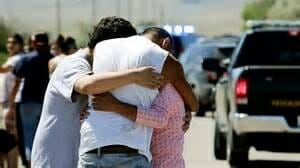
Aug 23, 2015 | Non categorizzato
 “Outside the centrifugal action of love, human beings seem to hold on to whatever causes division. They find millions of reasons, through religion itself, to set themselves apart, nullifying that freedom of movement that had been restored by Jesus when he brought down the walls of division and established that there would no longer be neither Greek nor Jew, neither slave nor master, neither male nor female – but God would be in all, and all would be in God. (…) That is love’s goal: that is the goal of existence, to make all one. To make all the Oneness that is God. By the impulse of Divine Love, existence, all of history became a return march towards unity. Everything comes from God; everything returns to God. Making yourself one with a neighbour means disappearing in him, such that between God, my neighbour and me a direct passageway is established, through my elimination, an unobstructed descent – from Oneness to the other: and so I find God in that neighbour. The neighbour is like the temple that ignites God’s light. So, I find God in the Sacrament of the Altar and in the person of my neighbour, through the effect of love. The neighbour breaks down the barriers and, in the breach, allows life to flow: the life that is God. The neighbour is ianua caeli, “gate of Paradise”. There are Christians who go to serve the least, in the lowest social classes, not so much to convert them, but to convert themselves: giving love in the form of service (to the ailing, the unemployed, the elderly – all the social refuse as they are labeled), and they find Christ. Much more than they can ever give, therefore. They offer a loaf of bread and find the Father. They convert both the helpers and also the assisted. They become holy as they bless their neighbours. Therefore, you rise to God by descending beneath every human level, to serve all people from down there, on whatever plane they may be; whereas, the Jewish priest who did not look upon the unfortunate of this earth because his gaze was fixed on the God of Heaven, never found neither God nor neighbour. He never found God because he was never turned towards his neighbour. And this is a way of proceeding from the Father who proclaims his glory in highest heaven by allowing his Son to be born in the most humble of shelters: a stable, thus establishing a connection between stars and stables through the divinizing action of love. Thus, the last shall be the first in an overturning of logic, or rather, God’s way of calculating; his counting starts from the least while we start counting from the most. What is first for us becomes last for him, and what is last for us becomes first for him. And so wealth, power, glory which we consider to be first and foremost, God considers them to be last; they count for nothing and have to wait in line. This is the actual yardstick for measuring people and things.” (From Igino Giordani. Il fratello,(Rome: Città Nuova, 2011), pp.78-80.
“Outside the centrifugal action of love, human beings seem to hold on to whatever causes division. They find millions of reasons, through religion itself, to set themselves apart, nullifying that freedom of movement that had been restored by Jesus when he brought down the walls of division and established that there would no longer be neither Greek nor Jew, neither slave nor master, neither male nor female – but God would be in all, and all would be in God. (…) That is love’s goal: that is the goal of existence, to make all one. To make all the Oneness that is God. By the impulse of Divine Love, existence, all of history became a return march towards unity. Everything comes from God; everything returns to God. Making yourself one with a neighbour means disappearing in him, such that between God, my neighbour and me a direct passageway is established, through my elimination, an unobstructed descent – from Oneness to the other: and so I find God in that neighbour. The neighbour is like the temple that ignites God’s light. So, I find God in the Sacrament of the Altar and in the person of my neighbour, through the effect of love. The neighbour breaks down the barriers and, in the breach, allows life to flow: the life that is God. The neighbour is ianua caeli, “gate of Paradise”. There are Christians who go to serve the least, in the lowest social classes, not so much to convert them, but to convert themselves: giving love in the form of service (to the ailing, the unemployed, the elderly – all the social refuse as they are labeled), and they find Christ. Much more than they can ever give, therefore. They offer a loaf of bread and find the Father. They convert both the helpers and also the assisted. They become holy as they bless their neighbours. Therefore, you rise to God by descending beneath every human level, to serve all people from down there, on whatever plane they may be; whereas, the Jewish priest who did not look upon the unfortunate of this earth because his gaze was fixed on the God of Heaven, never found neither God nor neighbour. He never found God because he was never turned towards his neighbour. And this is a way of proceeding from the Father who proclaims his glory in highest heaven by allowing his Son to be born in the most humble of shelters: a stable, thus establishing a connection between stars and stables through the divinizing action of love. Thus, the last shall be the first in an overturning of logic, or rather, God’s way of calculating; his counting starts from the least while we start counting from the most. What is first for us becomes last for him, and what is last for us becomes first for him. And so wealth, power, glory which we consider to be first and foremost, God considers them to be last; they count for nothing and have to wait in line. This is the actual yardstick for measuring people and things.” (From Igino Giordani. Il fratello,(Rome: Città Nuova, 2011), pp.78-80.
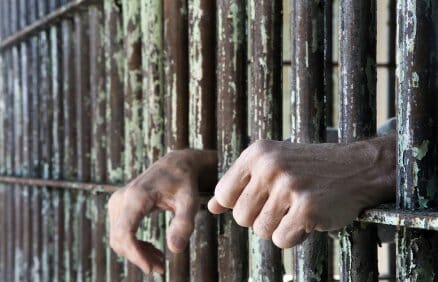
Aug 22, 2015 | Focolare Worldwide
 “Since 1994 I have worked in the Pastoral Jail of the Archdiocese of Santiago in Cuba which also includes the city of Guantanamo. Together with other volunteers we see to their needs and those of their relatives, because these people are really the poorest among the poor. In 2007, when I encountered the spirituality of unity, it was if a ray of light penetrated me, and more than ever enlightened my service in jail and made me understand that in life we have to look for what unites and not what divides us. Sharing this way of life with others helped me a lot. Some said: «How can you deal with murderers and rapists, knowing that most of them do not even take notice of those who try to give them a hand…». This is true. At times it is so, but the spirituality of Chiara Lubich helps me to see in each of them the figure of Jesus crucified and abandoned. We only have to sow that small seed of the Gospel, without expecting anything in return. This conviction gives me strength and support and makes me feel less alone. It prevents me from falling into the temptation of leaving this service, and I can see that in the end, I will always receive more than what I have given. It has been some time now since we started to bring the leaflet of the Word of Life every month to the prisoners and also their families. After some time, to our great surprise, we found that in the special surveillance sector, a small community of prisoners was created, led by a young man. Together they discuss about the contents of the leaflet and during the month they try to put it into practice and make really significant experiences. “In my youth–Y recounted– I committed some crimes for which I am serving a life sentence. I am in the Guantanamo city jail (not far from the ill-famed American high-security jail). I found my faith in God through the members of the Focolare Movement, who for some years now have been visiting me regularly. I also wrote my story, where I talk about my meeting with God and of how it rekindled the hope in unending Life. Every day I try to put the Word of Life of the month into practice.» One day, another prisoner, Y, told us on the phone: «I’m down with fever and have a strong headache. I really needed to talk to you and took the opportunity of a permit to call you. Talking to you is like a balsam for me. » I ensured him that we were praying for him, and that Jesus came to save us, notwithstanding the life we live on earth. He said that he was also convinced of this and added «this is what I pray for daily, and it gives me the strength to go on loving everyone.” (Carmen, Santiago di Cuba)
“Since 1994 I have worked in the Pastoral Jail of the Archdiocese of Santiago in Cuba which also includes the city of Guantanamo. Together with other volunteers we see to their needs and those of their relatives, because these people are really the poorest among the poor. In 2007, when I encountered the spirituality of unity, it was if a ray of light penetrated me, and more than ever enlightened my service in jail and made me understand that in life we have to look for what unites and not what divides us. Sharing this way of life with others helped me a lot. Some said: «How can you deal with murderers and rapists, knowing that most of them do not even take notice of those who try to give them a hand…». This is true. At times it is so, but the spirituality of Chiara Lubich helps me to see in each of them the figure of Jesus crucified and abandoned. We only have to sow that small seed of the Gospel, without expecting anything in return. This conviction gives me strength and support and makes me feel less alone. It prevents me from falling into the temptation of leaving this service, and I can see that in the end, I will always receive more than what I have given. It has been some time now since we started to bring the leaflet of the Word of Life every month to the prisoners and also their families. After some time, to our great surprise, we found that in the special surveillance sector, a small community of prisoners was created, led by a young man. Together they discuss about the contents of the leaflet and during the month they try to put it into practice and make really significant experiences. “In my youth–Y recounted– I committed some crimes for which I am serving a life sentence. I am in the Guantanamo city jail (not far from the ill-famed American high-security jail). I found my faith in God through the members of the Focolare Movement, who for some years now have been visiting me regularly. I also wrote my story, where I talk about my meeting with God and of how it rekindled the hope in unending Life. Every day I try to put the Word of Life of the month into practice.» One day, another prisoner, Y, told us on the phone: «I’m down with fever and have a strong headache. I really needed to talk to you and took the opportunity of a permit to call you. Talking to you is like a balsam for me. » I ensured him that we were praying for him, and that Jesus came to save us, notwithstanding the life we live on earth. He said that he was also convinced of this and added «this is what I pray for daily, and it gives me the strength to go on loving everyone.” (Carmen, Santiago di Cuba)
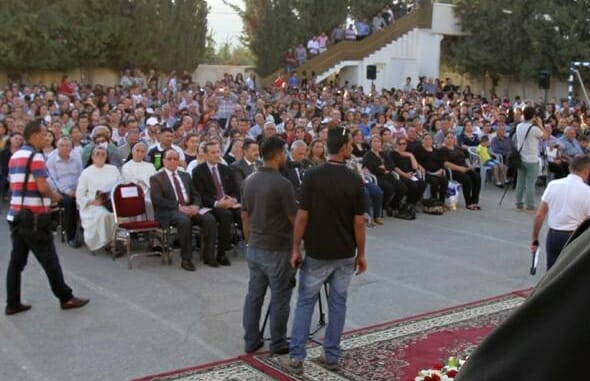
Aug 21, 2015 | Focolare Worldwide
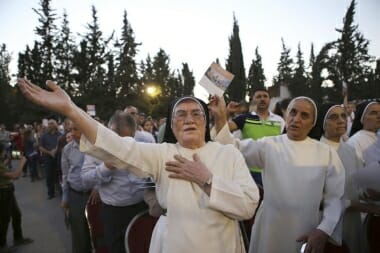
Aug. 8, 2015: Iraqi Christian refugees attend an outdoor prayer service to mark a year since their displacement, in Fuheis near Amman, Jordan. (AP Photo/Raad Adayleh)
 “Forty people came, including the Mayor of the city and several other civil authorities. The Cardinal, Patriarchs and Bishops wanted to spend some time in prayer in our chapel: a solemn moment.” This opportunity for Christians to be gathered together in prayerful unity was a strong summons especially during this period of great uncertainty in the Middle East. “A moment of relief for a martyred land.”
“Forty people came, including the Mayor of the city and several other civil authorities. The Cardinal, Patriarchs and Bishops wanted to spend some time in prayer in our chapel: a solemn moment.” This opportunity for Christians to be gathered together in prayerful unity was a strong summons especially during this period of great uncertainty in the Middle East. “A moment of relief for a martyred land.”
Aug 20, 2015 | Focolare Worldwide
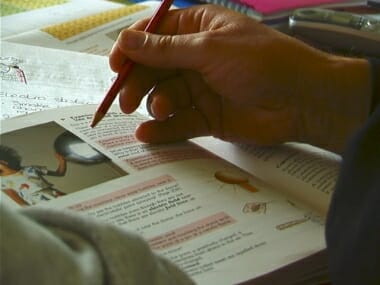
Aug 19, 2015 | Focolare Worldwide
 “My name is Marco and I am 35 years old. Since 2008 I have been working as a substitute Catholic religion teacher. Unfortunately, due to bureaucratic reasons, I work only sporadically, on an average of about two months a year. This year I was called for three days in a school, for a week in another school after some months, and then for a few days elsewhere. On the average, it was about two months a year. In my capacity as an employee of the State I am not allowed to have two jobs and have to be available all the time when I am called to teach, since – should I refuse – I would be surpassed by others. I live with my parents and have a lot of free time, I take care of various house chores, some other commitments in the parish, and the education of youth and adults of an oratory where I coordinate the Word of Life monthly meeting; I do volunteer work in a home for the aged and am a member of the diocesan office for ecumenism and interreligious dialogue. All these activities keep me busy and active. But when work is scarce, a subtle veil of discouragement and low self-esteem grow in me, and everything always seems to become more difficult. One day, a friend, knowing about my work situation, phoned to say that he had met a student who needed tutoring in Latin and Greek. My friend knew about my educational background and was certain that I could easily fill the post. In effect, after High School I had never abandoned my knowledge of the classical languages. In fact, in order to understand the Old Testament better, I had recently even started to study biblical Jewish. Initially my first reaction was to refuse the offer, but I was given 10 days to think it over. Then, the student would have turned to other private tutors. Those who are familiar with the art of translating old languages are aware that translating for oneself or trying one’s hand in translating is one thing, and that giving private lessons to a person who needs to progress and achieve good grades on the report card, is another thing altogether. I needed a job even though this meant revising the grammar rules of Greek and Latin in ten days, and learning to teach it. To be able to succeed I would have had to drop all my other commitments for seven days and study from 8-10 hours a day. It was like a leap in the dark. And so it was: I started to study like crazy. And then, after a few days, the same friend offered me a room in his house, and even the keys to the house. Another friend who came to know about my “new job” introduced me also to his son who needed tutoring. But more than a teacher, he needed tutoring not only in Latin and Greek but also in philosophy, Italian and English literature, in short, the whole humanistic area. He was a desperate case. In fact he was a very problematic person in terms of relationships, and in the last year of high school had been given an “unclassified” grade. I entrusted myself to God and accepted to be his tutor. Today he has started to get a set of 8s and 9s and his enthusiasm is growing. Even his personal relationships have started to improve. I recently worked as substitute teacher for a month, continue to give private lessons in the afternoon and also keep up with my previous commitments.”
“My name is Marco and I am 35 years old. Since 2008 I have been working as a substitute Catholic religion teacher. Unfortunately, due to bureaucratic reasons, I work only sporadically, on an average of about two months a year. This year I was called for three days in a school, for a week in another school after some months, and then for a few days elsewhere. On the average, it was about two months a year. In my capacity as an employee of the State I am not allowed to have two jobs and have to be available all the time when I am called to teach, since – should I refuse – I would be surpassed by others. I live with my parents and have a lot of free time, I take care of various house chores, some other commitments in the parish, and the education of youth and adults of an oratory where I coordinate the Word of Life monthly meeting; I do volunteer work in a home for the aged and am a member of the diocesan office for ecumenism and interreligious dialogue. All these activities keep me busy and active. But when work is scarce, a subtle veil of discouragement and low self-esteem grow in me, and everything always seems to become more difficult. One day, a friend, knowing about my work situation, phoned to say that he had met a student who needed tutoring in Latin and Greek. My friend knew about my educational background and was certain that I could easily fill the post. In effect, after High School I had never abandoned my knowledge of the classical languages. In fact, in order to understand the Old Testament better, I had recently even started to study biblical Jewish. Initially my first reaction was to refuse the offer, but I was given 10 days to think it over. Then, the student would have turned to other private tutors. Those who are familiar with the art of translating old languages are aware that translating for oneself or trying one’s hand in translating is one thing, and that giving private lessons to a person who needs to progress and achieve good grades on the report card, is another thing altogether. I needed a job even though this meant revising the grammar rules of Greek and Latin in ten days, and learning to teach it. To be able to succeed I would have had to drop all my other commitments for seven days and study from 8-10 hours a day. It was like a leap in the dark. And so it was: I started to study like crazy. And then, after a few days, the same friend offered me a room in his house, and even the keys to the house. Another friend who came to know about my “new job” introduced me also to his son who needed tutoring. But more than a teacher, he needed tutoring not only in Latin and Greek but also in philosophy, Italian and English literature, in short, the whole humanistic area. He was a desperate case. In fact he was a very problematic person in terms of relationships, and in the last year of high school had been given an “unclassified” grade. I entrusted myself to God and accepted to be his tutor. Today he has started to get a set of 8s and 9s and his enthusiasm is growing. Even his personal relationships have started to improve. I recently worked as substitute teacher for a month, continue to give private lessons in the afternoon and also keep up with my previous commitments.”
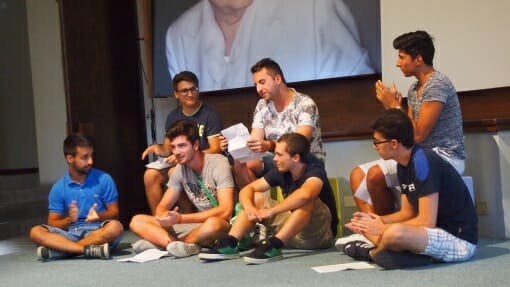
Aug 18, 2015 | Focolare Worldwide
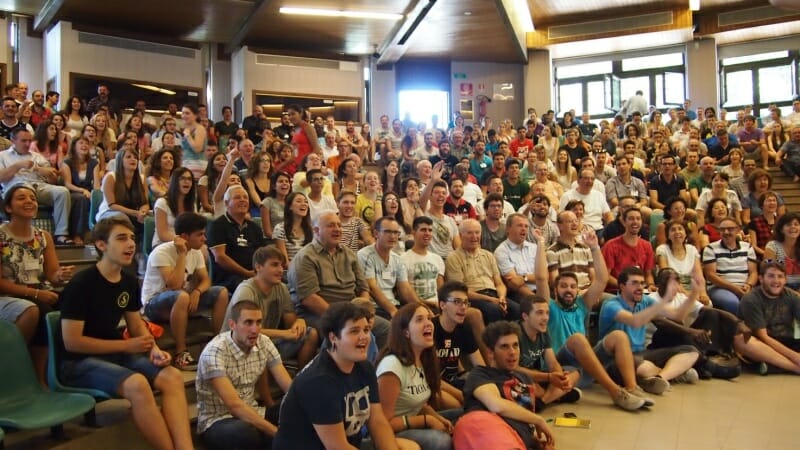 The somewhat quirky diversity of the hall at the Chiara Lubich Centre in Trent this year was a bit surprising: 250 young people between the ages of 16 and 30 from more than 20 countries; 70 priests and seminarians and some twenty adults who are all committed in living the spirituality of the Focolare at the parish or diocesan levels. What was the idea behind this meeting which was planned for the 2cnd to the 8th of August? What is the connection between the different cultural backgrounds? The first answer can be found in the title of the meeting: “Like yesterday,” and the second answer in the city of Trent itself. All of these young people and adults were gathered to reflect on the first generative seed of their own spiritual charism and to look back even physcially at the journey that has inspired the Focolare Movement from its beginnings. “The meeting opened in an atmosphere of explosive joy,’ Ludovico and Elonora recount. “The programme is meant to be an immersion in the life of those early days and the radicalness in living the Word.” The programme alternated between thematic topics and excursions to the places where the Focolare began: Piazza Cappuccini, Fiera di Primiero, Tonadico, Goccia d’Oro. “During the Mass in the Cappuchin church,” Zbyszek writes, “we declared ourselves ready with the help of Christ’s grace, to give our lives one for the other beginning from the small things of everyday life. In the place where God had sealed the pact of unity between Chiara and Igino Giordani (Foco), we also wishe to renew that mutual love which we wish to live as they did that yesterday.”
The somewhat quirky diversity of the hall at the Chiara Lubich Centre in Trent this year was a bit surprising: 250 young people between the ages of 16 and 30 from more than 20 countries; 70 priests and seminarians and some twenty adults who are all committed in living the spirituality of the Focolare at the parish or diocesan levels. What was the idea behind this meeting which was planned for the 2cnd to the 8th of August? What is the connection between the different cultural backgrounds? The first answer can be found in the title of the meeting: “Like yesterday,” and the second answer in the city of Trent itself. All of these young people and adults were gathered to reflect on the first generative seed of their own spiritual charism and to look back even physcially at the journey that has inspired the Focolare Movement from its beginnings. “The meeting opened in an atmosphere of explosive joy,’ Ludovico and Elonora recount. “The programme is meant to be an immersion in the life of those early days and the radicalness in living the Word.” The programme alternated between thematic topics and excursions to the places where the Focolare began: Piazza Cappuccini, Fiera di Primiero, Tonadico, Goccia d’Oro. “During the Mass in the Cappuchin church,” Zbyszek writes, “we declared ourselves ready with the help of Christ’s grace, to give our lives one for the other beginning from the small things of everyday life. In the place where God had sealed the pact of unity between Chiara and Igino Giordani (Foco), we also wishe to renew that mutual love which we wish to live as they did that yesterday.” 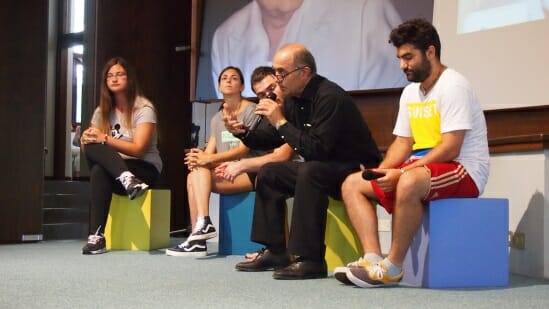 Then we had an opportunity to be enriched by presentations from experts in the fields of communication, interreligious dialogue and cooperation and development in the Action for a United World (AMU). Thanks to them we were able to reflect on communication and the challenges of our multiethnic and multi-religious society. Much time was dedicated to delving into the topics of immigration and welcoming thanks to the precious collaboration by the Cinformi Project, which presented the model of welcoming that has been proposed and applied by the city of Trent, placing itself at our service with active workshops involving two visits to refugee camps. Some of the most unforgettable moments of the meeting were spent with a hundred refugees who are waiting to see what the future will bring.
Then we had an opportunity to be enriched by presentations from experts in the fields of communication, interreligious dialogue and cooperation and development in the Action for a United World (AMU). Thanks to them we were able to reflect on communication and the challenges of our multiethnic and multi-religious society. Much time was dedicated to delving into the topics of immigration and welcoming thanks to the precious collaboration by the Cinformi Project, which presented the model of welcoming that has been proposed and applied by the city of Trent, placing itself at our service with active workshops involving two visits to refugee camps. Some of the most unforgettable moments of the meeting were spent with a hundred refugees who are waiting to see what the future will bring.  Several of them came to see us at the meeting. Rita confided: “I was so struck by Lamin, a young Muslim from Ghana who had written a poem to his mother and wished to read it to everyone. It was a poem filled with nostalgia but also hope. The eyes of these people says it all and they can never forget.” At the conclusion of the meeting two goals were set – one short-term and the other long-term: the World Youth Day meeting (WYD) in Poland; and the unity of the world in accordance with Jesus’s prayer that all be one for which we wish to spend our lives. “We leave committed to becoming the ‘living Word,” Danilo and Emmanuele write and to take this “pure water from the source” into our own lands and into our daily life in our peripheries, offering it to every neighbour that goes by.”
Several of them came to see us at the meeting. Rita confided: “I was so struck by Lamin, a young Muslim from Ghana who had written a poem to his mother and wished to read it to everyone. It was a poem filled with nostalgia but also hope. The eyes of these people says it all and they can never forget.” At the conclusion of the meeting two goals were set – one short-term and the other long-term: the World Youth Day meeting (WYD) in Poland; and the unity of the world in accordance with Jesus’s prayer that all be one for which we wish to spend our lives. “We leave committed to becoming the ‘living Word,” Danilo and Emmanuele write and to take this “pure water from the source” into our own lands and into our daily life in our peripheries, offering it to every neighbour that goes by.”
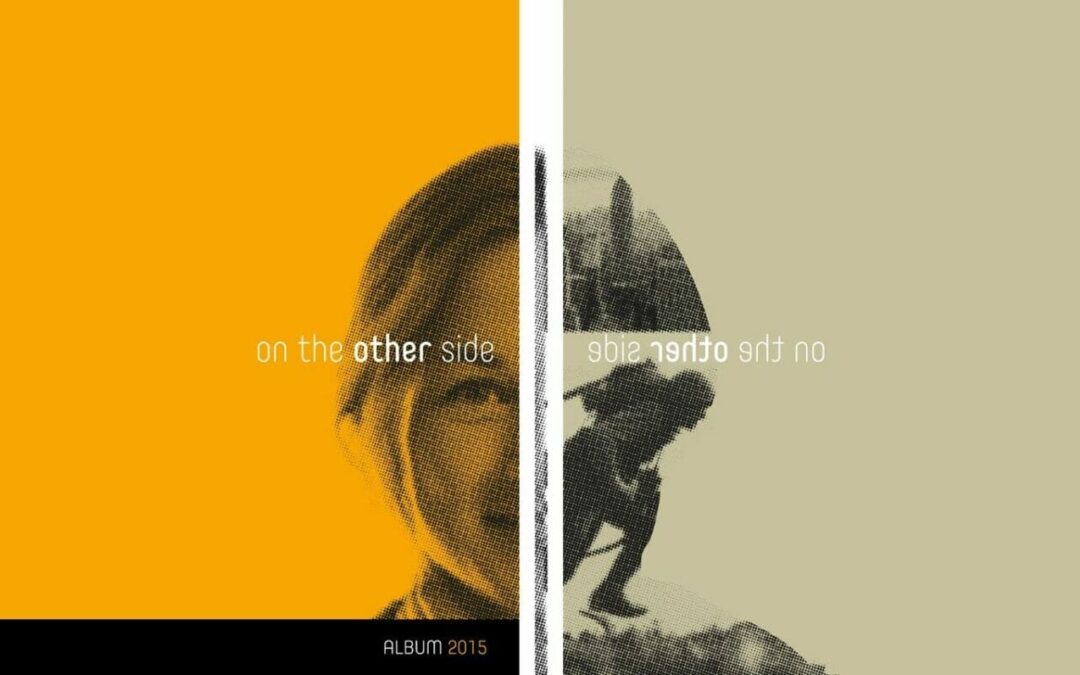
Aug 17, 2015 | Non categorizzato
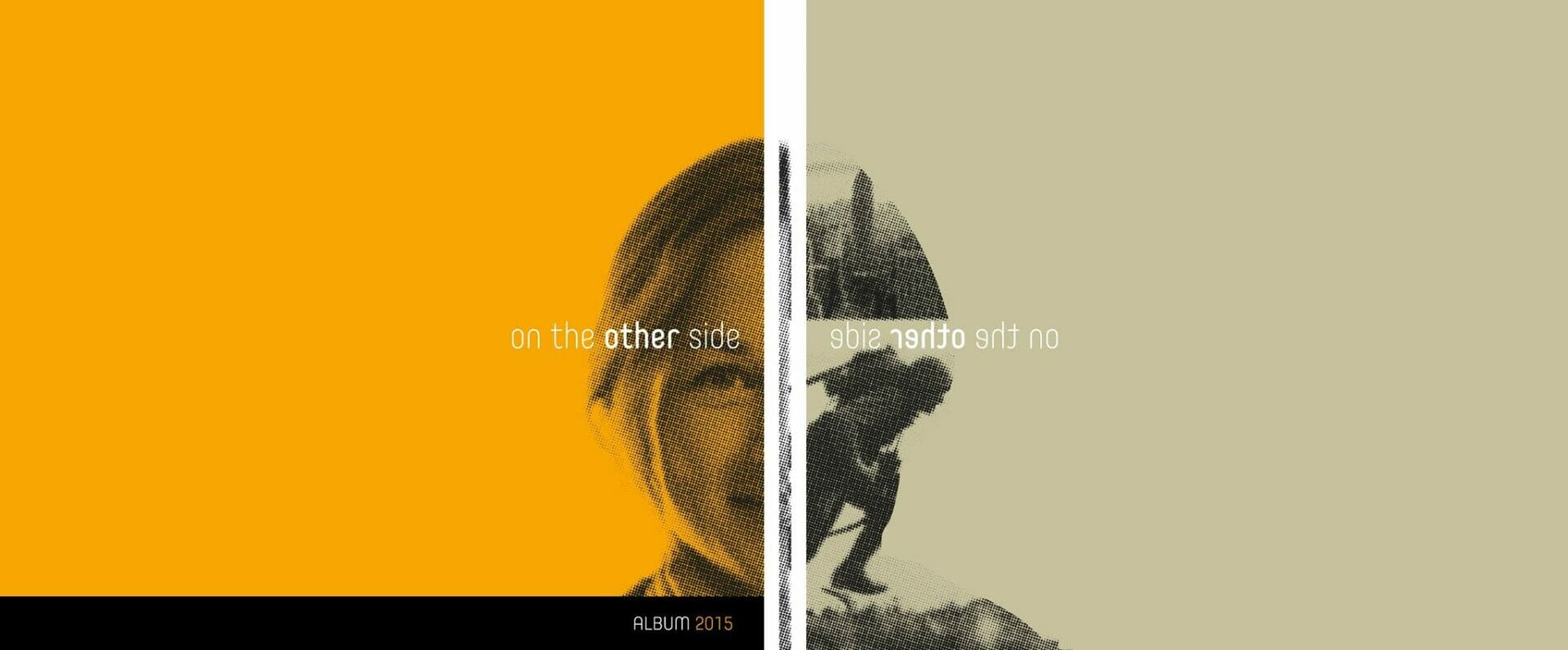 Eleven songs in five languages: English, Italian, Spanish, Portuguese and Korean. 47 minutes of pop-rock and world music, full of passion, force, vitality in music and words branded Gen Verde. According to the band’s manager, Sally McAllister, “This album is autobiographical and biographical at the same time.” It is an affirmation shared by all the members of the group. In fact, as they say, “It is biographical because the undisputed protagonist of this album is humanity that recounts its story: of people in the face of present-day challenges, the tragedies and conquests, history which marks the world’s pace, people moving along the roads of the planet in search of a land, dignity, and a place they can call their home.” But it is also autobiographical, since it is “imbued with our own stories and the musical cultures we come from.” “We wanted to try our hand,” the Gen Verde members say, “in recounting the moments and facts that marked a turning point in our lives. Different paths, with various departure points from physical sites and soul places that oftentimes are diametrically opposed but which all target that sole horizon of fraternity.” In fact, “Every piece tells a story, such as Voz de la verdad, a homage to Oscar Romero,” says the Salvadorean, Xochitl Rodríguez. And also Chi piange per te? – the cry of thousands of migrants on the banks of the Mediterranean, which continues to echo across Africa to Europe, and in every continent where people are forced to leave in order to survive. Another song You’re Part of Me is the interrupted story of the Korean people, who refuse to give in to the scandal of separation. The musical arrangement is K-pop, a genre that is very popular today with the young Koreans, and says the desire for unity is not an issue of 70 years ago, but is one of today, of this generation that will not give up.”
Eleven songs in five languages: English, Italian, Spanish, Portuguese and Korean. 47 minutes of pop-rock and world music, full of passion, force, vitality in music and words branded Gen Verde. According to the band’s manager, Sally McAllister, “This album is autobiographical and biographical at the same time.” It is an affirmation shared by all the members of the group. In fact, as they say, “It is biographical because the undisputed protagonist of this album is humanity that recounts its story: of people in the face of present-day challenges, the tragedies and conquests, history which marks the world’s pace, people moving along the roads of the planet in search of a land, dignity, and a place they can call their home.” But it is also autobiographical, since it is “imbued with our own stories and the musical cultures we come from.” “We wanted to try our hand,” the Gen Verde members say, “in recounting the moments and facts that marked a turning point in our lives. Different paths, with various departure points from physical sites and soul places that oftentimes are diametrically opposed but which all target that sole horizon of fraternity.” In fact, “Every piece tells a story, such as Voz de la verdad, a homage to Oscar Romero,” says the Salvadorean, Xochitl Rodríguez. And also Chi piange per te? – the cry of thousands of migrants on the banks of the Mediterranean, which continues to echo across Africa to Europe, and in every continent where people are forced to leave in order to survive. Another song You’re Part of Me is the interrupted story of the Korean people, who refuse to give in to the scandal of separation. The musical arrangement is K-pop, a genre that is very popular today with the young Koreans, and says the desire for unity is not an issue of 70 years ago, but is one of today, of this generation that will not give up.”
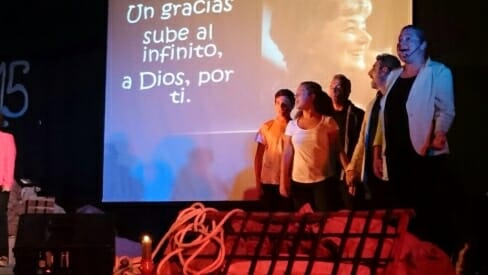
Aug 16, 2015 | Focolare Worldwide, Senza categoria
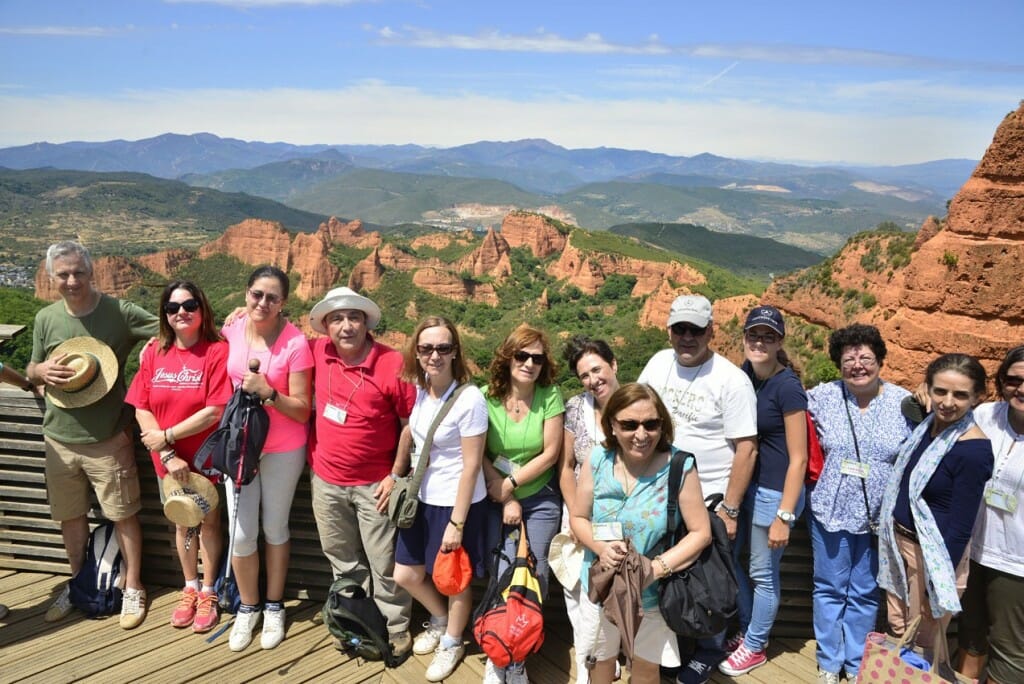 One person attending the Mariapolis in Astorga for the first time described it as a “heart to heart meeting.” It was just one of the many similar Mariapolises that are underway or have already taken place across Europe and in many other lands. The Mariapolis of August 2-6 was a peaceful “invasion” of the town by 800 people from several parts of Spain, but also from France, Italy, Germany and Brazil. During excursions to monuments and museums, at Mass celebrated in the Gothic Cathedral, or during the evening concerts with all types of music – the streets were crowded with people from the Mariapolis. And the local citizens of Astorga whose curiosity had been aroused by the fraternal spirit of those people, responded in kind. One woman stopped a girl who was walking down the street to thank her for the presence of such a joyful group in their city. The balance between periods of relaxation, formation, dialogue, listening to testimonies and play was much appreciated. It was a good mix that contributed to the objectives of the Mariapolis: to favour an encounter with oneself, God, and others. One participant observed: “It wasn’t a crescendo that began at a one level and then progressed in quality or intensity. Each day was full, complete, and totally valuable in itself.” Amongst the activities for children and teens were several marches in the city, with stops in certain streets and squares where activities were held. The Astorga Mariapolis was also on Facebook, a virtual meeting spot for both the participants and for those who could not physically attend. Many contributed photos that can still be accessed online. Some of the comments: https://www.facebook.com/mariapolisastorga2015 “This is my first Mariapolis,” Cati writes. “These days were filled with brotherhood, love and unity. My family and I thank everyone who made this wonderful event possible;” “I’m still on my way home towards Toledo,” writes Paco. “I take the opportunity to thank everyone for these past few days. I have to say that it was a Mariapolis filled with graces.”
One person attending the Mariapolis in Astorga for the first time described it as a “heart to heart meeting.” It was just one of the many similar Mariapolises that are underway or have already taken place across Europe and in many other lands. The Mariapolis of August 2-6 was a peaceful “invasion” of the town by 800 people from several parts of Spain, but also from France, Italy, Germany and Brazil. During excursions to monuments and museums, at Mass celebrated in the Gothic Cathedral, or during the evening concerts with all types of music – the streets were crowded with people from the Mariapolis. And the local citizens of Astorga whose curiosity had been aroused by the fraternal spirit of those people, responded in kind. One woman stopped a girl who was walking down the street to thank her for the presence of such a joyful group in their city. The balance between periods of relaxation, formation, dialogue, listening to testimonies and play was much appreciated. It was a good mix that contributed to the objectives of the Mariapolis: to favour an encounter with oneself, God, and others. One participant observed: “It wasn’t a crescendo that began at a one level and then progressed in quality or intensity. Each day was full, complete, and totally valuable in itself.” Amongst the activities for children and teens were several marches in the city, with stops in certain streets and squares where activities were held. The Astorga Mariapolis was also on Facebook, a virtual meeting spot for both the participants and for those who could not physically attend. Many contributed photos that can still be accessed online. Some of the comments: https://www.facebook.com/mariapolisastorga2015 “This is my first Mariapolis,” Cati writes. “These days were filled with brotherhood, love and unity. My family and I thank everyone who made this wonderful event possible;” “I’m still on my way home towards Toledo,” writes Paco. “I take the opportunity to thank everyone for these past few days. I have to say that it was a Mariapolis filled with graces.”  A project was proposed that would bring the Mariapolis spirit into daily life: “We’re all Mediterranean” to help inform European citizens on the drama of immigration that is taking place in our common Mediterranean Sea, from southern borders, from disadvantaged and war-torn lands, in search for better living conditions. This project, which is in harmony with the theme of this year’s Mariapolis (“Paths that meet”) involves a collection of signatures to petition the European Union for a significant change in migration policy. On the last day of the Mariapolis when the participants were asked for their evaluation of the event, everyone said they were satisfied, especially with regard to the way they felt welcomed from the moment they arrived, even those who were attending for the first time. The town of Astorga built to a human scale and with such a pleasant climate, combined so many features that helped facilitate the coming together which was the goal of the Mariapolis. For this reason the organisers of the Mariapolis write: “the Focolare Movement expresses its warm gratitude to the Diocese and Town Administration for their exquisite collaboration.”
A project was proposed that would bring the Mariapolis spirit into daily life: “We’re all Mediterranean” to help inform European citizens on the drama of immigration that is taking place in our common Mediterranean Sea, from southern borders, from disadvantaged and war-torn lands, in search for better living conditions. This project, which is in harmony with the theme of this year’s Mariapolis (“Paths that meet”) involves a collection of signatures to petition the European Union for a significant change in migration policy. On the last day of the Mariapolis when the participants were asked for their evaluation of the event, everyone said they were satisfied, especially with regard to the way they felt welcomed from the moment they arrived, even those who were attending for the first time. The town of Astorga built to a human scale and with such a pleasant climate, combined so many features that helped facilitate the coming together which was the goal of the Mariapolis. For this reason the organisers of the Mariapolis write: “the Focolare Movement expresses its warm gratitude to the Diocese and Town Administration for their exquisite collaboration.”
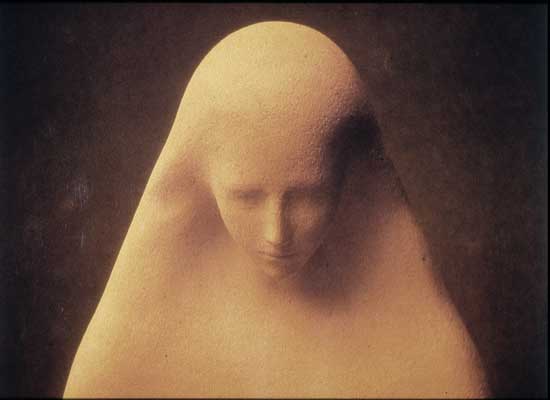
Aug 15, 2015 | Non categorizzato

Ave Cerquetti, ‘Mater Christi’ – Roma, 1971
Aug 14, 2015 | Non categorizzato
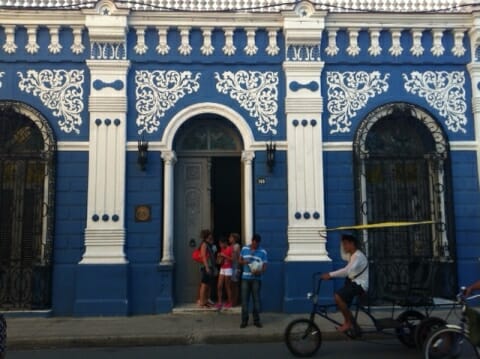
Aug 13, 2015 | Focolare Worldwide
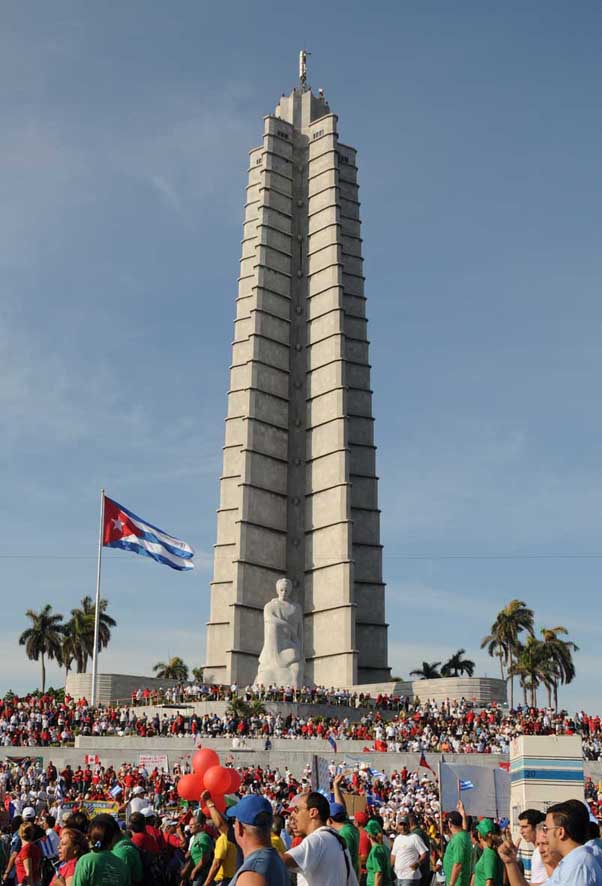
Revolution Square and José Martí Memorial
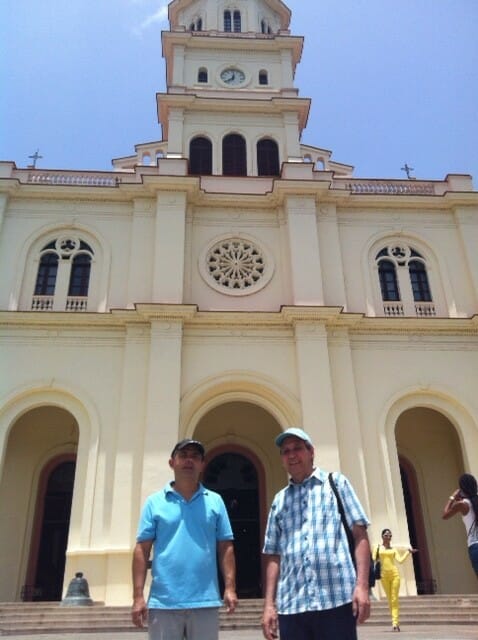
the National Shrine of the Virgin of Charity of Cobre
 The Focolare Movement’s contribution. The Focolare communities across the island are trying – together with the Church – to offer its own contribution, geared mainly towards formation in fraternity in opposition to the “throw-away culture”, to privileging those in most need, promoting unity in diversity and proposing dialogue as an indispensable method for peaceful coexistence in a multicultural society. Conclusion. The message of the Cuban Catholic Bishops concludes with a prayer to the Virgin of Charity, Mother of Cuba, the One whom we invoke as Mother and Queen of Mercy, that she might take maternal care of this longed-for visit. She who has accompanied our people in good times and in bad, may she obtain a great blessing from Heaven for Cuba and her children wherever they may be, whatever they may think or believe.” From an interview with correspondent Gustavo Clariá _____________________ [1] Castellano Dennys, Sergio L. and Monterrey, Fontanella. Sin pecado concebidas, La Caridad del Cobre en las artes visuales cubanas, (Havana: Editorial UH, 2014), p. 66. (Our translation.)
The Focolare Movement’s contribution. The Focolare communities across the island are trying – together with the Church – to offer its own contribution, geared mainly towards formation in fraternity in opposition to the “throw-away culture”, to privileging those in most need, promoting unity in diversity and proposing dialogue as an indispensable method for peaceful coexistence in a multicultural society. Conclusion. The message of the Cuban Catholic Bishops concludes with a prayer to the Virgin of Charity, Mother of Cuba, the One whom we invoke as Mother and Queen of Mercy, that she might take maternal care of this longed-for visit. She who has accompanied our people in good times and in bad, may she obtain a great blessing from Heaven for Cuba and her children wherever they may be, whatever they may think or believe.” From an interview with correspondent Gustavo Clariá _____________________ [1] Castellano Dennys, Sergio L. and Monterrey, Fontanella. Sin pecado concebidas, La Caridad del Cobre en las artes visuales cubanas, (Havana: Editorial UH, 2014), p. 66. (Our translation.)
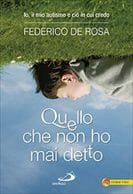
Aug 12, 2015 | Focolare Worldwide, Senza categoria
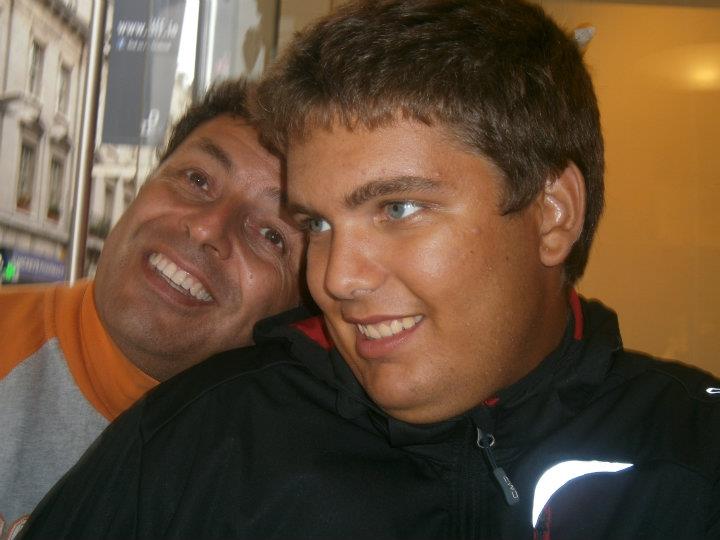
Federico with his Dad
 Now that he could write, his self-esteem grew, up to when he published a book Quello che non ho mai detto (“The words I have never said”) wherein, for the first time we can see the point of view of a boy who explains his syndrome with rare and precious observations. This is how he emerged from his isolation, and finally experienced the joy of sharing his emotions. He concluded his studies in science up to secondary school certificate stage. To this day, Federico says almost nothing. “I assure you,” he wrote, ” that I am almost unable to speak verbally. I express myself with single words, and only rarely with a small phrase. I can write only in big and shaky capital letters.” And thanks to the computer, for the first time he was able to play with a friend and attend, together with his classmates, the first year of secondary school, and years later, participate “actively” in the meetings of the confirmation group. “Little by little, ” he recounts, “my laptop became an inseparable companion. With my computer and the support of a qualified person at my side, I can express my views in every situation.” Today Federico studies percussion, has many friends, helps people with autism in their families with down to earth suggestions, and has a lot of plans for the future. “Now my life has found its course,” he wrote, “thanks to the operators who taught me how to use the system, and my parents who launched themselves in this adventure with enthusiasm. Today I am happy with my life, and a great part of the merit goes to them.” But he’s not thinking just of himself: “How many autistic people could have become other Federicos if diagnosed properly and given early intervention and been greatly loved and supported?”. His dream for the future? “I wish to travel the world to meet families with infants who have a communication disorder, to try and interact with these children and to treat autism accordingly. Whenever a child needs me, I’ll be there to help.” Source: Città Nuova online
Now that he could write, his self-esteem grew, up to when he published a book Quello che non ho mai detto (“The words I have never said”) wherein, for the first time we can see the point of view of a boy who explains his syndrome with rare and precious observations. This is how he emerged from his isolation, and finally experienced the joy of sharing his emotions. He concluded his studies in science up to secondary school certificate stage. To this day, Federico says almost nothing. “I assure you,” he wrote, ” that I am almost unable to speak verbally. I express myself with single words, and only rarely with a small phrase. I can write only in big and shaky capital letters.” And thanks to the computer, for the first time he was able to play with a friend and attend, together with his classmates, the first year of secondary school, and years later, participate “actively” in the meetings of the confirmation group. “Little by little, ” he recounts, “my laptop became an inseparable companion. With my computer and the support of a qualified person at my side, I can express my views in every situation.” Today Federico studies percussion, has many friends, helps people with autism in their families with down to earth suggestions, and has a lot of plans for the future. “Now my life has found its course,” he wrote, “thanks to the operators who taught me how to use the system, and my parents who launched themselves in this adventure with enthusiasm. Today I am happy with my life, and a great part of the merit goes to them.” But he’s not thinking just of himself: “How many autistic people could have become other Federicos if diagnosed properly and given early intervention and been greatly loved and supported?”. His dream for the future? “I wish to travel the world to meet families with infants who have a communication disorder, to try and interact with these children and to treat autism accordingly. Whenever a child needs me, I’ll be there to help.” Source: Città Nuova online
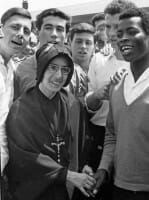
Aug 11, 2015 | Focolare Worldwide
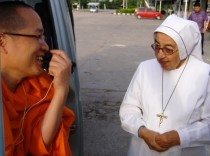 Several Buddhist monks that visited the focolare regularly also knew her well. Benedetta was a woman who let herself be approached and known, without fear and with gentleness. She knew how to welcome people and you could go to her any time. Any problem, great or small, any need, some good news to share: she wasn’t scandalised by anything, she knew people’s hearts and knew how to love them. One bishop once said of Sister Benedetta that she was “a Sister of silver and gold” because of all the money she was able to find for the poor. When visiting the extreme north of Thailand, you were always obliged to go and ‘have a chat’ with her, as she would say. She enjoyed hearing the news of her ‘great family’ as she loved to call the Movement, and she shared its life with many others. We would often meet people in the Mariapolis to whom she had spoken about the spirituality of unity, or else someone who had passed by the focolare to meet us because they had heard Sister Bene talk about us. In other words, Benedetta was a true spiritual mother who gave much supernatural life to so many people, and many of them attended her funeral along with a large crowd of bishops, priests and laity. The small church of Wien Pa Pao and the adjoining convent where she lived were filled to overflowing.
Several Buddhist monks that visited the focolare regularly also knew her well. Benedetta was a woman who let herself be approached and known, without fear and with gentleness. She knew how to welcome people and you could go to her any time. Any problem, great or small, any need, some good news to share: she wasn’t scandalised by anything, she knew people’s hearts and knew how to love them. One bishop once said of Sister Benedetta that she was “a Sister of silver and gold” because of all the money she was able to find for the poor. When visiting the extreme north of Thailand, you were always obliged to go and ‘have a chat’ with her, as she would say. She enjoyed hearing the news of her ‘great family’ as she loved to call the Movement, and she shared its life with many others. We would often meet people in the Mariapolis to whom she had spoken about the spirituality of unity, or else someone who had passed by the focolare to meet us because they had heard Sister Bene talk about us. In other words, Benedetta was a true spiritual mother who gave much supernatural life to so many people, and many of them attended her funeral along with a large crowd of bishops, priests and laity. The small church of Wien Pa Pao and the adjoining convent where she lived were filled to overflowing.  Sr Bene, of the Sisters of Charity of the Infant Mary, known to the secular world as Benedetta Carnovali, born in 1925, was a pillar of the Movement and many of the people who belong to the Focolare community of Thailand were personally drawn to the Movement by her (including Buddhists). ‘A real Sister and a true focolarina,’ as she was described by some: an ‘out-of-the-ordinary’ Sister, always on the go and, at the same time, ‘firm’ when personally loving the person next to her. She was a friend who would call you up to wish you a happy birthday, even though her voice became feebler every year, but not her interior strength. Whenever you approached her you were never given the impression that you had disturbed her: it was as if she had been expecting you alone and didn’t have anything else to do but welcome you. But she was quite busy, judging from all the adoptions at a distance which she personally saw to, up until the last days of her life. Sister Bene had met the Focolare’s spirituality of unity from an order priest in 1963, and from that moment spent her life that many in Myanmar – where she was living in that period and then in Thailand when all Religious were expelled by the regime – could know the spirituality and live it. When she was transferred to Thailand, she continued to deepen her friendship with the Focolare. When she went to spend a few days at the focolare, she nourished herself on the words of Chiara Lubich. Like all those who genuinely follow God, Sister Benedetta also encountered her nights, ‘the storm’ as she followed Jesus. She faced them as a true disciple of Jesus, with heroic charity. Deeply united with Vale Ronchetti, one of the first focolarine, she pressed on in the midst of much miscomprehension: ‘How can a nun belong to a movement with so many lay people in it?’ she was often asked; and there were other great and small persecutions that on a human level were completely absurd. Yet, in some mysterious way, God made use of these things to make Sister Benedetta more and more a Sister, more and more a spiritual daughter of Chiara (as Benedetta often said), and an apostle of unity who has no counterpart in the Asian southeast judging from the fruits she bore. She leaves a legacy of love, gentleness, sweetness and strength, loving service to the least: towards the people of the Akha tribe, for example. She leaves us withthat smile so typical of those who have experienced that it is possible to transform suffering in Love and make that Love their reason for living. Sister Benedetta ‘flew” to Heaven at the age of ninety, after listening to the Focolare song that she loved: ‘Solo grazie’. She died consumed but serene, just as she had always lived: in peace because she was certain that the ‘arms’ that had embraced her from her childhood (she was an orphan) and carried her through her life as a Religious, were there waiting for her now on this last stretch of her journey. She was a wonderful woman who shows that it is still possible to become a saint today. Luigi Butori
Sr Bene, of the Sisters of Charity of the Infant Mary, known to the secular world as Benedetta Carnovali, born in 1925, was a pillar of the Movement and many of the people who belong to the Focolare community of Thailand were personally drawn to the Movement by her (including Buddhists). ‘A real Sister and a true focolarina,’ as she was described by some: an ‘out-of-the-ordinary’ Sister, always on the go and, at the same time, ‘firm’ when personally loving the person next to her. She was a friend who would call you up to wish you a happy birthday, even though her voice became feebler every year, but not her interior strength. Whenever you approached her you were never given the impression that you had disturbed her: it was as if she had been expecting you alone and didn’t have anything else to do but welcome you. But she was quite busy, judging from all the adoptions at a distance which she personally saw to, up until the last days of her life. Sister Bene had met the Focolare’s spirituality of unity from an order priest in 1963, and from that moment spent her life that many in Myanmar – where she was living in that period and then in Thailand when all Religious were expelled by the regime – could know the spirituality and live it. When she was transferred to Thailand, she continued to deepen her friendship with the Focolare. When she went to spend a few days at the focolare, she nourished herself on the words of Chiara Lubich. Like all those who genuinely follow God, Sister Benedetta also encountered her nights, ‘the storm’ as she followed Jesus. She faced them as a true disciple of Jesus, with heroic charity. Deeply united with Vale Ronchetti, one of the first focolarine, she pressed on in the midst of much miscomprehension: ‘How can a nun belong to a movement with so many lay people in it?’ she was often asked; and there were other great and small persecutions that on a human level were completely absurd. Yet, in some mysterious way, God made use of these things to make Sister Benedetta more and more a Sister, more and more a spiritual daughter of Chiara (as Benedetta often said), and an apostle of unity who has no counterpart in the Asian southeast judging from the fruits she bore. She leaves a legacy of love, gentleness, sweetness and strength, loving service to the least: towards the people of the Akha tribe, for example. She leaves us withthat smile so typical of those who have experienced that it is possible to transform suffering in Love and make that Love their reason for living. Sister Benedetta ‘flew” to Heaven at the age of ninety, after listening to the Focolare song that she loved: ‘Solo grazie’. She died consumed but serene, just as she had always lived: in peace because she was certain that the ‘arms’ that had embraced her from her childhood (she was an orphan) and carried her through her life as a Religious, were there waiting for her now on this last stretch of her journey. She was a wonderful woman who shows that it is still possible to become a saint today. Luigi Butori
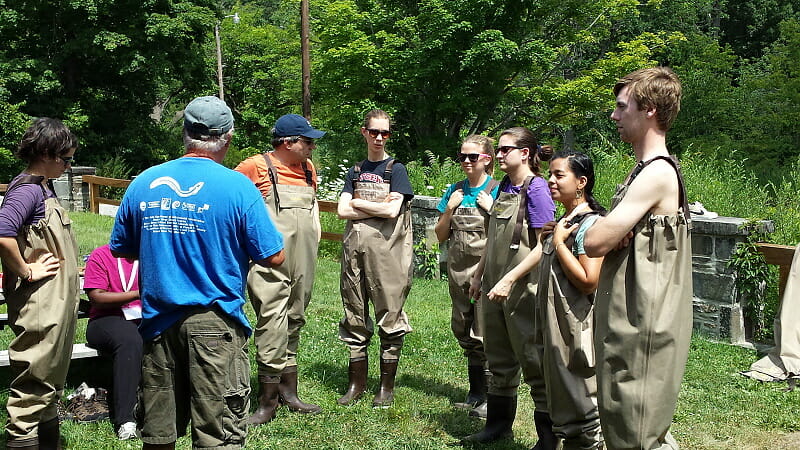
Aug 10, 2015 | Focolare Worldwide
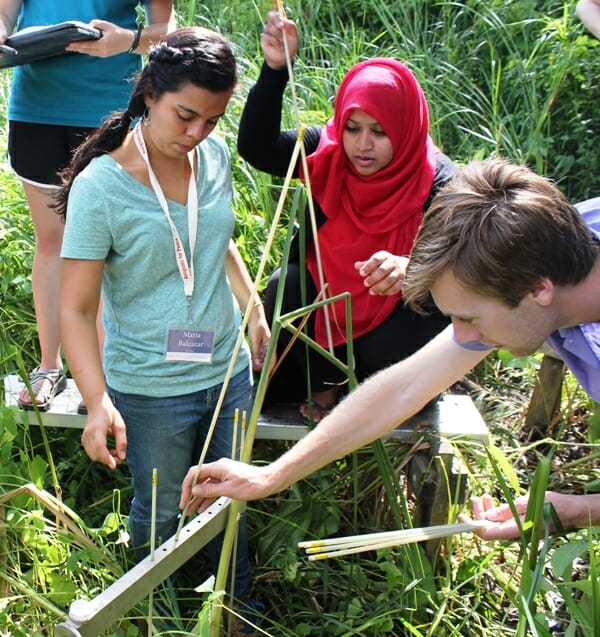 Young people from five religions and several Christian denomination, specifically chosen as emergent leaders in the environmental field, met at Mariapolis Luminosa of the Focolare in the State of New York, USA, to reflect on safeguarding the planet, our common home. Guided by the ideals of Religions for Peace (RFP) and of the Focolare the Teach-in began with an analysis of the current situation of the environment and the strong link between global stability and climate change. The phenomenon of climate change calls for a new awareness and change of view, implied by the title of the three-day event. Perhaps it will find a solution thanks to the synergy between people from different religious backgrounds. This was the wish of the organisers of Teach-in, which was held at the end of July 2015. Despite the variety of their beliefs they came to the same realisation that every effort in favor of the environment will be more efficacious inasmuch as it is done together. Amongst the interventions were those of Rev. Richard Cizik (New Evangelical Partnership) and of the Rabbi Lawrence Troster, bioethicist who said that: “By 2050 we could have 50 million climate refugees, with serious consequences for peaceful coexistence amongst peoples.” His words were echoed by Asma Mahdi, oceanographer and member of Green Muslims, highlighting that the most vulnerable countries are Muslim: “In Bangladesh, for example, if the ocean level continues to rise, by 2050, 17% of the territory will be awash, forcing 18 million people to move elsewhere.” These are alarming figures, and several Polynesian islands would completely submerged.
Young people from five religions and several Christian denomination, specifically chosen as emergent leaders in the environmental field, met at Mariapolis Luminosa of the Focolare in the State of New York, USA, to reflect on safeguarding the planet, our common home. Guided by the ideals of Religions for Peace (RFP) and of the Focolare the Teach-in began with an analysis of the current situation of the environment and the strong link between global stability and climate change. The phenomenon of climate change calls for a new awareness and change of view, implied by the title of the three-day event. Perhaps it will find a solution thanks to the synergy between people from different religious backgrounds. This was the wish of the organisers of Teach-in, which was held at the end of July 2015. Despite the variety of their beliefs they came to the same realisation that every effort in favor of the environment will be more efficacious inasmuch as it is done together. Amongst the interventions were those of Rev. Richard Cizik (New Evangelical Partnership) and of the Rabbi Lawrence Troster, bioethicist who said that: “By 2050 we could have 50 million climate refugees, with serious consequences for peaceful coexistence amongst peoples.” His words were echoed by Asma Mahdi, oceanographer and member of Green Muslims, highlighting that the most vulnerable countries are Muslim: “In Bangladesh, for example, if the ocean level continues to rise, by 2050, 17% of the territory will be awash, forcing 18 million people to move elsewhere.” These are alarming figures, and several Polynesian islands would completely submerged. 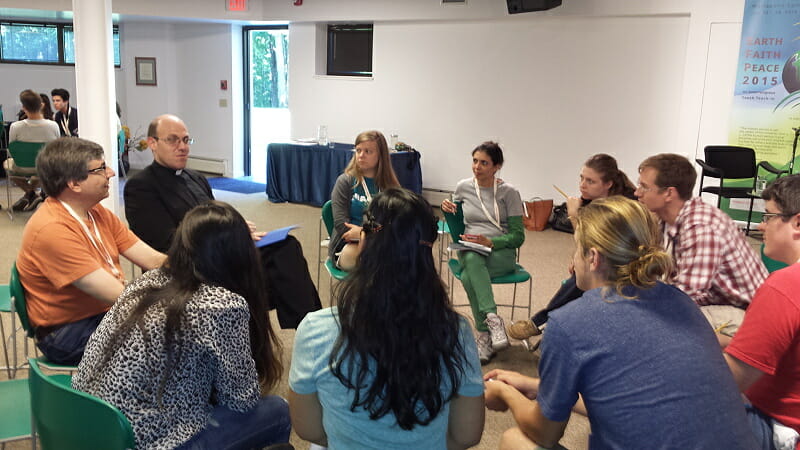 Amongst the speakers was Msgr. Joseph Grech from the Permanent Observer Mission of the Holy See to the United Nations, who referred to several excerpts from Pope Francis’s Encyclical Letter Laudato si while underscoring how economy and ecology walk hand in hand, since all our actions have an impact on nature. Three environmental researchers from three different American universities were of the same opinon: Robert Yantosca (Harvard), Valentine Nzengung (Georgia) and Tasrunji Singh (Ohio), for whom the respective religious convictions have become motivating factors and guides in the scientific effort in favour of the environment.
Amongst the speakers was Msgr. Joseph Grech from the Permanent Observer Mission of the Holy See to the United Nations, who referred to several excerpts from Pope Francis’s Encyclical Letter Laudato si while underscoring how economy and ecology walk hand in hand, since all our actions have an impact on nature. Three environmental researchers from three different American universities were of the same opinon: Robert Yantosca (Harvard), Valentine Nzengung (Georgia) and Tasrunji Singh (Ohio), for whom the respective religious convictions have become motivating factors and guides in the scientific effort in favour of the environment.  “Go out!” was the catch phrase that conducted the second part of the Teach-in and it led to the delineation of a series of behaviours to put into practice. John Mundell from the Focolare, owner of a company of environmental consultants, presented a landscape of initiatives connected to the “Earth Cube,” whose six sides present daily suggestions for renewing and conserving a healthy environment. There was also the visit to the projects at the nearby Esaurine Federal Reserve. RFP executive Aaron Stauffer, stated at the conclusion: “It has been a witness of the power of multireligious cooperation and peace.” And Brazilian, Lira Raiana, who is finishing her doctorate in ecology: “We’ve experienced that we have at least two things in common: an intense interest in sustainability of the planet and a religious belief that offers the correct motivations to take care of it. Each one of us came with our convictions and personal ideas and now we find ourselves united in the common objective of many: the protection of the earth and of its inhabitants.”
“Go out!” was the catch phrase that conducted the second part of the Teach-in and it led to the delineation of a series of behaviours to put into practice. John Mundell from the Focolare, owner of a company of environmental consultants, presented a landscape of initiatives connected to the “Earth Cube,” whose six sides present daily suggestions for renewing and conserving a healthy environment. There was also the visit to the projects at the nearby Esaurine Federal Reserve. RFP executive Aaron Stauffer, stated at the conclusion: “It has been a witness of the power of multireligious cooperation and peace.” And Brazilian, Lira Raiana, who is finishing her doctorate in ecology: “We’ve experienced that we have at least two things in common: an intense interest in sustainability of the planet and a religious belief that offers the correct motivations to take care of it. Each one of us came with our convictions and personal ideas and now we find ourselves united in the common objective of many: the protection of the earth and of its inhabitants.”
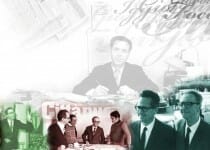
Aug 9, 2015 | Non categorizzato
 «Working in the fields, and taking care of the life of the plants, in an immense silence marked by the solar and lunar cycles, and sharing the work of creation of natural life, are also like priestly tasks, and call for concentration and sacrifice: the courage to tune in with one’s own soul, and be one with the expectation of the universe, in contact with nature which is a miraculous nursery, feeling oneself, without fainting, in the presence of God.» (FIDES, July 1938) « Man needs beauty and purity that surpasses human ideals in order to rise up to the contemplation of Mary. She was the one who lifted him up: in contemplating this, the most beautiful aspirations of the soul blossomed, and tried to capture through expressions of art, the highest ever achieved. Maternity is womanly tenderness, the most beautiful passion, the moment wherein one is able to lift oneself beyond brutality, through a surge of divinization.» (FIDES, March 1938) «The Christian revolution came about without conspiracy and did not overturn institutions, nor did it kill tyrants, but penetrated into the obsolete organisations of the old world, into the worn family, in the decrepit juridical institutes, and into social relationships intoxicated by lust. It was love that was stirring up again, to regenerate all and by which suddenly, slaves were able to transform themselves before their masters, and woman assumed a new value in the eyes of man, and heathens and labourers bridged the immense gap between them and the Greeks and Romans. ». (FIDES, February 1943 «The aware Christian – the saint – is one who uses his time carefully and is able to achieve a lot in a short time, to honour the Head of the house, for the common good and wellbeing of his brethren. This activity and ability, in the current language is called apostolate. A Christian that does not act in the manner and time assigned, is a Christian who ignores his role in the Church: he is unaware of the Church that lives because it acts and produces action. We say it produces Catholic action. In a thousand ways, all are involved. A poet can do it and likewise a half wit, a hermit and a monk, the head of a family and a department head, the city wayfarer and the cobbler in his workshop. ». (FIDES, October 1938) Source: Igino Giordani Centre
«Working in the fields, and taking care of the life of the plants, in an immense silence marked by the solar and lunar cycles, and sharing the work of creation of natural life, are also like priestly tasks, and call for concentration and sacrifice: the courage to tune in with one’s own soul, and be one with the expectation of the universe, in contact with nature which is a miraculous nursery, feeling oneself, without fainting, in the presence of God.» (FIDES, July 1938) « Man needs beauty and purity that surpasses human ideals in order to rise up to the contemplation of Mary. She was the one who lifted him up: in contemplating this, the most beautiful aspirations of the soul blossomed, and tried to capture through expressions of art, the highest ever achieved. Maternity is womanly tenderness, the most beautiful passion, the moment wherein one is able to lift oneself beyond brutality, through a surge of divinization.» (FIDES, March 1938) «The Christian revolution came about without conspiracy and did not overturn institutions, nor did it kill tyrants, but penetrated into the obsolete organisations of the old world, into the worn family, in the decrepit juridical institutes, and into social relationships intoxicated by lust. It was love that was stirring up again, to regenerate all and by which suddenly, slaves were able to transform themselves before their masters, and woman assumed a new value in the eyes of man, and heathens and labourers bridged the immense gap between them and the Greeks and Romans. ». (FIDES, February 1943 «The aware Christian – the saint – is one who uses his time carefully and is able to achieve a lot in a short time, to honour the Head of the house, for the common good and wellbeing of his brethren. This activity and ability, in the current language is called apostolate. A Christian that does not act in the manner and time assigned, is a Christian who ignores his role in the Church: he is unaware of the Church that lives because it acts and produces action. We say it produces Catholic action. In a thousand ways, all are involved. A poet can do it and likewise a half wit, a hermit and a monk, the head of a family and a department head, the city wayfarer and the cobbler in his workshop. ». (FIDES, October 1938) Source: Igino Giordani Centre

Aug 8, 2015 | Focolare Worldwide
 Geneva, Switzerland, Rue de Montbrillant, n. 3. Like every other Friday I go to Jardin de Montbrillant, a welcome centre for needy people in this cosmopolitan city where you can have a free hot meal. Today, as always, at noontime, we welcome around 150 people of every nationality. The room is already full and everything is going fine. Amidst the usual faces in the diverse crowd I always notice someone new. My task is to find a place for each of them, to negotiate with one or another so that they will allow someone new to have a place to sit and eat in peace, which isn’t always easy given the physical and psychological state of many of the majority of our guests. But I’m mainly interested in giving a fraternal touch, to comfort the ones who are sad, depressed – to listen to the ones who feel desperate, to offer them some hope. . . In other words, to create a family atmosphere so that everyone feels loved just the way they are, beyond the diversity of ages, nationalities and religions. While we’re at table, the door opens and three of our Arab friends arrive accompanied by two newcomers. I immediately notice the hard, threatening looks on their faces. As soon as they are inside, they begin shouting that they want to massacre everyone and burn the place to the ground. The reason: they feel seriously offended by the caricatures of the Prophet that appeared previous days in the press, the main news of the week. The atmosphere immediately becomes tense and people propose violence. I already see plates flying and fists showering down blows. It’s time to act without delay, because the situation could quickly worsen. But what shall I say? What shall I do? I feel powerless but recognise in this acute suffering of today’s society that defends absolute freedom at the expense of deep values, the cry of the God-Man upon the Cross: “My God, my God, why have you abandoned me?” This is Him before me now, through the reaction of this pair of Muslim followers. I place everything in His hands and stand up to go and meet them. I tell them that I share their pain and offer to talk about it after having something to eat if they would care to. In answer to my peaceful offer they allow themselves to be convinced to take a place at table. Suddenly their aggressiveness abates and tranquility returns, as if everyone perfectly understood the cause of their angry outburst. Lunch ends peacefully. I stay near them, trying to make them feel all the human warmth that I’m capable of. After lunch they apologize for their words and express regret for having voiced thoughts of revenge. This is followed by a moment of sharing about our respective faiths in total respect and mutual understanding. Before leaving, they embrace me, thankful for having been listened to. Now their relaxed faces express different sentiments than before. (Paquita Nosal – Geneva, Switzerland) Source: Città Nuova, 13/14, (2015).
Geneva, Switzerland, Rue de Montbrillant, n. 3. Like every other Friday I go to Jardin de Montbrillant, a welcome centre for needy people in this cosmopolitan city where you can have a free hot meal. Today, as always, at noontime, we welcome around 150 people of every nationality. The room is already full and everything is going fine. Amidst the usual faces in the diverse crowd I always notice someone new. My task is to find a place for each of them, to negotiate with one or another so that they will allow someone new to have a place to sit and eat in peace, which isn’t always easy given the physical and psychological state of many of the majority of our guests. But I’m mainly interested in giving a fraternal touch, to comfort the ones who are sad, depressed – to listen to the ones who feel desperate, to offer them some hope. . . In other words, to create a family atmosphere so that everyone feels loved just the way they are, beyond the diversity of ages, nationalities and religions. While we’re at table, the door opens and three of our Arab friends arrive accompanied by two newcomers. I immediately notice the hard, threatening looks on their faces. As soon as they are inside, they begin shouting that they want to massacre everyone and burn the place to the ground. The reason: they feel seriously offended by the caricatures of the Prophet that appeared previous days in the press, the main news of the week. The atmosphere immediately becomes tense and people propose violence. I already see plates flying and fists showering down blows. It’s time to act without delay, because the situation could quickly worsen. But what shall I say? What shall I do? I feel powerless but recognise in this acute suffering of today’s society that defends absolute freedom at the expense of deep values, the cry of the God-Man upon the Cross: “My God, my God, why have you abandoned me?” This is Him before me now, through the reaction of this pair of Muslim followers. I place everything in His hands and stand up to go and meet them. I tell them that I share their pain and offer to talk about it after having something to eat if they would care to. In answer to my peaceful offer they allow themselves to be convinced to take a place at table. Suddenly their aggressiveness abates and tranquility returns, as if everyone perfectly understood the cause of their angry outburst. Lunch ends peacefully. I stay near them, trying to make them feel all the human warmth that I’m capable of. After lunch they apologize for their words and express regret for having voiced thoughts of revenge. This is followed by a moment of sharing about our respective faiths in total respect and mutual understanding. Before leaving, they embrace me, thankful for having been listened to. Now their relaxed faces express different sentiments than before. (Paquita Nosal – Geneva, Switzerland) Source: Città Nuova, 13/14, (2015).
Aug 7, 2015 | Non categorizzato
https://vimeo.com/131558378
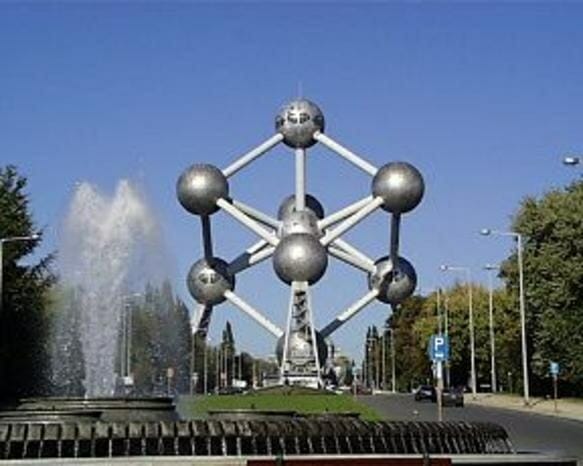
Aug 6, 2015 | Senza categoria
 Extracts from Chiara Lubich’s editorial dated 20 April 1958 in which she colourfully describes her impressions of Expo ’58 held in Brussels. She visited it during springtime of that year while she was in Belgium for Holy Week. The Focolare Movement had just started to go beyond the Italian Alps and to reach the heart of Europe. Evidently that visit had a profound effect on her: “On 17 April 1958, the International Exhibition in Brussels was opened. […] It’s something truly colossal! […] The most prominent nations from all five continents are competing to show off their foremost talents. […] Seeing these most amazing structures and ever new styles, one discovers the brilliant new ideas of our century, whether in shapes that are graceful or bold, narrow, transparent or sturdy; sometimes in the form of a cube or a sphere or a cylinder, with expressions of folklore and of religion too. They are real masterpieces, unknown to most of us until now, and each one bears the hallmark of its people, of its tradition, of its own taste. […] The pavilion that drew our attention in a special way however was the one set up by the Holy See. It stands almost opposite the Soviet pavilion and next to the American one. Its name is “Civitas Dei” (City of God). At its heart there is a church which is simple and harmonious in style, maybe because it is so rich in content; it is very elegant and extremely modern. […] Underneath this stands an altar where Mass will be continuously celebrated. […] So it is the living Jesus, who continues to sacrifice himself for everyone, and the word of truth of a King who is not of this world, which are the riches put on show in Brussels by the “City of God”, whereas nearby, among other things there are an atomic ice-breaker, Sputnik II and a huge statue of Lenin that fill the Soviet Pavilion. A blow up theatre and many expressions of modern art and folklore fill the American Pavilion. Yes, Jesus is at the Brussels Exhibition, just as one day Jesus was at the marriage-feast at Cana. The Son of Man does not disdain to get involved in all human activities, and through the harmonious peal of the bells he will give a reminder of what is eternal and divine to all those who gather there, to exalt the talents of all the peoples He created. It is Jesus who dies on the altar for everyone, also for those who don’t care about him, who are perhaps filled with pride in their knowledge and their discoveries, or who may even fight against him. It is Jesus who still teaches the Truth through those of whom he said: “Whoever listens to you listens to me”. These are the gifts and the “produce” of the Catholic Church which continues Him. Jesus in the Eucharist is the fruit of the Church, just as in the past Jesus of Nazareth was the fruit of the most pure womb of the Virgin Mary. And there at Expo ‘58 as in every church of ours, Jesus will try to quench people’s thirst for light, love, courage and strength. Jesus makes himself known, or rather he shows his tangible love. He offers himself to save people there too, where everything speaks of atomic energy, technology, inventions, and newness. He is the greatest new thing, the eternal discovery who is never discovered. He is the One who will remain, even when in future centuries no one will remember much about the exhibition in Brussels, just as no one today knows the names of the couple married at Cana. He is there so as not to let us down, so as to fill the emptiness that will be created in many people – despite the “showing off” of the most beautiful treasures of our day – when they experience the vanity of everything, even of all that is great, but is not rooted in God. Chiara Lubich Read more: Chiara Lubich Center
Extracts from Chiara Lubich’s editorial dated 20 April 1958 in which she colourfully describes her impressions of Expo ’58 held in Brussels. She visited it during springtime of that year while she was in Belgium for Holy Week. The Focolare Movement had just started to go beyond the Italian Alps and to reach the heart of Europe. Evidently that visit had a profound effect on her: “On 17 April 1958, the International Exhibition in Brussels was opened. […] It’s something truly colossal! […] The most prominent nations from all five continents are competing to show off their foremost talents. […] Seeing these most amazing structures and ever new styles, one discovers the brilliant new ideas of our century, whether in shapes that are graceful or bold, narrow, transparent or sturdy; sometimes in the form of a cube or a sphere or a cylinder, with expressions of folklore and of religion too. They are real masterpieces, unknown to most of us until now, and each one bears the hallmark of its people, of its tradition, of its own taste. […] The pavilion that drew our attention in a special way however was the one set up by the Holy See. It stands almost opposite the Soviet pavilion and next to the American one. Its name is “Civitas Dei” (City of God). At its heart there is a church which is simple and harmonious in style, maybe because it is so rich in content; it is very elegant and extremely modern. […] Underneath this stands an altar where Mass will be continuously celebrated. […] So it is the living Jesus, who continues to sacrifice himself for everyone, and the word of truth of a King who is not of this world, which are the riches put on show in Brussels by the “City of God”, whereas nearby, among other things there are an atomic ice-breaker, Sputnik II and a huge statue of Lenin that fill the Soviet Pavilion. A blow up theatre and many expressions of modern art and folklore fill the American Pavilion. Yes, Jesus is at the Brussels Exhibition, just as one day Jesus was at the marriage-feast at Cana. The Son of Man does not disdain to get involved in all human activities, and through the harmonious peal of the bells he will give a reminder of what is eternal and divine to all those who gather there, to exalt the talents of all the peoples He created. It is Jesus who dies on the altar for everyone, also for those who don’t care about him, who are perhaps filled with pride in their knowledge and their discoveries, or who may even fight against him. It is Jesus who still teaches the Truth through those of whom he said: “Whoever listens to you listens to me”. These are the gifts and the “produce” of the Catholic Church which continues Him. Jesus in the Eucharist is the fruit of the Church, just as in the past Jesus of Nazareth was the fruit of the most pure womb of the Virgin Mary. And there at Expo ‘58 as in every church of ours, Jesus will try to quench people’s thirst for light, love, courage and strength. Jesus makes himself known, or rather he shows his tangible love. He offers himself to save people there too, where everything speaks of atomic energy, technology, inventions, and newness. He is the greatest new thing, the eternal discovery who is never discovered. He is the One who will remain, even when in future centuries no one will remember much about the exhibition in Brussels, just as no one today knows the names of the couple married at Cana. He is there so as not to let us down, so as to fill the emptiness that will be created in many people – despite the “showing off” of the most beautiful treasures of our day – when they experience the vanity of everything, even of all that is great, but is not rooted in God. Chiara Lubich Read more: Chiara Lubich Center
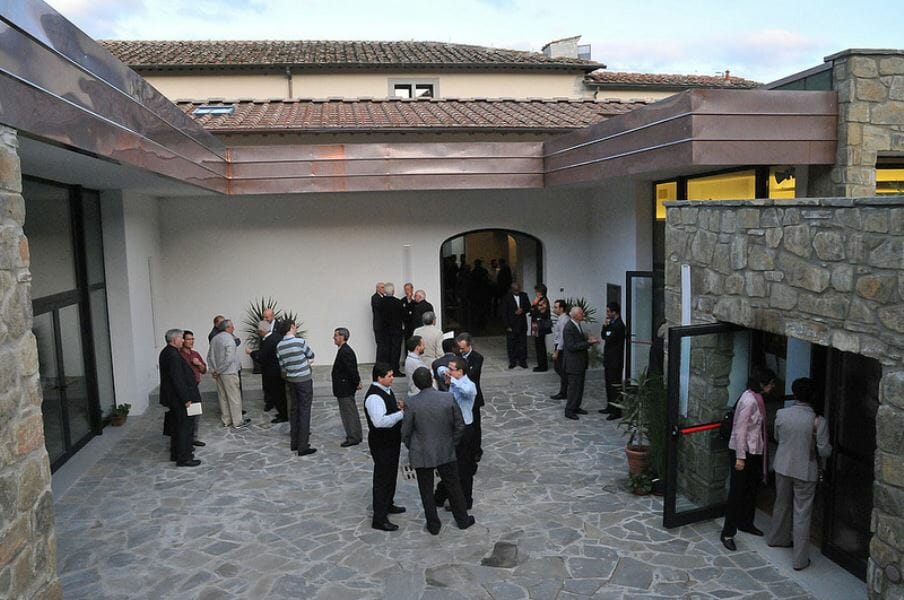
Aug 5, 2015 | Non categorizzato
 The 2014-2015 Course for Seminary Educators that ended in Loppiano, was attended by around 20 priests from Brazil, Kenya, Nigeria, Tanzania, Indonesia, Thailand, Italy, Holland, Spain and Malta. “In giving a comprehensive assessment of the course, I think I can say that the objective of enlightening the world of education in seminaries with the charism of unity was substantially fulfilled.” Some of the participants shared their impressions: “Attending the course has made me focus on the significance and value of my ecclesial service as an educator, especially within the perspective of the Church as communion, and also because of the fact that the Church of the future depends on the type of education given in seminaries.” “This course challenged me to live this model of life we contemplated on together and let myself be moulded by the circumstances and by my brethren, and change my way of praying and thinking. I will keep in contact spiritually and try as much as possible to concretely keep up a direct dialogue with the team that has promoted this event, and also with all the participants.” The course structure was divided into four weeks within a two-year period. The second half which was held this year dealt with the concrete aspects of education, divided into seven major parts: The Gift of oneself and communion; Openness toward the other: dialogue and testimonials; Union with God: interiority and sanctification; Life and the mystical body and corporeality; Personal harmony and building the community; Wisdom, studies and culture; and Communication and media at the service of communion. The course was guided by the keywords: prayer-life-thought. It successfully achieved the mutual involvement of participants and course supervisors. Similar courses were also held in Bangkok in 2013, with around 60 participants from Southeast Asian countries. Other similar courses have been programmed to be held in the Philippines, Kenya, Ivory Coast, Brazil and Colombia. Over the last eight years, there has been a total participation of about 200 seminary educators from about 30 countries of the four continents.
The 2014-2015 Course for Seminary Educators that ended in Loppiano, was attended by around 20 priests from Brazil, Kenya, Nigeria, Tanzania, Indonesia, Thailand, Italy, Holland, Spain and Malta. “In giving a comprehensive assessment of the course, I think I can say that the objective of enlightening the world of education in seminaries with the charism of unity was substantially fulfilled.” Some of the participants shared their impressions: “Attending the course has made me focus on the significance and value of my ecclesial service as an educator, especially within the perspective of the Church as communion, and also because of the fact that the Church of the future depends on the type of education given in seminaries.” “This course challenged me to live this model of life we contemplated on together and let myself be moulded by the circumstances and by my brethren, and change my way of praying and thinking. I will keep in contact spiritually and try as much as possible to concretely keep up a direct dialogue with the team that has promoted this event, and also with all the participants.” The course structure was divided into four weeks within a two-year period. The second half which was held this year dealt with the concrete aspects of education, divided into seven major parts: The Gift of oneself and communion; Openness toward the other: dialogue and testimonials; Union with God: interiority and sanctification; Life and the mystical body and corporeality; Personal harmony and building the community; Wisdom, studies and culture; and Communication and media at the service of communion. The course was guided by the keywords: prayer-life-thought. It successfully achieved the mutual involvement of participants and course supervisors. Similar courses were also held in Bangkok in 2013, with around 60 participants from Southeast Asian countries. Other similar courses have been programmed to be held in the Philippines, Kenya, Ivory Coast, Brazil and Colombia. Over the last eight years, there has been a total participation of about 200 seminary educators from about 30 countries of the four continents.

Aug 3, 2015 | Focolare Worldwide, Senza categoria
 Baobab is one of many refugees welcoming centers, near the Tiburtina train station. It welcomes some 400 young Eritrean, Somali and Sudanese Christians and Muslims. “There’s a warm, happy chaotic and rather anarchical volunteer service – says S. – everyone goes, sees what is needed, helps, calls friends . . . And it works just fine! With the consent of the people in charge of the Food Bank of Rome, together with a young woman who coordinates the volunteers from the Baobab Centre, we went to Fiano Romano and packed twenty tons of excellent food (pasta, sugar, canned meats, 600 yogurts, cases of oil, 120 pineapples, 30 cases of fresh fish and nectarines, 100 pieces of parmesan cheese, and much more). By ten o’clock it was already 40°C (104°F)! We got to the centre at around 13:00, where we found at least 500 quite organised and patient Eritrean youngsters, all of them from those notorious boats that we see on the television news. The temperature was at least 42°C by then. In the span of ten minutes or so, the children formed a queue, and began to unload an overpacked van. Not a single yogurt or drink was taken, and everything was carefully placed in its proper place. Then they all entered the queue for lunch. I was also served a plate, which I was happy to share with them. The welcome centre does not only focus on assistance, but especially on involving and integrating the refugees. This ensures that the individual dignity of each person will be respected and that each of them is welcomed and accepted. Many of them then contact relatives and friends in other European countries. The long line of Roman citizens who bring all sorts of help is constant and also quite moving. So much assistance arrives that we often take boxes of supplies to other assistance centres. As I was there shaking hands and meeting people, the first baby was born to a young refugee woman who had been taken in by the centre. She had just arrived from the hospital, 20 days old. Doctors, nurses, volunteers all gathered around her for a smile, hoping to get a glimpse of her face. It showed how life goes on. I returned home more tired and sweaty than I ever have before. . . but in my heart and soul there was a unique and quite special joy, such tangible serenity, the true recompense for a small gesture toward those beautiful people whom everyone is calling “refugees”. . . At the end of the month we’re already planning on taking another load of supplies. Moreover, through a friend whose family runs five supermarkets, we were able to organize regular food pick-ups of products whose expiration dates would soon expire but could be consumed within a few days at the welcome centre. I thank the Eritrean refugees and volunteers at the Baobab Camp for having given me the opportunity to live a truly beautiful and precious moment, which I am sure will happen again in the coming days and in the future. I feel so privileged, and I truly am!” (S.D. Italy)
Baobab is one of many refugees welcoming centers, near the Tiburtina train station. It welcomes some 400 young Eritrean, Somali and Sudanese Christians and Muslims. “There’s a warm, happy chaotic and rather anarchical volunteer service – says S. – everyone goes, sees what is needed, helps, calls friends . . . And it works just fine! With the consent of the people in charge of the Food Bank of Rome, together with a young woman who coordinates the volunteers from the Baobab Centre, we went to Fiano Romano and packed twenty tons of excellent food (pasta, sugar, canned meats, 600 yogurts, cases of oil, 120 pineapples, 30 cases of fresh fish and nectarines, 100 pieces of parmesan cheese, and much more). By ten o’clock it was already 40°C (104°F)! We got to the centre at around 13:00, where we found at least 500 quite organised and patient Eritrean youngsters, all of them from those notorious boats that we see on the television news. The temperature was at least 42°C by then. In the span of ten minutes or so, the children formed a queue, and began to unload an overpacked van. Not a single yogurt or drink was taken, and everything was carefully placed in its proper place. Then they all entered the queue for lunch. I was also served a plate, which I was happy to share with them. The welcome centre does not only focus on assistance, but especially on involving and integrating the refugees. This ensures that the individual dignity of each person will be respected and that each of them is welcomed and accepted. Many of them then contact relatives and friends in other European countries. The long line of Roman citizens who bring all sorts of help is constant and also quite moving. So much assistance arrives that we often take boxes of supplies to other assistance centres. As I was there shaking hands and meeting people, the first baby was born to a young refugee woman who had been taken in by the centre. She had just arrived from the hospital, 20 days old. Doctors, nurses, volunteers all gathered around her for a smile, hoping to get a glimpse of her face. It showed how life goes on. I returned home more tired and sweaty than I ever have before. . . but in my heart and soul there was a unique and quite special joy, such tangible serenity, the true recompense for a small gesture toward those beautiful people whom everyone is calling “refugees”. . . At the end of the month we’re already planning on taking another load of supplies. Moreover, through a friend whose family runs five supermarkets, we were able to organize regular food pick-ups of products whose expiration dates would soon expire but could be consumed within a few days at the welcome centre. I thank the Eritrean refugees and volunteers at the Baobab Camp for having given me the opportunity to live a truly beautiful and precious moment, which I am sure will happen again in the coming days and in the future. I feel so privileged, and I truly am!” (S.D. Italy)
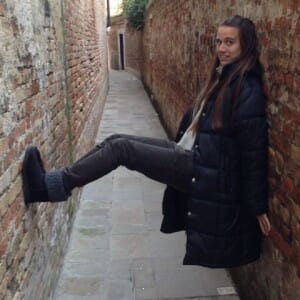
Aug 1, 2015 | Focolare Worldwide
 By the end of 2012 I had an awful experience. I was in a friend’s house with all his family and suddenly three armed and violent men entered their house to rob. They beat us and put us all lying down in the ground of his parents’ room. Then, they started interrogating us and shouting us “where is the money?” with guns in our heads… The father of my friend started saying to one of the thieves that he forgave him, but that was not the way he was supposed to act. The man was getting angry and we were afraid he would do something awful to my friend’s father. Surprisingly, the thief started crying and saying sorry. At that point, all the other thieves were gone with the family car, but this man, who seemed to be their boss, was still there with us. Amazingly he asked my friend’s father if there was something important, so that he would make sure we would get it back. My friend’s father told him that it was ok to take everything with him, but asked him the favour to return the car since he needed it for work. The thief promised to give it back, asked forgiveness to each one of us and left. The car, half an hour later, was found intact by the police. In order to build peace, I needed to forgive, and even if the thief asked for forgiveness, I didn’t quite feel like I could do it, my part was not completed. The fact of having felt powerless in front of a person that could take my life away or the life of people I love, just by a single movement of a finger, made me incapable of forgiving. And also, in front of the eyes of my other friends, they would say I had the right to hate, the right to be angry. I needed time, but I also needed to do something concrete to make sure I’d do my part to understand the root of so much violence, why would a person do something like that to another. So I decided, with other friends that are Youth for a United World (Y4UW), to start going to a shelter of men that have nothing. We wanted to at least start breaking the prejudices, sharing the pain and the difficulties of those who live in the peripheries. We are not politicians and we can’t do huge changes, but like one of my friends, Carolina, said: “I think that these small acts can help change the world, or at least, the reality next to me. Maybe at first sight it’s not visible, but you see the measure of your acts when the other makes you see it”. The moments shared with the men at the shelter helped me know about the “reasons” of that thief’s desperation. Thanks to having met these men of the street, that have, some of them, in fact robbed sometime, I knew they did it because they thought it was their last resource. I don’t know what I would do if people act like I don’t exist, if people don’t even answer me, if no one looks at me directly into my eyes and I have literally nothing and no one even cares… so then I felt that I had to forgive… and then I felt strongly that I was putting a brick on the construction of peace in my country. It’s simple, every Saturday we play games or play the guitar or we watch a football match (the World Cup was awesome) or even we play football together, then we have dinner and we get to know each other more, specially their stories, some of which are actually incredible, they are people that just need the strength to forgive others and themselves, but more than anything, they need to restart their lives. A group of specialists helps them progress, but us Y4UW have another role, as one of my mates, Francisco, tells “we grow next to them and we never stop making them feel our care, which is always mutual”. On December of 2013 the police in my city decided to do a strike and people went crazy and started looping businesses and shops and even the storage of a big charity organization was emptied. Lots of people were violently robbed and people started defending themselves with the help of their neighbors and it was like a small day of war between our people. The next day, after a terrible night of chaos, with other Y4UW we decided spontaneously to go clean the city, especially downtown where there were more ashes and dirt and to gather food for the charity organization. We said it all over the social networks and the media: at the beginning there were 15 of us, and then we ended up being more than 100 (and the people who brought food were even more). https://www.youtube.com/watch?v=9WX_TbWHvVw&feature=youtu.be We realized that the TV news, that night, had at least one good news to talk about thanks to our initiative (because the media came to cover our actions) and a lot of people saw it. But that was not the only “good news”, because thanks to the food we gathered, the kids of a small kindergarten in a very poor neighborhood could eat. The kindergarten’s name is “The Light corner”. From that, a group of Y4UW didn’t want to finish there. As we continued to go to the men shelter, others decided to do something more for the kindergarten, so they started a project. First thing they did was to celebrate Christmas with them, playing with them, doing a live nativity scene and taking presents for the kids. Then they started thinking how to improve the facilities of this very small and poor place. In the meanwhile, they suffered a robbery of some construction materials and then all of us Y4UW, with the help of friends from University and work and families, we cooked and sold sweet cakes to make money to buy back the materials. Then with everyone’s help we gathered educational material, games and curtains for the windows, to also make more beautiful the space for the kids. One of the nicest things they live is what Caro, the Y4UW that leads the project says: “the relationship between us and the kids, their mothers, the teachers and the neighborhood has grown so much that we have become a family, where we share also our personal needs. One of the teachers, for example, is pregnant and she asked me for help because she couldn’t pay for a baby stroller. After sharing this necessity with a friend of mine from work, she decided to give the teacher the one she had at home, it was in great conditions and the nicest thing was that she decided to go and give it personally to her”. They have organized a dental hygiene workshop, an orchard workshop and also they did another Christmas celebration last year with new toys, donated by a Chapel of a city very near from ours. The next projects are to build bathrooms and to remake the electric wiring. Like my friend Caro said: “love is thirsty of love, love spreads in our hearts… and love “makes us cry with the neighbor” (like Pope Francis said in the Philippines). ‘The Light Corner’ gave me the chance to dream bigger and to believe we have all the hands that we need next to us, in our surroundings: family, work, university and friends, to make things go ahead. We just need to make the first step”. Source: United World Project
By the end of 2012 I had an awful experience. I was in a friend’s house with all his family and suddenly three armed and violent men entered their house to rob. They beat us and put us all lying down in the ground of his parents’ room. Then, they started interrogating us and shouting us “where is the money?” with guns in our heads… The father of my friend started saying to one of the thieves that he forgave him, but that was not the way he was supposed to act. The man was getting angry and we were afraid he would do something awful to my friend’s father. Surprisingly, the thief started crying and saying sorry. At that point, all the other thieves were gone with the family car, but this man, who seemed to be their boss, was still there with us. Amazingly he asked my friend’s father if there was something important, so that he would make sure we would get it back. My friend’s father told him that it was ok to take everything with him, but asked him the favour to return the car since he needed it for work. The thief promised to give it back, asked forgiveness to each one of us and left. The car, half an hour later, was found intact by the police. In order to build peace, I needed to forgive, and even if the thief asked for forgiveness, I didn’t quite feel like I could do it, my part was not completed. The fact of having felt powerless in front of a person that could take my life away or the life of people I love, just by a single movement of a finger, made me incapable of forgiving. And also, in front of the eyes of my other friends, they would say I had the right to hate, the right to be angry. I needed time, but I also needed to do something concrete to make sure I’d do my part to understand the root of so much violence, why would a person do something like that to another. So I decided, with other friends that are Youth for a United World (Y4UW), to start going to a shelter of men that have nothing. We wanted to at least start breaking the prejudices, sharing the pain and the difficulties of those who live in the peripheries. We are not politicians and we can’t do huge changes, but like one of my friends, Carolina, said: “I think that these small acts can help change the world, or at least, the reality next to me. Maybe at first sight it’s not visible, but you see the measure of your acts when the other makes you see it”. The moments shared with the men at the shelter helped me know about the “reasons” of that thief’s desperation. Thanks to having met these men of the street, that have, some of them, in fact robbed sometime, I knew they did it because they thought it was their last resource. I don’t know what I would do if people act like I don’t exist, if people don’t even answer me, if no one looks at me directly into my eyes and I have literally nothing and no one even cares… so then I felt that I had to forgive… and then I felt strongly that I was putting a brick on the construction of peace in my country. It’s simple, every Saturday we play games or play the guitar or we watch a football match (the World Cup was awesome) or even we play football together, then we have dinner and we get to know each other more, specially their stories, some of which are actually incredible, they are people that just need the strength to forgive others and themselves, but more than anything, they need to restart their lives. A group of specialists helps them progress, but us Y4UW have another role, as one of my mates, Francisco, tells “we grow next to them and we never stop making them feel our care, which is always mutual”. On December of 2013 the police in my city decided to do a strike and people went crazy and started looping businesses and shops and even the storage of a big charity organization was emptied. Lots of people were violently robbed and people started defending themselves with the help of their neighbors and it was like a small day of war between our people. The next day, after a terrible night of chaos, with other Y4UW we decided spontaneously to go clean the city, especially downtown where there were more ashes and dirt and to gather food for the charity organization. We said it all over the social networks and the media: at the beginning there were 15 of us, and then we ended up being more than 100 (and the people who brought food were even more). https://www.youtube.com/watch?v=9WX_TbWHvVw&feature=youtu.be We realized that the TV news, that night, had at least one good news to talk about thanks to our initiative (because the media came to cover our actions) and a lot of people saw it. But that was not the only “good news”, because thanks to the food we gathered, the kids of a small kindergarten in a very poor neighborhood could eat. The kindergarten’s name is “The Light corner”. From that, a group of Y4UW didn’t want to finish there. As we continued to go to the men shelter, others decided to do something more for the kindergarten, so they started a project. First thing they did was to celebrate Christmas with them, playing with them, doing a live nativity scene and taking presents for the kids. Then they started thinking how to improve the facilities of this very small and poor place. In the meanwhile, they suffered a robbery of some construction materials and then all of us Y4UW, with the help of friends from University and work and families, we cooked and sold sweet cakes to make money to buy back the materials. Then with everyone’s help we gathered educational material, games and curtains for the windows, to also make more beautiful the space for the kids. One of the nicest things they live is what Caro, the Y4UW that leads the project says: “the relationship between us and the kids, their mothers, the teachers and the neighborhood has grown so much that we have become a family, where we share also our personal needs. One of the teachers, for example, is pregnant and she asked me for help because she couldn’t pay for a baby stroller. After sharing this necessity with a friend of mine from work, she decided to give the teacher the one she had at home, it was in great conditions and the nicest thing was that she decided to go and give it personally to her”. They have organized a dental hygiene workshop, an orchard workshop and also they did another Christmas celebration last year with new toys, donated by a Chapel of a city very near from ours. The next projects are to build bathrooms and to remake the electric wiring. Like my friend Caro said: “love is thirsty of love, love spreads in our hearts… and love “makes us cry with the neighbor” (like Pope Francis said in the Philippines). ‘The Light Corner’ gave me the chance to dream bigger and to believe we have all the hands that we need next to us, in our surroundings: family, work, university and friends, to make things go ahead. We just need to make the first step”. Source: United World Project
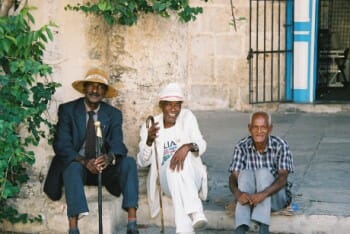
Jul 30, 2015 | Focolare Worldwide
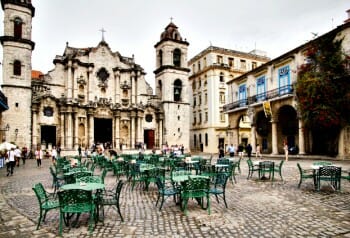 “We received the news that Pope Francis will visit our country from September 19th to 22nd with great joy. The Holy Father wants to show us his affinity in a time in which, thanks in part to his mediation, we breathe the air of hope in our national life before the new possibility of dialogue in progress between the United States and Cuba. What he is doing as universal Pastor of the Church is very, very important in the search for reconciliation and peace among all peoples of the earth!” So write the Catholic bishops of Cuba in a message to all Cubans. While the Caribbean island prepares to receive the first pope from Latin America, we spoke in Avana with José Andrés Sardina Pereira, a Spanish architect with a specialization in sacred art and liturgy, who is also a Cuban culture enthusiast. “The project we are bringing ahead,” explains Sardina Pereira, “aims to be a contribution of the archbishopric of Santiago to the work started by civil institutions; that is, to seek to have the historic center of Santiago (with the complex of its colonial churches and parts of the surrounding area) included in the UNESCO world heritage list, as are already the historic centers of Avana, Trinidad, Camagüey, and Cienfuegos.” Having a Cuban father, Sardina Pereira in addition to being an architect is a Cuban history enthusiast. This nation, also known as the “Big Island,” was also, “one of the last Spanish colonies to obtain independence (1898), therefore the process of ‘transculturation’ has been the most prolonged. Studies on the origin of Cuban culture, as opposed to that of Spain, place its solidification in the course of the 18th century, a time in which social, economic and cultural apprehensions, with a certain antagonism in respect to Spanish models and interests, were reawakened, all of which distinguish the island natives (the Creoles) from those arriving from the other side of the Atlantic.” Sardina Pereira clarifies that, “in the ethnic and cultural processes that give origin to the ‘cubanía’ (the essence of being Cuban), the Spanish and the Africans who arrived on the island brought with them cultures that were much more complex than those that are traditionally associated with ‘Spanish’ and ‘African’ concepts.” “Men and women from different linguistic, social, and religious groups, with different levels of economic development, coming from countries known today as: Senegal, Gambia, Mali, Guinea, Ivory Coast, Benin, Nigeria, Congo, and Angola, arrived in Cuba.” Also people from other European countries, from Asia, and from the American continent itself. “Just think of the presence of the French in Cienfuegos or of the coffee fields on the east of the Island.” It is in this coexistence of a “rich and multi-coloured range of individuals from different geographical locations that the Cuban culture is born, one of the last cultures generated by humanity: audacious, integral, creative, and at the same time open, welcoming and respectful of diversity.”
“We received the news that Pope Francis will visit our country from September 19th to 22nd with great joy. The Holy Father wants to show us his affinity in a time in which, thanks in part to his mediation, we breathe the air of hope in our national life before the new possibility of dialogue in progress between the United States and Cuba. What he is doing as universal Pastor of the Church is very, very important in the search for reconciliation and peace among all peoples of the earth!” So write the Catholic bishops of Cuba in a message to all Cubans. While the Caribbean island prepares to receive the first pope from Latin America, we spoke in Avana with José Andrés Sardina Pereira, a Spanish architect with a specialization in sacred art and liturgy, who is also a Cuban culture enthusiast. “The project we are bringing ahead,” explains Sardina Pereira, “aims to be a contribution of the archbishopric of Santiago to the work started by civil institutions; that is, to seek to have the historic center of Santiago (with the complex of its colonial churches and parts of the surrounding area) included in the UNESCO world heritage list, as are already the historic centers of Avana, Trinidad, Camagüey, and Cienfuegos.” Having a Cuban father, Sardina Pereira in addition to being an architect is a Cuban history enthusiast. This nation, also known as the “Big Island,” was also, “one of the last Spanish colonies to obtain independence (1898), therefore the process of ‘transculturation’ has been the most prolonged. Studies on the origin of Cuban culture, as opposed to that of Spain, place its solidification in the course of the 18th century, a time in which social, economic and cultural apprehensions, with a certain antagonism in respect to Spanish models and interests, were reawakened, all of which distinguish the island natives (the Creoles) from those arriving from the other side of the Atlantic.” Sardina Pereira clarifies that, “in the ethnic and cultural processes that give origin to the ‘cubanía’ (the essence of being Cuban), the Spanish and the Africans who arrived on the island brought with them cultures that were much more complex than those that are traditionally associated with ‘Spanish’ and ‘African’ concepts.” “Men and women from different linguistic, social, and religious groups, with different levels of economic development, coming from countries known today as: Senegal, Gambia, Mali, Guinea, Ivory Coast, Benin, Nigeria, Congo, and Angola, arrived in Cuba.” Also people from other European countries, from Asia, and from the American continent itself. “Just think of the presence of the French in Cienfuegos or of the coffee fields on the east of the Island.” It is in this coexistence of a “rich and multi-coloured range of individuals from different geographical locations that the Cuban culture is born, one of the last cultures generated by humanity: audacious, integral, creative, and at the same time open, welcoming and respectful of diversity.” Sardina Pereira stresses how the Gospel message has been key to this genesis, as “this new country was founded thanks to the coexistence of individuals who were very different from each other: whites, coloured, and of mixed race, slaves and free people; many of them united by the love that Jesus came to teach us, a love that goes so far as to lay down one’s life. Just think of the heroism, the consistency, and the love of many fathers of the Cuban nation and of the many men and women who, following their example, generated it with their own lives.” People united by their faith who “travel together on a new ship in the tempestuous sea of history.” At this point in the conversation, our expert adds another element which he holds to be essential. Cubans are: “A people blessed by an extraordinary encounter with the mother of Jesus.” Such an affirmation alludes to that which tradition remembers as “the finding.” It is said that in the year 1612, three salt seekers (one of mixed race, one black and one white, three ethnicities who were up until that moment in conflict) found a small wooden board that was floating on the sea and upon which was the image of the Madonna with the inscription: “I am the Madonna of Charity.” “And this encounter with a Mother,” continued the architect with conviction, “is one of the elements which permits the Cuban people to discover true fraternity, which will be converted into an identifying symbol of this nationality. Mother of all, of sailors of every land, colour and creed.” Sardina Pereira likes to compare this hybridization to a typical dish of the center of the Island, made with a variety of ingredients called “ajiaco.” “In a globalized and ever-more interdependent world,” continues the architect, “many times intolerance of ethnic, cultural, and religious diversity continues to be the primordial cause of grave conflicts. Chiara Lubich, a great personality of the Catholic Church, in her discourse to the United Nations in 1997, affirms that to build a world more united and in peace today, it is necessary to love the homeland of the other as one’s own, and the culture of the other as one’s own.” Sardina Pereira concludes with a personal confession: “Fulfiling this work I realised how much the knowledge and the diffusion of the Cuban culture can be a contribution to peace in the world, as long as we are able to redeem its historical memory and its deep Christian roots and keep them genuine.” By Gustavo Clariá
Sardina Pereira stresses how the Gospel message has been key to this genesis, as “this new country was founded thanks to the coexistence of individuals who were very different from each other: whites, coloured, and of mixed race, slaves and free people; many of them united by the love that Jesus came to teach us, a love that goes so far as to lay down one’s life. Just think of the heroism, the consistency, and the love of many fathers of the Cuban nation and of the many men and women who, following their example, generated it with their own lives.” People united by their faith who “travel together on a new ship in the tempestuous sea of history.” At this point in the conversation, our expert adds another element which he holds to be essential. Cubans are: “A people blessed by an extraordinary encounter with the mother of Jesus.” Such an affirmation alludes to that which tradition remembers as “the finding.” It is said that in the year 1612, three salt seekers (one of mixed race, one black and one white, three ethnicities who were up until that moment in conflict) found a small wooden board that was floating on the sea and upon which was the image of the Madonna with the inscription: “I am the Madonna of Charity.” “And this encounter with a Mother,” continued the architect with conviction, “is one of the elements which permits the Cuban people to discover true fraternity, which will be converted into an identifying symbol of this nationality. Mother of all, of sailors of every land, colour and creed.” Sardina Pereira likes to compare this hybridization to a typical dish of the center of the Island, made with a variety of ingredients called “ajiaco.” “In a globalized and ever-more interdependent world,” continues the architect, “many times intolerance of ethnic, cultural, and religious diversity continues to be the primordial cause of grave conflicts. Chiara Lubich, a great personality of the Catholic Church, in her discourse to the United Nations in 1997, affirms that to build a world more united and in peace today, it is necessary to love the homeland of the other as one’s own, and the culture of the other as one’s own.” Sardina Pereira concludes with a personal confession: “Fulfiling this work I realised how much the knowledge and the diffusion of the Cuban culture can be a contribution to peace in the world, as long as we are able to redeem its historical memory and its deep Christian roots and keep them genuine.” By Gustavo Clariá

Jul 29, 2015 | Focolare Worldwide
 In Nigeria, there is great inequality in the development between cities and rural villages where there are almost no infrastructures and no electricity, medical care, roads, etc. Yakoko is one of these villages located closest to the desert, amid mountains – where the Christian and Muslim communities have always lived in great harmony. In the evening after working the fields, the men gather in the square to discuss while sipping an alcoholic drink produced from their Guinea corn. Some years back, a missionary, Sr. Suor Patricia Finba, had brought to Yakoko the spirituality of the Focolare and Felix, Abubacar, Nicodemus, Loreto, Father Giorge Jogo and others had made it their way of life. Last year they welcomed to their village more than 200 people who had arrived from the various regions of Nigeria, to get to know the Focolare spirit better. This year a group of youth and adults of Onitsha decided to pass a few days there. After a journey of 24 hours – which was at times dangerous – in over-packed public vans, loaded with bags and packs, they were warmly welcomed by the community into their homes. «We participated in their lives – Luce recounted – sharing all with them», «and – Cike added – we noticed that the youth were interested not so much in material goods, the clothes and medicine we had brought, but the spiritual ones, our friendship and our life-treasure: the discovery of God who is Love. » And so they decided to stay with us for a day of meditation, going on an excursion in the mountains which with its arid beauty, is an invitation to meditate. «It was an important event – Imma recounted. In an atmosphere of deep friendship we shared the values we believe in and on which we have based our lives.» And then in the following days, together we brought the material help to those in need, especially the elderly and the children and the many refugees who had come from the northern regions. We visited five villages.
In Nigeria, there is great inequality in the development between cities and rural villages where there are almost no infrastructures and no electricity, medical care, roads, etc. Yakoko is one of these villages located closest to the desert, amid mountains – where the Christian and Muslim communities have always lived in great harmony. In the evening after working the fields, the men gather in the square to discuss while sipping an alcoholic drink produced from their Guinea corn. Some years back, a missionary, Sr. Suor Patricia Finba, had brought to Yakoko the spirituality of the Focolare and Felix, Abubacar, Nicodemus, Loreto, Father Giorge Jogo and others had made it their way of life. Last year they welcomed to their village more than 200 people who had arrived from the various regions of Nigeria, to get to know the Focolare spirit better. This year a group of youth and adults of Onitsha decided to pass a few days there. After a journey of 24 hours – which was at times dangerous – in over-packed public vans, loaded with bags and packs, they were warmly welcomed by the community into their homes. «We participated in their lives – Luce recounted – sharing all with them», «and – Cike added – we noticed that the youth were interested not so much in material goods, the clothes and medicine we had brought, but the spiritual ones, our friendship and our life-treasure: the discovery of God who is Love. » And so they decided to stay with us for a day of meditation, going on an excursion in the mountains which with its arid beauty, is an invitation to meditate. «It was an important event – Imma recounted. In an atmosphere of deep friendship we shared the values we believe in and on which we have based our lives.» And then in the following days, together we brought the material help to those in need, especially the elderly and the children and the many refugees who had come from the northern regions. We visited five villages. A Muslim community welcomed them with particular joy. Some of them had already started to live for unity in the world and with them we immediately felt a family atmosphere in which we shared joys and sufferings in that area. The villages, in fact, were undergoing a really difficult time due to the drought, and by tradition they had asked an important person of the village to pray for rain. But the rain did not come, and they had thus decided to kill this person. «On hearing this decision we were shocked and also started to pray to God to send rain – Luce continued – and in fact, on the third day, He blessed us with a great rainfall! But apart from the rain, we were so happy to have saved a person’s life.»
A Muslim community welcomed them with particular joy. Some of them had already started to live for unity in the world and with them we immediately felt a family atmosphere in which we shared joys and sufferings in that area. The villages, in fact, were undergoing a really difficult time due to the drought, and by tradition they had asked an important person of the village to pray for rain. But the rain did not come, and they had thus decided to kill this person. «On hearing this decision we were shocked and also started to pray to God to send rain – Luce continued – and in fact, on the third day, He blessed us with a great rainfall! But apart from the rain, we were so happy to have saved a person’s life.»
Jul 28, 2015 | Non categorizzato, Word of
Love is the fulfilment of our life, the one secure guiding principle we can follow. The whole of Christian ethics is contained in these words. Human behaviour, if it wishes to be according to what God thought when he created us, and so genuinely human, must be animated by love. If our ‘walk’ (which stands for our life) is to reach its objective, it must be guided by love, the summary of the entire law. The apostle Paul is speaking to the Christians in Ephesus when he makes this exhortation. It is the conclusion and summary of what he has just written to them about the Christian way of life: going from the old self to the new self, being true and sincere with one another, not stealing, knowing that we are forgiven, doing what is good, in a word ‘walking in love’. It would be useful to read the couple of sentences that give us these incisive words which will be with us throughout the month: ‘Therefore be imitators of God, as beloved children. And walk in love, as Christ loved us and gave himself up for us, a fragrant offering and sacrifice to God.’ Paul is convinced that our every move must be modelled on God’s way of behaving. If love is God’s distinguishing feature, it must be also for his children. They must imitate him in this. But how can we know God’s love? For Paul it is extremely clear. God’s love is revealed in Jesus, who shows how and how much God loves. The apostle experienced it at first hand: Christ ‘loved me and gave himself for me’ (Gal. 2:20), and now Paul reveals this to everybody so that it may become the experience of the whole community. ‘Walk in love’ What is the measure of Jesus’s love which should be the model for our love? It, we know, has no limits, no exceptions, no partiality. Jesus died for all, even his enemies, those who were crucifying him, just as the Father in his universal love makes his sun shine and his rain fall upon all, good and bad, sinners and righteous alike. He knew how to care above all for the little ones and the poor, the sick and the excluded. He loved his friends with intensity. He was particularly close to his disciples… His love spared nothing and went to the extreme of his giving his life. And now he calls all to share in his same love, to love as he has loved. This call could scare us, because it demands too much. How can we be imitators of God, who loves everyone, always, taking the initiative? How can we love with the measure of Jesus’s love? How can we live ‘in love’, as this Word of Life asks of us? It is possible only if we ourselves have first had the experience of being loved. In the expression ‘walk in love, as Christ loved us’, the word ‘as’ can also be translated ‘because’. ‘Walk in love’ Walking means acting, behaving, which means to say that everything we do must be inspired and moved by love. But perhaps it is not by chance that Paul uses this dynamic word to remind us that we learn by loving, that there is a whole road to go before reaching the wideness of God’s heart. He uses other images to point out the need for constant progress, such as the growth of infants to adulthood (see 1 Cor. 3:1-2) or races in the stadium to win a prize (see 1 Cor. 9:24). We are always a work in progress. Time and constancy are required to reach our goal, without giving up in the face of difficulties, without ever letting ourselves be discouraged by failures and mistakes, ready always to start again, without giving in to mediocrity. Augustine of Hippo, perhaps thinking of his own painful journey, wrote: ‘You always dislike what you are, if you want to reach what you are not yet. In fact where you feel at ease, you stop, and you say, “That’s enough,” and like that you sink. Build up continuously, walk ahead always, go forward without ceasing; do not pause long on the way, do not look behind, do not leave the track. The one who goes not ahead, stays behind.’ ‘Walk in love’ How can we walk most swiftly upon the way of love? Since the invitation is given to the whole community (the word ‘walk’ is in plural form), it is a good idea to help one another. Indeed, it is sad and tough to go on a journey alone. We could start by finding the opportunity to declare to one another again (with our friends, families, the members of the same Christian community) our will to walk together. We could share our positive experiences about how we have loved, so as to learn from one another. We could share with someone able to understand us the mistakes we have made and our slips along the way, so as to be corrected. Prayer together too can give us light and strength to go ahead. United among us and with Jesus (who called himself the Way!) in our midst we will be able to travel along the whole of our ‘Holy Journey’. We will sow love around us and we will reach the goal: Love. Fabio Ciardi
Jul 28, 2015 | Focolare Worldwide
For several years the ROM camp has needed to be removed because of serious health and environmental issues, but it was no easy task given the fact that it was home to thirty families. Mario Bruno, Mayor of Alghero, decided to involve the families themselves in choosing a new location for the camp. There are many unemployed people in Alghero and there are also many people on the list for a house. So, as the Mayor says, it can be difficult to make people understand “that there are specific funds, and sometimes we all have to take to heart social inclusion and sometimes take decisions that are unpopular that are sometimes not understood.” “The 30 ROM minors are just as important to me as each and every Algherese. And I have to try to show with facts that this is possible,” the Mayor went on, “and I have to help the Algheresi to take this step knowing full well that I hold all the problems in my heart and not only those of one side.” Concretely, finding solutions for the Algheresi is one way of showing this value for people. He did it by announcing a 3 million and six hundred thousand euro financing toward the construction of 28 dwellings for Algeresi citizens. BrAs a politician, at times Bruno finds himself in difficult situations which he says he tries to face “with common sense, delving into adminstrative decisions without skipping over them, because we are here to defend everyone’s good and not only our own, we are only administrators.” The Mayor felt the “need of coming to a solution in front of the complexity of the moment we are going through (. . .) in which you can be part of the answer and I believe that this answer can be given individually but also collectively, and giving a collective answer means living for a good that goes beyond us.” Watch the Video – original soundtrack in Italian https://vimeo.com/133758828
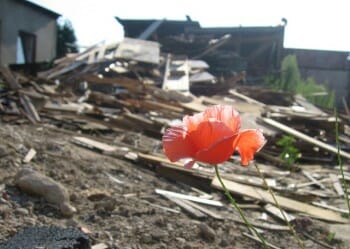
Jul 25, 2015 | Focolare Worldwide
 “Jean Paul is in his last year at the Faculty of Engineering and has known the spirituality of unity for several years. Burundi is going through a difficult political situation, because of the upcoming election. The political impasse has provoked many controversies that give rise to clashes and protests. Some people have lost their lives. It was in this context of great instability and suffering that Jean Paul and a friend, returning home on foot because there was no public transport, found themselves in front of a new and unexpected countenance of Jesus forsaken.” The one reporting is Marcellus, along with the entire Focolare community of Burundi and Rwanda. “It was the summer of May 2cnd when the two young men were assaulted by a group of wrongdoers. Jean Paul and his friend were brutally beaten to the point of unconsciousness. Helped by several police officers who found them thrown into a manhole, they were rushed to hospital. The friend had light injuries but Jean Paul was in serious condition: a fractured backbone and paralysis of the lower limbs. In spite of his serious state Jean Paul was always smiling and hoping to for a recovery. He entrusted himself to God and Chiara Lubich. “The fact that I’m still alive is already a miracle of hers,” he said. In a short time news of what had happened to Jean Paul reached the community which, besides praying for him, began to look for the money to hire an ambulance that would return him to Rwanda, where he would receive adequate care. On May 12th he left for Kigali, Rwanda, accompanied by a nurse and Séverin, a young man from his Gen group. The chain of love and prayer widened, involving the Rwandan and worldwide Focolare family, especially the Gen. Jean Paul and Séverin gave a strong witness of mutual love in Kigali, Rwanda. In hospital the people were astonished that the visits to this boy were more numerous than to all the other patients. They were also amazed that by the fact that Jean Paul and Séverin were not brothers, from the same village or ethnicity. The boys explained to everyone that the engine behind their action was something else: the spirituality of unity based on the mutual love that Jesus asks of us. After a few medical examinations, Jean Paul was operated on the back and chest, on June 10th in Roi Fayçal Hospital. The prices at the hospital were very high, but God intervened with Providence that was never lacking. Jean Paul, who never grew discourage, considers this experience a true miracle. The surgery went well and this was encouraging to everyone. Jean Paul was transferred to another facility where he began physical therapy, and close monitoring by his physician and the team that performed the surgery. His condition is showing incredible improvement. He is beginning to feel hungry, physiological needs, pain and sensitivity in his feet. He is able to get out of bed and move around the hospital in a wheel chair. He continues to say that if it weren’t for this extended family he wouldn’t be alive. Jean Paul is very grateful to the Focolare community in Rwanda, to the Gen around the world, to the international Gen Centres, and to all those who have sent financial support and prayers. All our hearts overflow with gratitude to God for having given us the possibility of having this powerful experience that has aroused attention, communion, authentic love among His children and a powerful witness of the love that conquers all.”
“Jean Paul is in his last year at the Faculty of Engineering and has known the spirituality of unity for several years. Burundi is going through a difficult political situation, because of the upcoming election. The political impasse has provoked many controversies that give rise to clashes and protests. Some people have lost their lives. It was in this context of great instability and suffering that Jean Paul and a friend, returning home on foot because there was no public transport, found themselves in front of a new and unexpected countenance of Jesus forsaken.” The one reporting is Marcellus, along with the entire Focolare community of Burundi and Rwanda. “It was the summer of May 2cnd when the two young men were assaulted by a group of wrongdoers. Jean Paul and his friend were brutally beaten to the point of unconsciousness. Helped by several police officers who found them thrown into a manhole, they were rushed to hospital. The friend had light injuries but Jean Paul was in serious condition: a fractured backbone and paralysis of the lower limbs. In spite of his serious state Jean Paul was always smiling and hoping to for a recovery. He entrusted himself to God and Chiara Lubich. “The fact that I’m still alive is already a miracle of hers,” he said. In a short time news of what had happened to Jean Paul reached the community which, besides praying for him, began to look for the money to hire an ambulance that would return him to Rwanda, where he would receive adequate care. On May 12th he left for Kigali, Rwanda, accompanied by a nurse and Séverin, a young man from his Gen group. The chain of love and prayer widened, involving the Rwandan and worldwide Focolare family, especially the Gen. Jean Paul and Séverin gave a strong witness of mutual love in Kigali, Rwanda. In hospital the people were astonished that the visits to this boy were more numerous than to all the other patients. They were also amazed that by the fact that Jean Paul and Séverin were not brothers, from the same village or ethnicity. The boys explained to everyone that the engine behind their action was something else: the spirituality of unity based on the mutual love that Jesus asks of us. After a few medical examinations, Jean Paul was operated on the back and chest, on June 10th in Roi Fayçal Hospital. The prices at the hospital were very high, but God intervened with Providence that was never lacking. Jean Paul, who never grew discourage, considers this experience a true miracle. The surgery went well and this was encouraging to everyone. Jean Paul was transferred to another facility where he began physical therapy, and close monitoring by his physician and the team that performed the surgery. His condition is showing incredible improvement. He is beginning to feel hungry, physiological needs, pain and sensitivity in his feet. He is able to get out of bed and move around the hospital in a wheel chair. He continues to say that if it weren’t for this extended family he wouldn’t be alive. Jean Paul is very grateful to the Focolare community in Rwanda, to the Gen around the world, to the international Gen Centres, and to all those who have sent financial support and prayers. All our hearts overflow with gratitude to God for having given us the possibility of having this powerful experience that has aroused attention, communion, authentic love among His children and a powerful witness of the love that conquers all.”
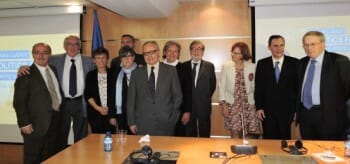
Jul 23, 2015 | Focolare Worldwide
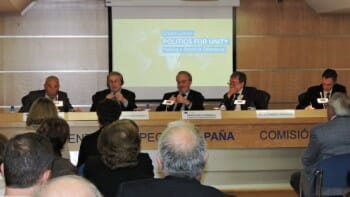 At the base of the itinerary of the Political Movement for Unity in Spain, is the desire to give an answer to a situation of violence being staged in the Basque Province by the armed struggle of the ETA. The objective is to try to heal the still open wounds and make an effort to ensure a future of peace. «It is a utopia, but it may be the only solution for our people.» There was a pressing surge of hope in some members of the Provincial Council of Gipuzkoa when about ten years ago, some exponents of the Political Movement for Unity (MppU) from Italy, spoke to them about fraternity as a political category. This perspective almost seemed like a shock because of the atmosphere existing in the Basque Countries and the work of the ETA.. With the objective of obtaining independence for the Basque people, the armed groups of ETA continuously sowed an atmosphere of violence and terror. In fact, the tension was at its highest. During those times – the first six months of 2005 – a group of politicians belonging not only to different parties but also to diverse ideologies, got together to pave the way to a strategy that sought the renewal of politics, based on mutual acceptance of peoples, without exclusions. Thus a new ground for discussion and acceptance of the other was set, involving politicians of all convictions, State employees, members of labour unions, citizens… all thirsting for a normalized coexistence, and true peace. The meetings were held every two months at different locations, alternating between the various parties. Among the participants, there were those who were
At the base of the itinerary of the Political Movement for Unity in Spain, is the desire to give an answer to a situation of violence being staged in the Basque Province by the armed struggle of the ETA. The objective is to try to heal the still open wounds and make an effort to ensure a future of peace. «It is a utopia, but it may be the only solution for our people.» There was a pressing surge of hope in some members of the Provincial Council of Gipuzkoa when about ten years ago, some exponents of the Political Movement for Unity (MppU) from Italy, spoke to them about fraternity as a political category. This perspective almost seemed like a shock because of the atmosphere existing in the Basque Countries and the work of the ETA.. With the objective of obtaining independence for the Basque people, the armed groups of ETA continuously sowed an atmosphere of violence and terror. In fact, the tension was at its highest. During those times – the first six months of 2005 – a group of politicians belonging not only to different parties but also to diverse ideologies, got together to pave the way to a strategy that sought the renewal of politics, based on mutual acceptance of peoples, without exclusions. Thus a new ground for discussion and acceptance of the other was set, involving politicians of all convictions, State employees, members of labour unions, citizens… all thirsting for a normalized coexistence, and true peace. The meetings were held every two months at different locations, alternating between the various parties. Among the participants, there were those who were 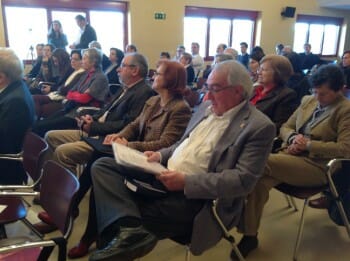 immediately threatened for their pacific membership, and they arrived with their bodyguards. And there were those who feared they would not be well received by their own party or would be ousted. But they all tried to encourage one another, and overcoming every sense of mistrust, wished to testify that fraternity was possible, starting from themselves. As time passed, they saw the need to share this experience with politicians of other regions and communities. A group thus went to Madrid and participated in a series of encounters where they met other experiences, inviting everyone to unite Euskadi with the group of Gipuzkoa. It was a historic moment: four hours of dialogue (after lunching together) to get to know one another, and listening to and begging forgiveness from each other. Subsequently, they felt the need to draw up a document that each could bring to their own parties, to be studied as an alternative to the crisis. Many still felt the need to share the contents of the document and to hold seminars and round tables in other autonomous communities, also to present the experience of fraternity and pacific coexistence based precisely, on fraternity. When the ETA ceased its armed activities (2011) a new process began, though not simple, but which was a harbinger of hope. There are still many people, families, and groups that though sharing the same identity are divided and continue to clash, finding it really difficult to dialogue.
immediately threatened for their pacific membership, and they arrived with their bodyguards. And there were those who feared they would not be well received by their own party or would be ousted. But they all tried to encourage one another, and overcoming every sense of mistrust, wished to testify that fraternity was possible, starting from themselves. As time passed, they saw the need to share this experience with politicians of other regions and communities. A group thus went to Madrid and participated in a series of encounters where they met other experiences, inviting everyone to unite Euskadi with the group of Gipuzkoa. It was a historic moment: four hours of dialogue (after lunching together) to get to know one another, and listening to and begging forgiveness from each other. Subsequently, they felt the need to draw up a document that each could bring to their own parties, to be studied as an alternative to the crisis. Many still felt the need to share the contents of the document and to hold seminars and round tables in other autonomous communities, also to present the experience of fraternity and pacific coexistence based precisely, on fraternity. When the ETA ceased its armed activities (2011) a new process began, though not simple, but which was a harbinger of hope. There are still many people, families, and groups that though sharing the same identity are divided and continue to clash, finding it really difficult to dialogue.  The political workshop that had been created during those difficult times and simply called “workshop to learn about peace” – continues its journey toward pacification and search for peace, facing the diverse standpoints on historical facts and healing the wounds that are still open. They drew up a document named “Towards the path of reconciliation of the Basque society” (January 2013), that describes the basis to work on from then. This document is informally known as “The earth we trod on.” Every time dialogue seems to encounter a hitch, they try to start anew by helping one another believe that every man is a brother and that they could build something with all. This does not signify that the crimes should not be recognized as such, or that the great number of people who paid for this with their lives are not acknowledged. On the contrary, by accepting the past and recognizing the injustice and senselessness of the violence suffered, they try to view history like a slow and painful path toward reconciliation and peace, in which all can and must give their own contribution. On 13 March, precisely at the eve of the anniversary of Chiara Lubich during which all over the world her view of politics was being deepened, this group held a meeting at “Las Juntas Generales de Gipuzkoa” (provincial parliament) in San Sebastian, inviting various experts, scholars, and political figures. The debate was on “The relationship between common good and the common goods in globalization,” the basic manifesto of which, was sent beforehand to all and was greatly appreciated, and which described the deliberation to hold a “workshop to learn about peace.” In a climate of mutual acceptance, valid contributions emerged which were then integrated into the document itself, to be later diffused in order to promote the value of fraternity at all levels.
The political workshop that had been created during those difficult times and simply called “workshop to learn about peace” – continues its journey toward pacification and search for peace, facing the diverse standpoints on historical facts and healing the wounds that are still open. They drew up a document named “Towards the path of reconciliation of the Basque society” (January 2013), that describes the basis to work on from then. This document is informally known as “The earth we trod on.” Every time dialogue seems to encounter a hitch, they try to start anew by helping one another believe that every man is a brother and that they could build something with all. This does not signify that the crimes should not be recognized as such, or that the great number of people who paid for this with their lives are not acknowledged. On the contrary, by accepting the past and recognizing the injustice and senselessness of the violence suffered, they try to view history like a slow and painful path toward reconciliation and peace, in which all can and must give their own contribution. On 13 March, precisely at the eve of the anniversary of Chiara Lubich during which all over the world her view of politics was being deepened, this group held a meeting at “Las Juntas Generales de Gipuzkoa” (provincial parliament) in San Sebastian, inviting various experts, scholars, and political figures. The debate was on “The relationship between common good and the common goods in globalization,” the basic manifesto of which, was sent beforehand to all and was greatly appreciated, and which described the deliberation to hold a “workshop to learn about peace.” In a climate of mutual acceptance, valid contributions emerged which were then integrated into the document itself, to be later diffused in order to promote the value of fraternity at all levels.
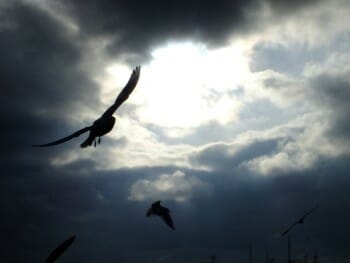
Jul 22, 2015 | Non categorizzato
 In the waiting room – “Our son and his friend were jailed for drug dealing. During the long waits before visitations with inmate relatives, we got to know a young foreigner with a sad face. For three years she had to travel a great distance on foot, to be able to visit her friend regularly, who was in jail. When she heard that she could count on us in the future to give her a ride in our car, she finally smiled and couldn’t thank us enough. On the following visit, to lighten the wait especially for the small children who had come with their mothers, we brought along some toys, sweets and fruit. When he learned what was happening in the waiting room where there was a more serene atmosphere, we saw a positive change in our son’s relationship with us.” (Italy) Pardon – “I had gone to live with a colleague, leaving behind my wife and four children. While the eldest of my children took it badly and left the house, my wife and the other three began to ask God for the grace of my return. Little by little I found the strength to leave the other woman; to avoid seeing her at work (since we work in the same company), I also left my job. I returned to my family, unemployed until I was able to find a very simple job. Living humility was good for me. I thank God for the support I received from other families and especially for the forgiveness I received from my wife and my children with whom I have begun a new path.” (USA) On the phone – “Years ago my wife died at the age of 23 in an automobile accident. Since that day I felt a subtle bitterness towards the friend who had been driving and remained uninjured. I held him responsible for that death. He’s now married with children. With trembling hands I dialled his telephone number. His wife answered surprised and embarrassed when I told her it was me. I opened my heart to her: ‘I’ve been thinking about all of you for the past few days. I wanted to see you, to know your children. . . I’d be so happy if you’d come and visit me.” She was overcome with emotion and promised me they would visit. . . I found myself feeling so happy and light. (Switzerland) The numbers do add up – “A mother of five children with health problems, drugs and alcoholism, life choices that have led to irregular families, amidst tension and fights, now I’m a widow. Alone, in the face of problems
In the waiting room – “Our son and his friend were jailed for drug dealing. During the long waits before visitations with inmate relatives, we got to know a young foreigner with a sad face. For three years she had to travel a great distance on foot, to be able to visit her friend regularly, who was in jail. When she heard that she could count on us in the future to give her a ride in our car, she finally smiled and couldn’t thank us enough. On the following visit, to lighten the wait especially for the small children who had come with their mothers, we brought along some toys, sweets and fruit. When he learned what was happening in the waiting room where there was a more serene atmosphere, we saw a positive change in our son’s relationship with us.” (Italy) Pardon – “I had gone to live with a colleague, leaving behind my wife and four children. While the eldest of my children took it badly and left the house, my wife and the other three began to ask God for the grace of my return. Little by little I found the strength to leave the other woman; to avoid seeing her at work (since we work in the same company), I also left my job. I returned to my family, unemployed until I was able to find a very simple job. Living humility was good for me. I thank God for the support I received from other families and especially for the forgiveness I received from my wife and my children with whom I have begun a new path.” (USA) On the phone – “Years ago my wife died at the age of 23 in an automobile accident. Since that day I felt a subtle bitterness towards the friend who had been driving and remained uninjured. I held him responsible for that death. He’s now married with children. With trembling hands I dialled his telephone number. His wife answered surprised and embarrassed when I told her it was me. I opened my heart to her: ‘I’ve been thinking about all of you for the past few days. I wanted to see you, to know your children. . . I’d be so happy if you’d come and visit me.” She was overcome with emotion and promised me they would visit. . . I found myself feeling so happy and light. (Switzerland) The numbers do add up – “A mother of five children with health problems, drugs and alcoholism, life choices that have led to irregular families, amidst tension and fights, now I’m a widow. Alone, in the face of problems  that people could never even imagine, since I look so calm. I should say that I’m helped by my character, but I was able to react to certain situations thanks especially to the gift of faith and the support of friends. Now I’m living on my pension, but I manage just the same to help some needy people every month. At times I would like to say ‘no more’. Indeed it was be easy to put something aside for when I’m old. But it’s more powerful than me. And I see that Divine Providence continues to arrive right on time every time, and the numbers do add up.” (Italy)
that people could never even imagine, since I look so calm. I should say that I’m helped by my character, but I was able to react to certain situations thanks especially to the gift of faith and the support of friends. Now I’m living on my pension, but I manage just the same to help some needy people every month. At times I would like to say ‘no more’. Indeed it was be easy to put something aside for when I’m old. But it’s more powerful than me. And I see that Divine Providence continues to arrive right on time every time, and the numbers do add up.” (Italy)

Jul 20, 2015 | Focolare Worldwide
 “We are honored, grateful and especially happy that the message of unity that we try to spread has been recognized. A special thank you to all our readers who support and encourage us on that path!”, the Living City editorial team reports. Living City received an award for the April 2014 issue for “Best coverage of immigration” by Marilyn Boesch, Susanne Janssen and Lori Chesser. The CPA jury wrote: “These stories are captivating and relevant, and they put the human element front and center.” In the category “Best Explanation of Church’s Position on Marriage”, Living City got the third place for the articles in the July 2014 issue written by Michael and Julie James, Pietro Riccio,Sarah Mundell and Emilie Christy. “The perspective on diversity in these pieces is valuable. There is a clear call to action to those who wish to use their faith to create dialogue and build bridges,” commented the CPA. You can read and share these articles on the website: livingcitymagazine.com
“We are honored, grateful and especially happy that the message of unity that we try to spread has been recognized. A special thank you to all our readers who support and encourage us on that path!”, the Living City editorial team reports. Living City received an award for the April 2014 issue for “Best coverage of immigration” by Marilyn Boesch, Susanne Janssen and Lori Chesser. The CPA jury wrote: “These stories are captivating and relevant, and they put the human element front and center.” In the category “Best Explanation of Church’s Position on Marriage”, Living City got the third place for the articles in the July 2014 issue written by Michael and Julie James, Pietro Riccio,Sarah Mundell and Emilie Christy. “The perspective on diversity in these pieces is valuable. There is a clear call to action to those who wish to use their faith to create dialogue and build bridges,” commented the CPA. You can read and share these articles on the website: livingcitymagazine.com
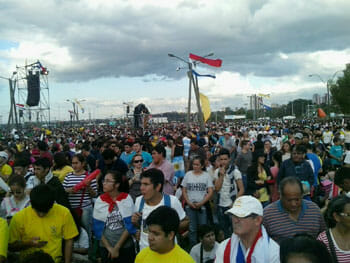
Jul 20, 2015 | Focolare Worldwide
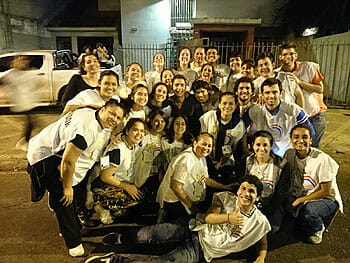 Ore aguije Papa Francisco pe, ha peeme avei pe ñembo’ehaguere ore rehe. In the Guaraní language: «Our thanks to Pope Francis and to all of you for your prayers.» «As we had imagined, overflowing graces have fallen on the entire Paraguay people, ever since His Holiness was here among us,» Nelson Benítes and Margarita Ávalos, heads of the Focolare in Paraguay wrote, after the Pope’s visit to their country. «The children, the sick and the youth were the main protagonists of the visit. Over 80,000 “servidores” (“stewards” – almost all young people) from all over the country worked day and night for three days. But the preparations started at least three months earlier, a concrete fact that gives true hope!» Nahuel Espinola recounts: «I was a ”servidor” of the Pope – It was simply fantastic! I’m 15 and I don’t know when I shall experience something like this again. I hope that his message will reach all the youth.» «There was instant bond with the people,» and some scenes will never be deleted from my mind: the children of the choir of Luque running towards Pope Francis for a group embrace, the thousands of people who filled the streets, his car stopping in front of the women’s jail. «When they found out that the Pope was coming, the children afflicted with cancer in a hospital did not want to be discharged!». Then there was the visit to “Bañado Norte,” one of the poorest districts of the capital, where the Pope visited a sick woman at home. «For that event, she had prepared the “chipa” and “sopa paraguaya,” typical dishes the Popes likes. This was followed by the surprise visit to the parish of Cristo Re, to pay homage to the still intact heart of the martyr and first Paraguayan saint: San Roque González de Santa Cruz.» In Caacupé, Pope Francis consecrated Paraguay entirely to Mary. Then came the meeting with civil society, one of the most striking moments when he launched a discourse on dialogue, inviting all to dialogue, by losing all in order to understand the other, and “enter” into the other. «Concepts like the humane side of development, giving priority to the person, and not treating the poor like objects, impressed me deeply,» affirmed Julia Dominguez, a member of the Economy of Communion of Paraguay, «From now on, we must not dwell on sentimentalism, but live this daily.» César Romero, active in the association for families added: «In the dynamism and freshness of the programme, I saw a Church that was making a big effort to update itself in its methods and messages.» Silvano Malini, a journalist in Paraguay wrote: «In these three countries of the Latin American “periphery,” Pope Francis decisively stood on the side of the “rejects” of society and victims of injustice and inequality, but in doing so did not “attack” anyone but human miserliness – the only sources of the serious and dramatic problems of this country (corruption, egoism, low-quality democracy).» Malini went on to say: «The Pope’s exhortations fell on soil tilled by the Church in Paraguay, as could be seen in the meeting with the representatives of over 1,500 civil society organizations. Pope Francis, with authority, gave an example of concrete dialogue which is not easy but does help to make small but sure steps towards a common project. »
Ore aguije Papa Francisco pe, ha peeme avei pe ñembo’ehaguere ore rehe. In the Guaraní language: «Our thanks to Pope Francis and to all of you for your prayers.» «As we had imagined, overflowing graces have fallen on the entire Paraguay people, ever since His Holiness was here among us,» Nelson Benítes and Margarita Ávalos, heads of the Focolare in Paraguay wrote, after the Pope’s visit to their country. «The children, the sick and the youth were the main protagonists of the visit. Over 80,000 “servidores” (“stewards” – almost all young people) from all over the country worked day and night for three days. But the preparations started at least three months earlier, a concrete fact that gives true hope!» Nahuel Espinola recounts: «I was a ”servidor” of the Pope – It was simply fantastic! I’m 15 and I don’t know when I shall experience something like this again. I hope that his message will reach all the youth.» «There was instant bond with the people,» and some scenes will never be deleted from my mind: the children of the choir of Luque running towards Pope Francis for a group embrace, the thousands of people who filled the streets, his car stopping in front of the women’s jail. «When they found out that the Pope was coming, the children afflicted with cancer in a hospital did not want to be discharged!». Then there was the visit to “Bañado Norte,” one of the poorest districts of the capital, where the Pope visited a sick woman at home. «For that event, she had prepared the “chipa” and “sopa paraguaya,” typical dishes the Popes likes. This was followed by the surprise visit to the parish of Cristo Re, to pay homage to the still intact heart of the martyr and first Paraguayan saint: San Roque González de Santa Cruz.» In Caacupé, Pope Francis consecrated Paraguay entirely to Mary. Then came the meeting with civil society, one of the most striking moments when he launched a discourse on dialogue, inviting all to dialogue, by losing all in order to understand the other, and “enter” into the other. «Concepts like the humane side of development, giving priority to the person, and not treating the poor like objects, impressed me deeply,» affirmed Julia Dominguez, a member of the Economy of Communion of Paraguay, «From now on, we must not dwell on sentimentalism, but live this daily.» César Romero, active in the association for families added: «In the dynamism and freshness of the programme, I saw a Church that was making a big effort to update itself in its methods and messages.» Silvano Malini, a journalist in Paraguay wrote: «In these three countries of the Latin American “periphery,” Pope Francis decisively stood on the side of the “rejects” of society and victims of injustice and inequality, but in doing so did not “attack” anyone but human miserliness – the only sources of the serious and dramatic problems of this country (corruption, egoism, low-quality democracy).» Malini went on to say: «The Pope’s exhortations fell on soil tilled by the Church in Paraguay, as could be seen in the meeting with the representatives of over 1,500 civil society organizations. Pope Francis, with authority, gave an example of concrete dialogue which is not easy but does help to make small but sure steps towards a common project. »  «At campo Ñu Guasú, a million faithful awaited him. The sun shone on the crowd that had been waiting for 15 hours in the mud, because it had rained over the last few days. But nothing could stop the celebrations.» Esteban Echagüe recounted: «Neither the mud nor the weariness could deter the immense joy we all felt. I was so struck by the Pope’s affirmation that the parishes should really be places of encounter with one’s brethren, and a place of acceptance and fraternity, and if this is not so, we would not be true Christians.» «After a brief but intense moment with the Paraguay bishops, the Pope “miraculously” regained his strength to resume his pastoral journey! One could feel that he was tired as was natural for a 78 year old! But everyone was convinced that in front of the youth, Francis would be transformed.» In fact, more than 200,000 were waiting for him along the Paraguay River! He asked all to have a free heart and furthermore…, «continue to raise a “ruckus” but an organized one.» Leonor Navaro confided: «The Pope aroused in the youth and in all, the desire to be better… because he saw us the way we should be – and through his eyes the world discovered us as such. From now on we want to reflect ourselves in his eyes!» Along the way back to the airport, he was moved upon blessing a place which is a really painful symbol for the country: the remains of a commercial center where ten years ago, around 400 people died in a fire. Nelson and Margarita continued: «Through Bishop Adalberto Martínez, Secretary General of the Episcopal Conference of Paraguay, we wrote to the Pope that the Focolare Movement is praying for him. We had sent him a gift of a book on the Guaranì culture and on the development of Economy of Communion in the country. To conclude: «This visit, like that of Pope John Paul 27 years ago, will bring about vital and positive outcomes and spiritual effects also in the civil life of the country. Pope Francis was very clear in his words, but conveyed them with the tenderness of a Father! It is now up to them to make use of these moments of grace, “a before and an after” of the first visit of a Latin American Pope to Paraguay».
«At campo Ñu Guasú, a million faithful awaited him. The sun shone on the crowd that had been waiting for 15 hours in the mud, because it had rained over the last few days. But nothing could stop the celebrations.» Esteban Echagüe recounted: «Neither the mud nor the weariness could deter the immense joy we all felt. I was so struck by the Pope’s affirmation that the parishes should really be places of encounter with one’s brethren, and a place of acceptance and fraternity, and if this is not so, we would not be true Christians.» «After a brief but intense moment with the Paraguay bishops, the Pope “miraculously” regained his strength to resume his pastoral journey! One could feel that he was tired as was natural for a 78 year old! But everyone was convinced that in front of the youth, Francis would be transformed.» In fact, more than 200,000 were waiting for him along the Paraguay River! He asked all to have a free heart and furthermore…, «continue to raise a “ruckus” but an organized one.» Leonor Navaro confided: «The Pope aroused in the youth and in all, the desire to be better… because he saw us the way we should be – and through his eyes the world discovered us as such. From now on we want to reflect ourselves in his eyes!» Along the way back to the airport, he was moved upon blessing a place which is a really painful symbol for the country: the remains of a commercial center where ten years ago, around 400 people died in a fire. Nelson and Margarita continued: «Through Bishop Adalberto Martínez, Secretary General of the Episcopal Conference of Paraguay, we wrote to the Pope that the Focolare Movement is praying for him. We had sent him a gift of a book on the Guaranì culture and on the development of Economy of Communion in the country. To conclude: «This visit, like that of Pope John Paul 27 years ago, will bring about vital and positive outcomes and spiritual effects also in the civil life of the country. Pope Francis was very clear in his words, but conveyed them with the tenderness of a Father! It is now up to them to make use of these moments of grace, “a before and an after” of the first visit of a Latin American Pope to Paraguay».
Jul 18, 2015 | Focolare Worldwide

Jul 14, 2015 | Non categorizzato
 Lack of communication and the incapacity to comprehend the other, see the positive side of the other person’s diversity, and establish the right distance with the families of origin, are often the causes of the crises, in an individualistic society that does not believe in marriage and the commitment for a long-lasting relationship. The 7th edition of the course in Loppiano this year (20-27 June) was organized by the New Families and aimed to strengthen the unity of couples. The course allowed participants to demonstrate willingness to put themselves to the test, together with a deep sharing with the course guides and other families, and avail of the advice of experts that could help dead-end relationships to start anew. With these factors, also the greatest difficulties could be overcome, as was demonstrated by the moving testimonial of unconditional forgiveness by a couple that was reunited after nine years of separation. However, the path towards “encounter” is complex. «Upon their arrival, the tense features and sad expressions of the couples conveyed their deep suffering, more than words,» recount Marina and Gianni Vegliach, course guides of the New Families. «Some spoke about the need to find a meaning, some spoke about an estranged partner, some doubted having a future together, while others referred to the impossibility of dialogue and some confided of “not being able to forgive themselves.». «As we went deeper into the course programme entitled A course of light for the couple – continued Vegliach – the Focolare’s spirituality of unity, together with the psychological path, sharing of experiences, practical exercises, personal talks, and moments of recreation, helped to transform hearts and souls. And this showed through the changed expressions of their faces and eyes, which became more serene.» «When we arrived we were empty, obsessed with the word “end” and now are going home with the words “start again,” a couple said. Among the course-guide families were two couples who had done the course in the past, and decided to put themselves at the service with commitment, seriousness and competence, and who managed to enter the tunnel with those who were in the dark, and encourage and support the couples with their own experiences. The course covered themes on self-knowledge, diversity, conflict, and acceptance of others, and helps the participants to identify their own particular suffering which has to be faced, possibly also with the psychological support of an expert. The sharing of experiences with other couples helps one to view his own personal situation from various standpoints, find the courage needed to rebuild a quality relationship, and escape from that solitude which makes the crisis seem irreversible. The daily appointment at the “Theotokos” shrine and the special atmosphere of Loppiano, the international town of the Focolare in Incisa Valdarno (Florence) – where the inhabitants learn spontaneously to put themselves in others’ shoes and live in fraternity – contributed positively to the success of the course, and opened new possibilities to “look to the future together, share the ups and downs, rediscover dialogue and hope, and start caring for one another.” As someone said: «Now we have the means to leave the closed shell of our own selves and hope to continue using these tools at the right moment.» To consolidate these results, a week-end verification and assessment event has been organised for the winter. Furthermore, a meeting has been set in Castelgandolfo from 24 to 27 September 2015, which will be open to not more than 60 course guides and experts to discuss the possibility of holding additional “enlightening” courses also locally.
Lack of communication and the incapacity to comprehend the other, see the positive side of the other person’s diversity, and establish the right distance with the families of origin, are often the causes of the crises, in an individualistic society that does not believe in marriage and the commitment for a long-lasting relationship. The 7th edition of the course in Loppiano this year (20-27 June) was organized by the New Families and aimed to strengthen the unity of couples. The course allowed participants to demonstrate willingness to put themselves to the test, together with a deep sharing with the course guides and other families, and avail of the advice of experts that could help dead-end relationships to start anew. With these factors, also the greatest difficulties could be overcome, as was demonstrated by the moving testimonial of unconditional forgiveness by a couple that was reunited after nine years of separation. However, the path towards “encounter” is complex. «Upon their arrival, the tense features and sad expressions of the couples conveyed their deep suffering, more than words,» recount Marina and Gianni Vegliach, course guides of the New Families. «Some spoke about the need to find a meaning, some spoke about an estranged partner, some doubted having a future together, while others referred to the impossibility of dialogue and some confided of “not being able to forgive themselves.». «As we went deeper into the course programme entitled A course of light for the couple – continued Vegliach – the Focolare’s spirituality of unity, together with the psychological path, sharing of experiences, practical exercises, personal talks, and moments of recreation, helped to transform hearts and souls. And this showed through the changed expressions of their faces and eyes, which became more serene.» «When we arrived we were empty, obsessed with the word “end” and now are going home with the words “start again,” a couple said. Among the course-guide families were two couples who had done the course in the past, and decided to put themselves at the service with commitment, seriousness and competence, and who managed to enter the tunnel with those who were in the dark, and encourage and support the couples with their own experiences. The course covered themes on self-knowledge, diversity, conflict, and acceptance of others, and helps the participants to identify their own particular suffering which has to be faced, possibly also with the psychological support of an expert. The sharing of experiences with other couples helps one to view his own personal situation from various standpoints, find the courage needed to rebuild a quality relationship, and escape from that solitude which makes the crisis seem irreversible. The daily appointment at the “Theotokos” shrine and the special atmosphere of Loppiano, the international town of the Focolare in Incisa Valdarno (Florence) – where the inhabitants learn spontaneously to put themselves in others’ shoes and live in fraternity – contributed positively to the success of the course, and opened new possibilities to “look to the future together, share the ups and downs, rediscover dialogue and hope, and start caring for one another.” As someone said: «Now we have the means to leave the closed shell of our own selves and hope to continue using these tools at the right moment.» To consolidate these results, a week-end verification and assessment event has been organised for the winter. Furthermore, a meeting has been set in Castelgandolfo from 24 to 27 September 2015, which will be open to not more than 60 course guides and experts to discuss the possibility of holding additional “enlightening” courses also locally.
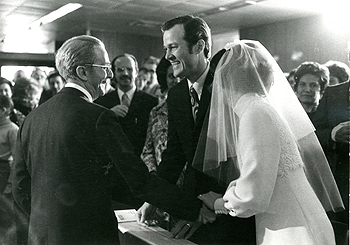
Jul 12, 2015 | Non categorizzato
 «The fundamental role of the family is to grow and multiply: give a boost to life, cooperate in the creative work of the Creator. Its unity is not interrupted but extended in its progeny, in whom the love between two spouses is incarnated. Unity becomes a person: father, mother and child make up a life in the image and resemblance, in some way, of the divinity that created and vivifies them. These are three points from which the cycle of love alone originates and is nurtured by God’s love. »(Giordani, 1942) By tracing the divine profile of the family, in a sense Giordani anticipated what the documents of Vatican II would declare upon underlining the privilege of the spouses in «cooperating in the creative work of the Creator,» and also in considering the family as a reflection of the life of the Trinity from which it inherits its design. In the 1980s this doctrine, so dear to St. John Paul II, would have become the basis of his historical catechesis on human love. Last 23 June, the Synod’s preparatory Commission diffused the Instrumentum Laboris, on which the Synod fathers would have to reflect next October, in order to propose to the Holy Father the possible solutions to be implemented in favour of the families. Focusing on the vocation and mission of the family, this document starts with an overview of the many problems besetting the family today and the serious cultural and social challenges undermining it. But the awareness of such critical factors has not only been felt in recent times. In1975 a letter of the Episcopacy of Quebec conveyed an alarming analysis to this regard. Giordani was so struck by it as to cite some passages of the letter at a certain point in his writings, in order to offer to families its luminous and prominent message: «The difficulties in life do not crush a family that is rooted in God while in too many cases,they destroy those that are established only on money. The strength of a family lies in the union of the couple, but union is the fruit of love. It is thus to their earthly and heavenly interest to love one another, and take the trials, sufferings and disillusions as a way of sanctifying themselves. Marriage not only unites the spouses to one another, but as father and mother, they are united to God. This unity in God, of man and woman, of parents and progeny, is the most profound sense of marriage and the family.» (Giordani, 1975) Prepared by the Igino Giordani Centre Excerpts from: Igino Giordani, Famiglia comunità d’amore, New City, Rome 2001 and Igino Giordani, La società cristiana, New City, Rome, 2010
«The fundamental role of the family is to grow and multiply: give a boost to life, cooperate in the creative work of the Creator. Its unity is not interrupted but extended in its progeny, in whom the love between two spouses is incarnated. Unity becomes a person: father, mother and child make up a life in the image and resemblance, in some way, of the divinity that created and vivifies them. These are three points from which the cycle of love alone originates and is nurtured by God’s love. »(Giordani, 1942) By tracing the divine profile of the family, in a sense Giordani anticipated what the documents of Vatican II would declare upon underlining the privilege of the spouses in «cooperating in the creative work of the Creator,» and also in considering the family as a reflection of the life of the Trinity from which it inherits its design. In the 1980s this doctrine, so dear to St. John Paul II, would have become the basis of his historical catechesis on human love. Last 23 June, the Synod’s preparatory Commission diffused the Instrumentum Laboris, on which the Synod fathers would have to reflect next October, in order to propose to the Holy Father the possible solutions to be implemented in favour of the families. Focusing on the vocation and mission of the family, this document starts with an overview of the many problems besetting the family today and the serious cultural and social challenges undermining it. But the awareness of such critical factors has not only been felt in recent times. In1975 a letter of the Episcopacy of Quebec conveyed an alarming analysis to this regard. Giordani was so struck by it as to cite some passages of the letter at a certain point in his writings, in order to offer to families its luminous and prominent message: «The difficulties in life do not crush a family that is rooted in God while in too many cases,they destroy those that are established only on money. The strength of a family lies in the union of the couple, but union is the fruit of love. It is thus to their earthly and heavenly interest to love one another, and take the trials, sufferings and disillusions as a way of sanctifying themselves. Marriage not only unites the spouses to one another, but as father and mother, they are united to God. This unity in God, of man and woman, of parents and progeny, is the most profound sense of marriage and the family.» (Giordani, 1975) Prepared by the Igino Giordani Centre Excerpts from: Igino Giordani, Famiglia comunità d’amore, New City, Rome 2001 and Igino Giordani, La società cristiana, New City, Rome, 2010

Jul 11, 2015 | Focolare Worldwide
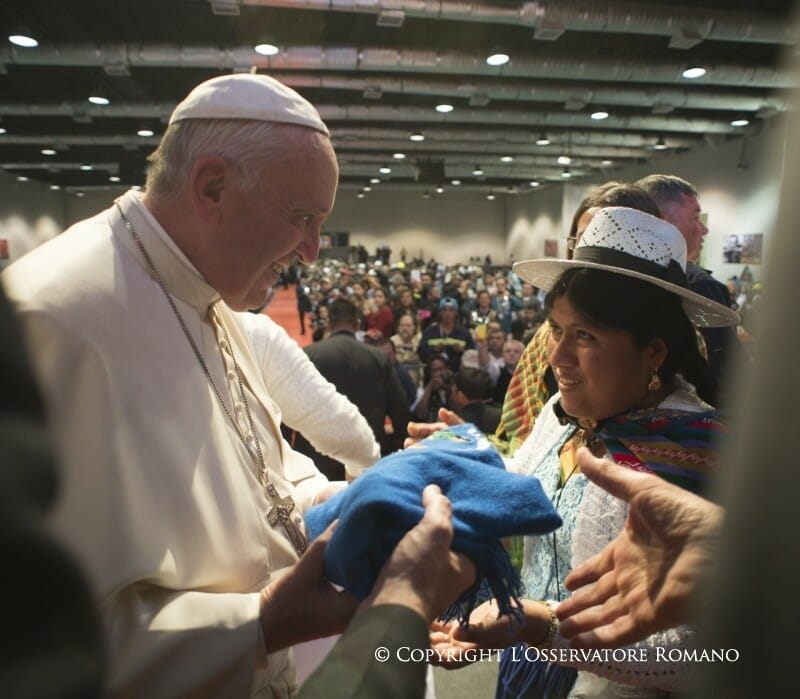 “I’ve discovered how the Pope favors the excluded. In some way it’s also my choice, but by his example I have understood how at times I continue to exclude, or I find myself in a group of people who keep silent in the midst of exclusions or injustices,” says Ana Maria Ceballos, a social worker in Bolivia. An impression that speaks of true conversion towards the excluded, one of the strongest themes of this step of the voyage of Pope Francis in Latin America. The same for Nestor Ariñez di Cochabamba, who lives in the Casa de los Ninos, a social project animated by the spirituality of unity: “In Palmasola the Pope said: reclusion is not the same as exclusion.” There, in the largest penitentiary in Bolivia, the most striking message was the pope’s “listening first of all, and then his saying that he too is a man who makes mistakes and who must do ‘penance.’ A message of hope for all the detainees.” “The pope’s visit to Bolivia leaves us with much to reflect upon,” he continues. “But I believe that what remains very clear is his preferential option for the poor, the motto of the Church in Latin America given to Puebla in 1979, which reminds us that the gospel brings the good news to everyone, but especially to those who are excluded and rejected by society. I felt that the Pope was speaking directly to us.” “His words are a call to conversion,” confides Pat, a Bolivian focolarina, after the meeting with priests, religious, and consecrated people. “But it is also much more: the sole fact of his presence in the midst of many ‘rare flowers of every age’ who one day said their yes to God, pushed me towards a greater commitment to sanctity, which then means to live with coherence the choice I made.” “Even from Bolivia, Pope Francis spoke to the whole world,” writes Lucas Cerviño, now 11 years in Bolivia, instructor in Missiology and intercultural theology. “At the mass in Santa Cruz there were many Latin Americans from nearby countries who listened to his call to not despair before the difficult situations that the world presents to us and that bring us to exclusion.” At the second meeting of popular movements, Pope Francis–before representatives from various continents who welcomed him with enthusiasm and attention–clearly indicated the way for social renewal, both local and global. “Land, Home, and Work,” continues Cerviño, “are sacred rights which permit us to dialogue with everyone in order to contribute to the common good. Pope Francis clearly highlighted for the members of social and popular movements that the fundamental aspect is the process, the starting of processes, for an economy at the service of peoples, to unite peoples on the way towards peace and justice, and for the defense of the homeland.” “Finally,” concludes Cerviño, “he left the Bolivian people a clear and beautiful consignment.” “Bolivia is at an historic crossroads: politics, the world of culture, the religions are all part of this beautiful challenge to grow in unity. In this land whose history has been marred by exploitation, greed and so many forms of selfishness and sectarianism, now is the time for integration. And this is a path we have to walk. Today Bolivia is capable, with its wealth, of creating new forms of cultural synthesis. How beautiful are those cities which overcome paralyzing mistrust, integrate those who are different and make this very integration a new factor of development! How attractive it is when those cities are full of spaces which connect, relate and favor the recognition of others! Bolivia in its process of integration and its search for unity, is called to be an example of such ‘multifaceted and inviting harmony,’ a harmony which invites along the path of strengthening the greater country.”
“I’ve discovered how the Pope favors the excluded. In some way it’s also my choice, but by his example I have understood how at times I continue to exclude, or I find myself in a group of people who keep silent in the midst of exclusions or injustices,” says Ana Maria Ceballos, a social worker in Bolivia. An impression that speaks of true conversion towards the excluded, one of the strongest themes of this step of the voyage of Pope Francis in Latin America. The same for Nestor Ariñez di Cochabamba, who lives in the Casa de los Ninos, a social project animated by the spirituality of unity: “In Palmasola the Pope said: reclusion is not the same as exclusion.” There, in the largest penitentiary in Bolivia, the most striking message was the pope’s “listening first of all, and then his saying that he too is a man who makes mistakes and who must do ‘penance.’ A message of hope for all the detainees.” “The pope’s visit to Bolivia leaves us with much to reflect upon,” he continues. “But I believe that what remains very clear is his preferential option for the poor, the motto of the Church in Latin America given to Puebla in 1979, which reminds us that the gospel brings the good news to everyone, but especially to those who are excluded and rejected by society. I felt that the Pope was speaking directly to us.” “His words are a call to conversion,” confides Pat, a Bolivian focolarina, after the meeting with priests, religious, and consecrated people. “But it is also much more: the sole fact of his presence in the midst of many ‘rare flowers of every age’ who one day said their yes to God, pushed me towards a greater commitment to sanctity, which then means to live with coherence the choice I made.” “Even from Bolivia, Pope Francis spoke to the whole world,” writes Lucas Cerviño, now 11 years in Bolivia, instructor in Missiology and intercultural theology. “At the mass in Santa Cruz there were many Latin Americans from nearby countries who listened to his call to not despair before the difficult situations that the world presents to us and that bring us to exclusion.” At the second meeting of popular movements, Pope Francis–before representatives from various continents who welcomed him with enthusiasm and attention–clearly indicated the way for social renewal, both local and global. “Land, Home, and Work,” continues Cerviño, “are sacred rights which permit us to dialogue with everyone in order to contribute to the common good. Pope Francis clearly highlighted for the members of social and popular movements that the fundamental aspect is the process, the starting of processes, for an economy at the service of peoples, to unite peoples on the way towards peace and justice, and for the defense of the homeland.” “Finally,” concludes Cerviño, “he left the Bolivian people a clear and beautiful consignment.” “Bolivia is at an historic crossroads: politics, the world of culture, the religions are all part of this beautiful challenge to grow in unity. In this land whose history has been marred by exploitation, greed and so many forms of selfishness and sectarianism, now is the time for integration. And this is a path we have to walk. Today Bolivia is capable, with its wealth, of creating new forms of cultural synthesis. How beautiful are those cities which overcome paralyzing mistrust, integrate those who are different and make this very integration a new factor of development! How attractive it is when those cities are full of spaces which connect, relate and favor the recognition of others! Bolivia in its process of integration and its search for unity, is called to be an example of such ‘multifaceted and inviting harmony,’ a harmony which invites along the path of strengthening the greater country.”
Jul 11, 2015 | Focolare Worldwide
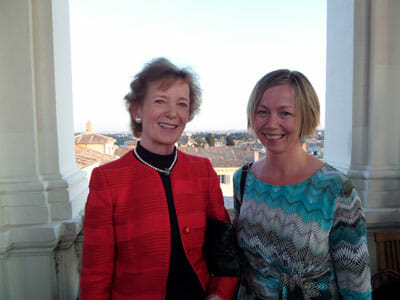
Jul 9, 2015 | Non categorizzato
 180 people from over 40 nations: activists, NGOs, social movements, scientists, religious congregations, activists from the Catholic world and beyond, together to discover concrete ways of responding to Pope Francis’s encyclical Laudato Si’. Environmental experts Lorna Gold from Ireland and John Mundell from the United States attended as representatives of the Focolare Movement and Eco-One. For over 13 years Lorna Gold has worked in the field of the environment at Trocaire-Overseas Development Agency of the Catholic Church in Ireland. John Mundell is president of an environmental consultant agency in Indianapolis, Mundell & Associates, Inc., which adheres to the Economy of Communion. “The most important thing about this conference is the diversity among the people, organisers and ethnic groups that came together to give an immediate response to the Pope’s Encyclical,” Lorna Gold says. “We’ve come here from the whole world and in the name of civil society. There are activists like Naomi Klein, a world-renowned writer on the topics concerning ecology and economy in an age of globalisation; there are people from ecological movements like the head of Greenpeace, Kumi Naido; there is the entire network of the CIDSE-NGO, Catholics who work for social and global justice.” The three-day meeting gave the sense of a movement in the act of helping to incarnate the ideals of the Si’ Encyclical. Among the examples that were presented there was also the The Earth Cube™, created by Eco-One, a network of professionals from the field of the environment who are inspired by the spirituality of unity. The difficulties and the complexities of the environmental problem were on the minds of all: a problem not only for science and of the earth, but also for the economy and politics. Often the choices in these environments go directly against nature and generate more poverty but, according to Naomi Klein, something can still be done: “We could prevent so much suffering. We can’t justify doing nothing, because it’s difficult. Don’t let perfect win good. We need difficult, but possible, instead of easy yet reprehensible. Stop making the difficult a limit for possible, and let possible be real.” The reverse route is possible if there is enough strength to face the problem. The presence of so many people directly involved on many different fronts gives much hope, and it made everyone experience what Pope Francis says in the Encyclical: the whole is more than the sum of its parts. John Mundell highlighted another novelty at the meeting: “The role of women as protagonists in the discussion and debate on climate change. In this summit we almost saw a vision of the future of the Church: open, in dialogue with the world, seeking relations with all people of good will, to bring ahead a more united world, more in contact with the planet.” Laudato Si’ invites us to rethink our lifestyle. As Naomi Klein said: “This is not only a teaching for the Catholic world, and as a secular Jewish feminist, I can say I felt this Encyclical also talking to me.” https://vimeo.com/133043698
180 people from over 40 nations: activists, NGOs, social movements, scientists, religious congregations, activists from the Catholic world and beyond, together to discover concrete ways of responding to Pope Francis’s encyclical Laudato Si’. Environmental experts Lorna Gold from Ireland and John Mundell from the United States attended as representatives of the Focolare Movement and Eco-One. For over 13 years Lorna Gold has worked in the field of the environment at Trocaire-Overseas Development Agency of the Catholic Church in Ireland. John Mundell is president of an environmental consultant agency in Indianapolis, Mundell & Associates, Inc., which adheres to the Economy of Communion. “The most important thing about this conference is the diversity among the people, organisers and ethnic groups that came together to give an immediate response to the Pope’s Encyclical,” Lorna Gold says. “We’ve come here from the whole world and in the name of civil society. There are activists like Naomi Klein, a world-renowned writer on the topics concerning ecology and economy in an age of globalisation; there are people from ecological movements like the head of Greenpeace, Kumi Naido; there is the entire network of the CIDSE-NGO, Catholics who work for social and global justice.” The three-day meeting gave the sense of a movement in the act of helping to incarnate the ideals of the Si’ Encyclical. Among the examples that were presented there was also the The Earth Cube™, created by Eco-One, a network of professionals from the field of the environment who are inspired by the spirituality of unity. The difficulties and the complexities of the environmental problem were on the minds of all: a problem not only for science and of the earth, but also for the economy and politics. Often the choices in these environments go directly against nature and generate more poverty but, according to Naomi Klein, something can still be done: “We could prevent so much suffering. We can’t justify doing nothing, because it’s difficult. Don’t let perfect win good. We need difficult, but possible, instead of easy yet reprehensible. Stop making the difficult a limit for possible, and let possible be real.” The reverse route is possible if there is enough strength to face the problem. The presence of so many people directly involved on many different fronts gives much hope, and it made everyone experience what Pope Francis says in the Encyclical: the whole is more than the sum of its parts. John Mundell highlighted another novelty at the meeting: “The role of women as protagonists in the discussion and debate on climate change. In this summit we almost saw a vision of the future of the Church: open, in dialogue with the world, seeking relations with all people of good will, to bring ahead a more united world, more in contact with the planet.” Laudato Si’ invites us to rethink our lifestyle. As Naomi Klein said: “This is not only a teaching for the Catholic world, and as a secular Jewish feminist, I can say I felt this Encyclical also talking to me.” https://vimeo.com/133043698
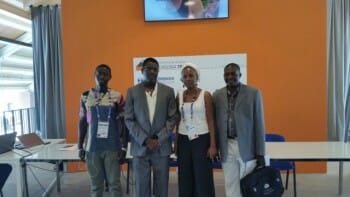
Jul 8, 2015 | Focolare Worldwide
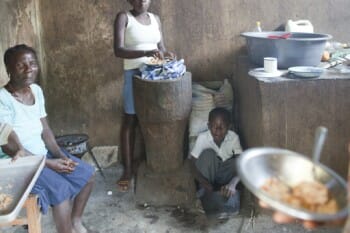 “Haiti, once one of the most prosperous French colonies, Pearl of the Antilles, today is amongst the poorest countries in the world, devastated by a serious ecological catastrophe,” says Ronald La Rêche, ex-deputy and candidate for the senate of Mont Organizé. Thousands of people live without access to traditional forms of energy such as electricity and gas. The constant recourse to firewood has led to to deforestation, which has a direct negative impact on climate change, causing desertification and progressive diminishment of the water supply. This led to the idea of supporting the Haitian population with the help of renewable energy, especially solar energy. The “Cucine solari per Mont-Organizé Project was conceived by the AFN, an association inspired by Focolare values – in collaboration with PACNE (Action contre la Pauvreté du Nord Est), the NationalMicrocredit Entity, the Agriculture Department of the Università degli Studi di Napoli “Federico II” , Tesla I.A. Ltd., and the SIOI (Società Italiana per l’Organizzazione Internazionale). Its goal is to introduce solar power cookers in the centres that are supported by AFN in the Mont-Organisé Haiti territory of Mont-Organisé. The solar cooker uses very simple technology, easy maintenance and installation, and it is possible to learn how to assemble it on site, favoring its dissemination amongst the community. It consists of a device based on a system of solar concentration. Through a lens, solar energy is transformed into thermal energy which is then stored in a battery. The project was presented on Saturday, July 4, 2015 at the “Cucine Solari, una risposta alle problematiche dei Paesi in via di sviluppo,” of EXPO di Milano 2015 in the Cascina Triulza-Civil Society Pavillion. President of the AFN, Andrea Turatti, explains: “The process we propose would use the solar cooker in schools, with the help of the AFN in Mont- Organizé, a rural area in the borough of Ouanaminthe, North-East Haiti. The next steps will be to train the teachers who, in turn, will train families and involve the local population in microcredit projects.”
“Haiti, once one of the most prosperous French colonies, Pearl of the Antilles, today is amongst the poorest countries in the world, devastated by a serious ecological catastrophe,” says Ronald La Rêche, ex-deputy and candidate for the senate of Mont Organizé. Thousands of people live without access to traditional forms of energy such as electricity and gas. The constant recourse to firewood has led to to deforestation, which has a direct negative impact on climate change, causing desertification and progressive diminishment of the water supply. This led to the idea of supporting the Haitian population with the help of renewable energy, especially solar energy. The “Cucine solari per Mont-Organizé Project was conceived by the AFN, an association inspired by Focolare values – in collaboration with PACNE (Action contre la Pauvreté du Nord Est), the NationalMicrocredit Entity, the Agriculture Department of the Università degli Studi di Napoli “Federico II” , Tesla I.A. Ltd., and the SIOI (Società Italiana per l’Organizzazione Internazionale). Its goal is to introduce solar power cookers in the centres that are supported by AFN in the Mont-Organisé Haiti territory of Mont-Organisé. The solar cooker uses very simple technology, easy maintenance and installation, and it is possible to learn how to assemble it on site, favoring its dissemination amongst the community. It consists of a device based on a system of solar concentration. Through a lens, solar energy is transformed into thermal energy which is then stored in a battery. The project was presented on Saturday, July 4, 2015 at the “Cucine Solari, una risposta alle problematiche dei Paesi in via di sviluppo,” of EXPO di Milano 2015 in the Cascina Triulza-Civil Society Pavillion. President of the AFN, Andrea Turatti, explains: “The process we propose would use the solar cooker in schools, with the help of the AFN in Mont- Organizé, a rural area in the borough of Ouanaminthe, North-East Haiti. The next steps will be to train the teachers who, in turn, will train families and involve the local population in microcredit projects.”  Attention to green technologies and overall sustainability were among the innovation cited by Luigino Bruni, professor of Economics at the University of Rome (LUMSA), and coordinator of the Economy of Communion. Then there is “the exploitation of local resources (such as the sun), the materials at the site, and the involvement of the population.” The economist said: “This is where the true success of the project is played out. It will work to the extent in which it is seen as a true opportunity by the local population.” Focolare president, Maria Voce, wrote: “The Cucine solari” project is in sync with the teachings of Pope Francis who has focused attention on the environment, making integral ecology the main focus of his encyclical letter Laudato si’, that is, the relationship beteen nature and the people who live in it. [. . .] This project that is founded on care for the environment and sustainable development from within the communities that benefit, can offer valid answers to the urgent problems of the country. The project seeks a resolution to the environmental crisis, health, nutrition, and energy supply with an eye toward the basic needs of the most weakest and most vulnerable. It utilises solar energy, while being mindful and respectful of the local culture, offering opportunity for development and social inclusion of the most disadvantaged, such as the children who receive support and education in Focolare schools.
Attention to green technologies and overall sustainability were among the innovation cited by Luigino Bruni, professor of Economics at the University of Rome (LUMSA), and coordinator of the Economy of Communion. Then there is “the exploitation of local resources (such as the sun), the materials at the site, and the involvement of the population.” The economist said: “This is where the true success of the project is played out. It will work to the extent in which it is seen as a true opportunity by the local population.” Focolare president, Maria Voce, wrote: “The Cucine solari” project is in sync with the teachings of Pope Francis who has focused attention on the environment, making integral ecology the main focus of his encyclical letter Laudato si’, that is, the relationship beteen nature and the people who live in it. [. . .] This project that is founded on care for the environment and sustainable development from within the communities that benefit, can offer valid answers to the urgent problems of the country. The project seeks a resolution to the environmental crisis, health, nutrition, and energy supply with an eye toward the basic needs of the most weakest and most vulnerable. It utilises solar energy, while being mindful and respectful of the local culture, offering opportunity for development and social inclusion of the most disadvantaged, such as the children who receive support and education in Focolare schools.
Jul 6, 2015 | Focolare Worldwide
Teaching methodology: an interactive approach, open to dialogue, sharing, and re-working with the instructors, experts, and students together, through seminars, workshops, and debates. Subject matter: proposals, analysed and studied in the preceding 6 months by an international preparatory committee formed by several of the participating students with the co-operation of the experts.
- Relationships in healthcare activities
- Ethics in daily clinical practice, starting with several documents from international medical institutions, and finishing with clinical experiences on aspects such as end of life care.
Participants: students and young people from 20 to 35 years of age in the various professions of the biomedical field (medical doctors, nurses, physiotherapists, occupational therapists, etc.) coming from various countries. Maximum number of participants: 50 Languages: Portuguese, English, Italian, Spanish Objectives: Offer to healthcare professionals the skills necessary to care for the person and not only the pathology, and to remedy the fragmentation of care, guaranteeing that professionals are united in taking responsibility for the patient. At the end of the programme, a certificate of participation will be issued. Location: Cidadela Arco-Iris, Rua Senhora da Graça, 60 2580-042 Abrigada Tel. +351 263 799 995 + 351 263 790 131 Fax: + 351 263 799 091 Hours: The programme will start September 3rd at 9:00 a.m. and will conclude September 6th at 1:00 p.m. Cost: The cost, including meals and lodging for all days of the Summer School (starting with dinner September 2nd and ending with lunch on September 6th), transportation from the Lisbon airport to the location and return trip, and the touristic excursion to Lisbon, is 180€. Enrollment: Complete and send the registration form (www.mdc-net.org) to the address: mdc@flars.net. Registration will be accepted after the receipt of payment by means of a bank transfer to: ASSOCIAZIONE MEDICINA DIALOGO COMUNIONE (M.D.C.) IBAN: IT68L0335901600100000113321 BIC: BCITITMX For more information, please contact mdc@flars.net. ——————————————————————— Associazione Medicina Dialogo Comunione Via IV Novembre 7, 00046 GROTTAFERRATA (RM) Fax 06-94549841 Email: mdc@flars.net Website: www.mdc-net.org

Jul 6, 2015 | Focolare Worldwide
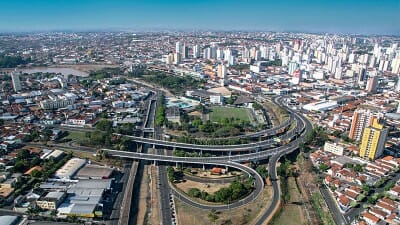 It was in the air. Too many times João had heard his parents argue, and the fact that he and his mother and brothers had to leave home because his father had a child with another woman didn’t surprise him very much. He was 16 then, he was involved in his parish, he had friends. Within him, though, he felt betrayed and dissatisfied, with a strong need for freedom, to be himself. It was an apprehension that led him to discontinue his studies. He took up his schooling again years later, only after he had found the real reason for living. “At 20 years of age,” recounts João, “I participated in a Focolare activity with the youth group from my parish. During those few days, I realized that the Gospel isn’t so much to be commented or reflected upon, as it is to be put into practice immediately. I was particularly struck by those passages which say how to treat our neighbors: the Good Samaritan, the Golden Rule. I had gone to the activity out of pure curiosity, and instead it was the event which changed my life.” In Sao José do Rio Preto (State of Sao Paulo), which is my hometown, there are many people who live on the street. One evening, as I was going back home on my bicycle, I crossed paths with a man who was walking barefoot. His feet were dirty and wounded. At the sight of him, I couldn’t pedal any further. “That man is my neighbor, I have to go back to him.” Before I reached him, I took off my shoes to give them to him. He looked at me, surprised. I saw that he was wearing a T-shirt with my favorite soccer team on it, and I said to him, to take away his embarrassment, “So you’re a Santista fan? So am I! What’s your name?” He took the shoes, and we became friends.
It was in the air. Too many times João had heard his parents argue, and the fact that he and his mother and brothers had to leave home because his father had a child with another woman didn’t surprise him very much. He was 16 then, he was involved in his parish, he had friends. Within him, though, he felt betrayed and dissatisfied, with a strong need for freedom, to be himself. It was an apprehension that led him to discontinue his studies. He took up his schooling again years later, only after he had found the real reason for living. “At 20 years of age,” recounts João, “I participated in a Focolare activity with the youth group from my parish. During those few days, I realized that the Gospel isn’t so much to be commented or reflected upon, as it is to be put into practice immediately. I was particularly struck by those passages which say how to treat our neighbors: the Good Samaritan, the Golden Rule. I had gone to the activity out of pure curiosity, and instead it was the event which changed my life.” In Sao José do Rio Preto (State of Sao Paulo), which is my hometown, there are many people who live on the street. One evening, as I was going back home on my bicycle, I crossed paths with a man who was walking barefoot. His feet were dirty and wounded. At the sight of him, I couldn’t pedal any further. “That man is my neighbor, I have to go back to him.” Before I reached him, I took off my shoes to give them to him. He looked at me, surprised. I saw that he was wearing a T-shirt with my favorite soccer team on it, and I said to him, to take away his embarrassment, “So you’re a Santista fan? So am I! What’s your name?” He took the shoes, and we became friends.  I was at the train station, returning from a meeting held in another city. At that hour–two o’clock in the morning–the means of public transportation no longer run, and so I started towards home on foot, crossing the center of the city. Looking around, I saw lots of people who took advantage of the fact that stores were closed to sleep in front of the shop windows. I wasn’t afraid, because this was my hometown. At one point, however, a big, tall man came up to me and asked for money. I must confess that I started to be a little afraid. Who was to say that he wasn’t violent? But I thought, “He, too, is my brother, the Gospel says so.” Calmly, I told him that I couldn’t give him anything because I had no money either. He began to tell me his story, then he had me put on his headphones. He was listening to a sermon by a Protestant pastor. I listened to the transmission for a bit, so that I could tell him that this person was saying nice things and that it’s good to listen to these positive messages every so often. He asked me, “Who are you?” Not knowing how to respond, I asked him why he wanted to know. He said, “Because nobody treats us this well.” This went on for 30 or 40 minutes. I thought about the distance I still needed to travel in order to arrive home, about the fact that I needed to wake up at 6 the next morning to go to work. But I felt that I had to stay a while longer to accommodate this neighbor who needed company and listening. In the end, after he had asked for my address in order to come to my house for a barbecue, we said goodbye, with the knowledge that we had each found a brother. One rainy day, as I was returning home on my motorcycle, I saw a man, soaking wet, who was trying without success to get up from a puddle. I recognized him: he was one of my next-door neighbors who was always drunk. In the nearby bar, there were several men who simply watched the scene without doing anything. Trying not to get angry, I stopped, left the motorcycle there and accompanied him home, explaining to his wife what had happened. Then I retraced my steps to go back for the motorcycle. As I walked, a phrase re-echoed deep in my heart: “You did it to Me.” I was no longer angry. It was enough for me to feel happy and to not blame those men, astonished, who continued to watch me.
I was at the train station, returning from a meeting held in another city. At that hour–two o’clock in the morning–the means of public transportation no longer run, and so I started towards home on foot, crossing the center of the city. Looking around, I saw lots of people who took advantage of the fact that stores were closed to sleep in front of the shop windows. I wasn’t afraid, because this was my hometown. At one point, however, a big, tall man came up to me and asked for money. I must confess that I started to be a little afraid. Who was to say that he wasn’t violent? But I thought, “He, too, is my brother, the Gospel says so.” Calmly, I told him that I couldn’t give him anything because I had no money either. He began to tell me his story, then he had me put on his headphones. He was listening to a sermon by a Protestant pastor. I listened to the transmission for a bit, so that I could tell him that this person was saying nice things and that it’s good to listen to these positive messages every so often. He asked me, “Who are you?” Not knowing how to respond, I asked him why he wanted to know. He said, “Because nobody treats us this well.” This went on for 30 or 40 minutes. I thought about the distance I still needed to travel in order to arrive home, about the fact that I needed to wake up at 6 the next morning to go to work. But I felt that I had to stay a while longer to accommodate this neighbor who needed company and listening. In the end, after he had asked for my address in order to come to my house for a barbecue, we said goodbye, with the knowledge that we had each found a brother. One rainy day, as I was returning home on my motorcycle, I saw a man, soaking wet, who was trying without success to get up from a puddle. I recognized him: he was one of my next-door neighbors who was always drunk. In the nearby bar, there were several men who simply watched the scene without doing anything. Trying not to get angry, I stopped, left the motorcycle there and accompanied him home, explaining to his wife what had happened. Then I retraced my steps to go back for the motorcycle. As I walked, a phrase re-echoed deep in my heart: “You did it to Me.” I was no longer angry. It was enough for me to feel happy and to not blame those men, astonished, who continued to watch me.
Jul 6, 2015 | Focolare Worldwide
” I want to be a witness of this joy of the Gospel and bring to you the tenderness and caress of God, our Father, especially to his children most in need, to the elderly, the sick, the imprisoned, the poor, to those who are victims of this throwaway culture.” Pope Francis spoke from the heart in the video message to his “dear brothers and sisters of Ecuador, Bolivia, and Paraguay,” on the eve of the voyage that from July 5th to 13th will bring him to three South American countries, praying “that the announcement of the Gospel can reach to the farthest outskirts and continue to make the values of the Kingdom of God a leaven of the earth in our days as well.” https://www.youtube.com/watch?v=A5QEBJ8-IJw “Right from the preparations we sensed that this visit would be a providential grace for the people of God in this land,” write Bernadita and Fabián, who are responsible for the Focolare Movement in Ecuador. Inés Loato is on the organizing committee. She remembers with gratitude the path undertaken in just two months of preparation: “it has been a new discovery meeting members of other Movements and church communities, a tremendous richness. We all feel we are truly brothers and sisters.” In this period they sought to “testify to this love as preparation for the grace that we will surely receive.” Many others were involved as volunteers, thousands throughout the country: “Joy, humility and love are the three consignments that the Church has given us for our volunteer work,” explains Adriana Guallasamin, a young volunteer and coordinator in the formation sector. A mission of “proclamation, door to door, in contact with many people who are far from the Church, but slowly responded to the invitation to help with the logistics.” “I am grateful to God,” she concludes, ” for this unique opportunity to serve the Church.” What to expect from the pope’s packed schedule, in the first stop in Ecuador (http://papafranciscoenecuador.com/) There are the two mid-ocean masses in Guayaquil and Quito, a meeting with the world of education, with representatives of civil society, a visit to the Sisters of Mother Teresa nursing home, a meeting with priests, religious brothers and sisters, seminarians, and the Bishops of the nation. In addition to the greeting for President Correa and the visit to the Cathedral of Quito and the Church of the Company. In Bolivia (http://www.franciscoenbolivia.org/) with the motto, “Renewal and Reconciliation,” awaits –among other appointments–the 2nd World Meeting of Popular Movements and a visit to the imprisoned in the Center of Reeducation in Palmasola. In Paraguay (https://franciscoenparaguay.org/) the visit to a pediatric hospital and the inhabitants of a barrio (neighborhood) in the capital city, Asunción. The voyage concludes with a meeting with young people on the riverfront, Costanera: “messenger of joy and peace,” or as they say in guarani, the official language of Paraguay along with Spanish, to highlight the cultural variety and preciousness : Oguerúva vy’a ha py’aguapy.

Jul 4, 2015 | Non categorizzato
 «The modern world with its secularism, has moved away from God because […] it had not received sufficient explanations on the fact that man was God, had been divinised, and was not only dependent on an estranged and remote being: it was in a mysterious manner another small God, due to its participation in the divine nature through Jesus’s life, and particularly through the Eucharist. When I reconsider some of Marx’s writings, in which he negates the value of religion precisely because it alienates man, making him a stranger to his own self, exactly because it makes him depend on something that is external to himself, I think that if he had only known that man finds his divinisation and thus his independence in the trinitarian sense, he would never have come to think the way he did.[…] The same goes also for Hegel, from which Marx drew inspiration; the same can be said of the immanentists, all those who negated God in order to uphold man, up to Sartre, Camus and so on. Sartre had said: «there cannot be a God, because if so, I would not exist,» precisely because he would crush me. This is not so since God who became man, made you God, making you share his divine nature.[…] Day by day we see how none of humanity’s problems can be resolved singularly, and neither by particular groups nor national groups. The problems now have to be resolved in a collegial manner, giving rise to that unity Jesus had brought. And we know that this unity can rarely be created without a spiritual life. In short, it is by creating a community of bodies that a community of persons is created, and this is only possible if these persons are nurtured by something which harmonises them tas one. This something may, in a remote sense, be science, or the research man has initiated. But what most of all creates unity is Man par excellence, that is, Jesus. He is the one who makes us men and makes us a community. […] The Eucharist, on one hand, is an immense mystery. On the other, it is a banquet which is a natural convergence of human fraternity. […]The Eucharist is the soul, and must become the soul of this sociality.» Excerpt of: Luce che si incarna, comment on the 12 points of the spirituality, Pasquale Foresi, New City 2014, pp.107-109
«The modern world with its secularism, has moved away from God because […] it had not received sufficient explanations on the fact that man was God, had been divinised, and was not only dependent on an estranged and remote being: it was in a mysterious manner another small God, due to its participation in the divine nature through Jesus’s life, and particularly through the Eucharist. When I reconsider some of Marx’s writings, in which he negates the value of religion precisely because it alienates man, making him a stranger to his own self, exactly because it makes him depend on something that is external to himself, I think that if he had only known that man finds his divinisation and thus his independence in the trinitarian sense, he would never have come to think the way he did.[…] The same goes also for Hegel, from which Marx drew inspiration; the same can be said of the immanentists, all those who negated God in order to uphold man, up to Sartre, Camus and so on. Sartre had said: «there cannot be a God, because if so, I would not exist,» precisely because he would crush me. This is not so since God who became man, made you God, making you share his divine nature.[…] Day by day we see how none of humanity’s problems can be resolved singularly, and neither by particular groups nor national groups. The problems now have to be resolved in a collegial manner, giving rise to that unity Jesus had brought. And we know that this unity can rarely be created without a spiritual life. In short, it is by creating a community of bodies that a community of persons is created, and this is only possible if these persons are nurtured by something which harmonises them tas one. This something may, in a remote sense, be science, or the research man has initiated. But what most of all creates unity is Man par excellence, that is, Jesus. He is the one who makes us men and makes us a community. […] The Eucharist, on one hand, is an immense mystery. On the other, it is a banquet which is a natural convergence of human fraternity. […]The Eucharist is the soul, and must become the soul of this sociality.» Excerpt of: Luce che si incarna, comment on the 12 points of the spirituality, Pasquale Foresi, New City 2014, pp.107-109

 Pasquale Foresi commented many times on the theology of the charism of Chiara Lubich, underscoring its novelty for both living and thinking. Between 1990 and 1998 he was often called upon to answer questions that were posed by members of the Movement from a variety of vocational, cultural and geographical backgrounds. On one of these occasions he was asked for advice on how to live humility[1]. “Being humble simply means accepting to be who you are,” he said. “And all of us are sinners. If anyone says ‘I’m not a sinner,’ he lies; so all of us can have humility all the time. Saint Benedict’s outline seems quite wise to me and has always helped me to live. It could be summarised as follows: The first step for being humble is to accept humiliations, mortifications. . . One day, someone speaks badly of you at the office, in your workplace; there might be a misunderstanding between you and someone else, or even a calumny. . . You need to be able accept these tribulations and difficulties. The second step is to love humiliations, which is more than accepting them. This is the case, for example, when we have given our life for others and judgement and accusation begin to arise amongst the people for whom we have done much. These criticisms can have a basis in reality but are exaggerated. It is difficult to love such humiliations, but they’re beneficial for growing in the life of God. The third step is to prefer humiliations not only loving them, but being happy over them. As when someone speaks badly of you and you say: ‘This is a grace from God that I am receiving. . .” This is the highest grade which all of us should tend towards, because it returns us to that humility which draws us together. Obviously, the calumnies should always be clarified but with detachment, living the Gospel that says “Blessed are you when, lying, they will utter every sort of evil against you because of me. Rejoice and be glad because your reward is great in Heaven.” [1] Foresi, Pasquale. COLLOQUI, domande e risposte sulla spiritualità dell’unità, (Rome: Città Nuova Publishing House, 2009) p. 64.
Pasquale Foresi commented many times on the theology of the charism of Chiara Lubich, underscoring its novelty for both living and thinking. Between 1990 and 1998 he was often called upon to answer questions that were posed by members of the Movement from a variety of vocational, cultural and geographical backgrounds. On one of these occasions he was asked for advice on how to live humility[1]. “Being humble simply means accepting to be who you are,” he said. “And all of us are sinners. If anyone says ‘I’m not a sinner,’ he lies; so all of us can have humility all the time. Saint Benedict’s outline seems quite wise to me and has always helped me to live. It could be summarised as follows: The first step for being humble is to accept humiliations, mortifications. . . One day, someone speaks badly of you at the office, in your workplace; there might be a misunderstanding between you and someone else, or even a calumny. . . You need to be able accept these tribulations and difficulties. The second step is to love humiliations, which is more than accepting them. This is the case, for example, when we have given our life for others and judgement and accusation begin to arise amongst the people for whom we have done much. These criticisms can have a basis in reality but are exaggerated. It is difficult to love such humiliations, but they’re beneficial for growing in the life of God. The third step is to prefer humiliations not only loving them, but being happy over them. As when someone speaks badly of you and you say: ‘This is a grace from God that I am receiving. . .” This is the highest grade which all of us should tend towards, because it returns us to that humility which draws us together. Obviously, the calumnies should always be clarified but with detachment, living the Gospel that says “Blessed are you when, lying, they will utter every sort of evil against you because of me. Rejoice and be glad because your reward is great in Heaven.” [1] Foresi, Pasquale. COLLOQUI, domande e risposte sulla spiritualità dell’unità, (Rome: Città Nuova Publishing House, 2009) p. 64.





































 Geneva, Switzerland, Rue de Montbrillant, n. 3. Like every other Friday I go to Jardin de Montbrillant, a welcome centre for needy people in this cosmopolitan city where you can have a free hot meal. Today, as always, at noontime, we welcome around 150 people of every nationality. The room is already full and everything is going fine. Amidst the usual faces in the diverse crowd I always notice someone new. My task is to find a place for each of them, to negotiate with one or another so that they will allow someone new to have a place to sit and eat in peace, which isn’t always easy given the physical and psychological state of many of the majority of our guests. But I’m mainly interested in giving a fraternal touch, to comfort the ones who are sad, depressed – to listen to the ones who feel desperate, to offer them some hope. . . In other words, to create a family atmosphere so that everyone feels loved just the way they are, beyond the diversity of ages, nationalities and religions. While we’re at table, the door opens and three of our Arab friends arrive accompanied by two newcomers. I immediately notice the hard, threatening looks on their faces. As soon as they are inside, they begin shouting that they want to massacre everyone and burn the place to the ground. The reason: they feel seriously offended by the caricatures of the Prophet that appeared previous days in the press, the main news of the week. The atmosphere immediately becomes tense and people propose violence. I already see plates flying and fists showering down blows. It’s time to act without delay, because the situation could quickly worsen. But what shall I say? What shall I do? I feel powerless but recognise in this acute suffering of today’s society that defends absolute freedom at the expense of deep values, the cry of the God-Man upon the Cross: “My God, my God, why have you abandoned me?” This is Him before me now, through the reaction of this pair of Muslim followers. I place everything in His hands and stand up to go and meet them. I tell them that I share their pain and offer to talk about it after having something to eat if they would care to. In answer to my peaceful offer they allow themselves to be convinced to take a place at table. Suddenly their aggressiveness abates and tranquility returns, as if everyone perfectly understood the cause of their angry outburst. Lunch ends peacefully. I stay near them, trying to make them feel all the human warmth that I’m capable of. After lunch they apologize for their words and express regret for having voiced thoughts of revenge. This is followed by a moment of sharing about our respective faiths in total respect and mutual understanding. Before leaving, they embrace me, thankful for having been listened to. Now their relaxed faces express different sentiments than before. (Paquita Nosal –
Geneva, Switzerland, Rue de Montbrillant, n. 3. Like every other Friday I go to Jardin de Montbrillant, a welcome centre for needy people in this cosmopolitan city where you can have a free hot meal. Today, as always, at noontime, we welcome around 150 people of every nationality. The room is already full and everything is going fine. Amidst the usual faces in the diverse crowd I always notice someone new. My task is to find a place for each of them, to negotiate with one or another so that they will allow someone new to have a place to sit and eat in peace, which isn’t always easy given the physical and psychological state of many of the majority of our guests. But I’m mainly interested in giving a fraternal touch, to comfort the ones who are sad, depressed – to listen to the ones who feel desperate, to offer them some hope. . . In other words, to create a family atmosphere so that everyone feels loved just the way they are, beyond the diversity of ages, nationalities and religions. While we’re at table, the door opens and three of our Arab friends arrive accompanied by two newcomers. I immediately notice the hard, threatening looks on their faces. As soon as they are inside, they begin shouting that they want to massacre everyone and burn the place to the ground. The reason: they feel seriously offended by the caricatures of the Prophet that appeared previous days in the press, the main news of the week. The atmosphere immediately becomes tense and people propose violence. I already see plates flying and fists showering down blows. It’s time to act without delay, because the situation could quickly worsen. But what shall I say? What shall I do? I feel powerless but recognise in this acute suffering of today’s society that defends absolute freedom at the expense of deep values, the cry of the God-Man upon the Cross: “My God, my God, why have you abandoned me?” This is Him before me now, through the reaction of this pair of Muslim followers. I place everything in His hands and stand up to go and meet them. I tell them that I share their pain and offer to talk about it after having something to eat if they would care to. In answer to my peaceful offer they allow themselves to be convinced to take a place at table. Suddenly their aggressiveness abates and tranquility returns, as if everyone perfectly understood the cause of their angry outburst. Lunch ends peacefully. I stay near them, trying to make them feel all the human warmth that I’m capable of. After lunch they apologize for their words and express regret for having voiced thoughts of revenge. This is followed by a moment of sharing about our respective faiths in total respect and mutual understanding. Before leaving, they embrace me, thankful for having been listened to. Now their relaxed faces express different sentiments than before. (Paquita Nosal – 



















 “I’ve discovered how the Pope favors the excluded. In some way it’s also my choice, but by his example I have understood how at times I continue to exclude, or I find myself in a group of people who keep silent in the midst of exclusions or injustices,” says Ana Maria Ceballos, a social worker in Bolivia. An impression that speaks of true conversion towards the excluded, one of the strongest themes of this step of the voyage of Pope Francis in Latin America. The same for Nestor Ariñez di Cochabamba, who lives in the
“I’ve discovered how the Pope favors the excluded. In some way it’s also my choice, but by his example I have understood how at times I continue to exclude, or I find myself in a group of people who keep silent in the midst of exclusions or injustices,” says Ana Maria Ceballos, a social worker in Bolivia. An impression that speaks of true conversion towards the excluded, one of the strongest themes of this step of the voyage of Pope Francis in Latin America. The same for Nestor Ariñez di Cochabamba, who lives in the 




